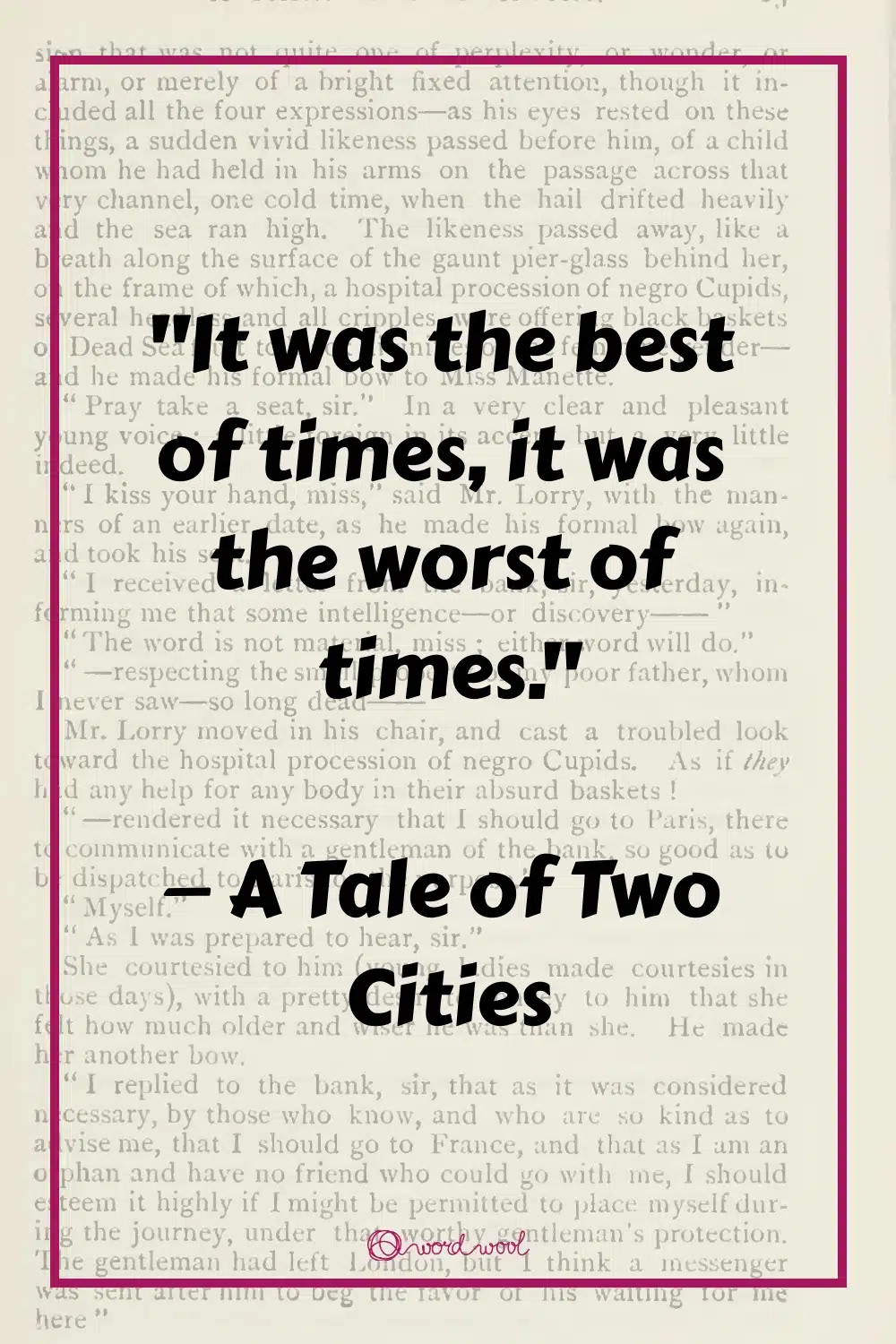Here are the 73 best handpicked quotes from “A Tale of Two Cities” by Charles Dickens:
From “Of little worth as life is when we misuse it, it is worth that effort. It would cost nothing to lay down if it were not.” to “It was the best of times, it was the worst of times.”
So if you want the best quotes from “A Tale of Two Cities,” then you’re in the right place.
Let’s jump right in!
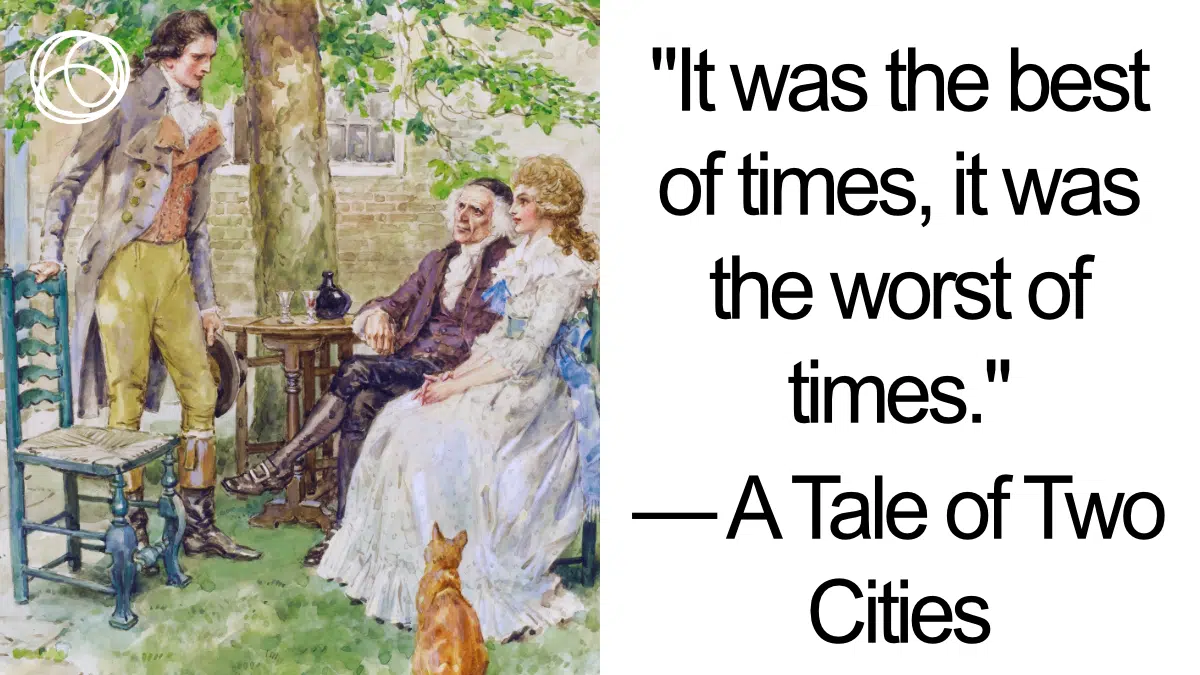
My Favorite “A Tale of Two Cities” Quote
#1
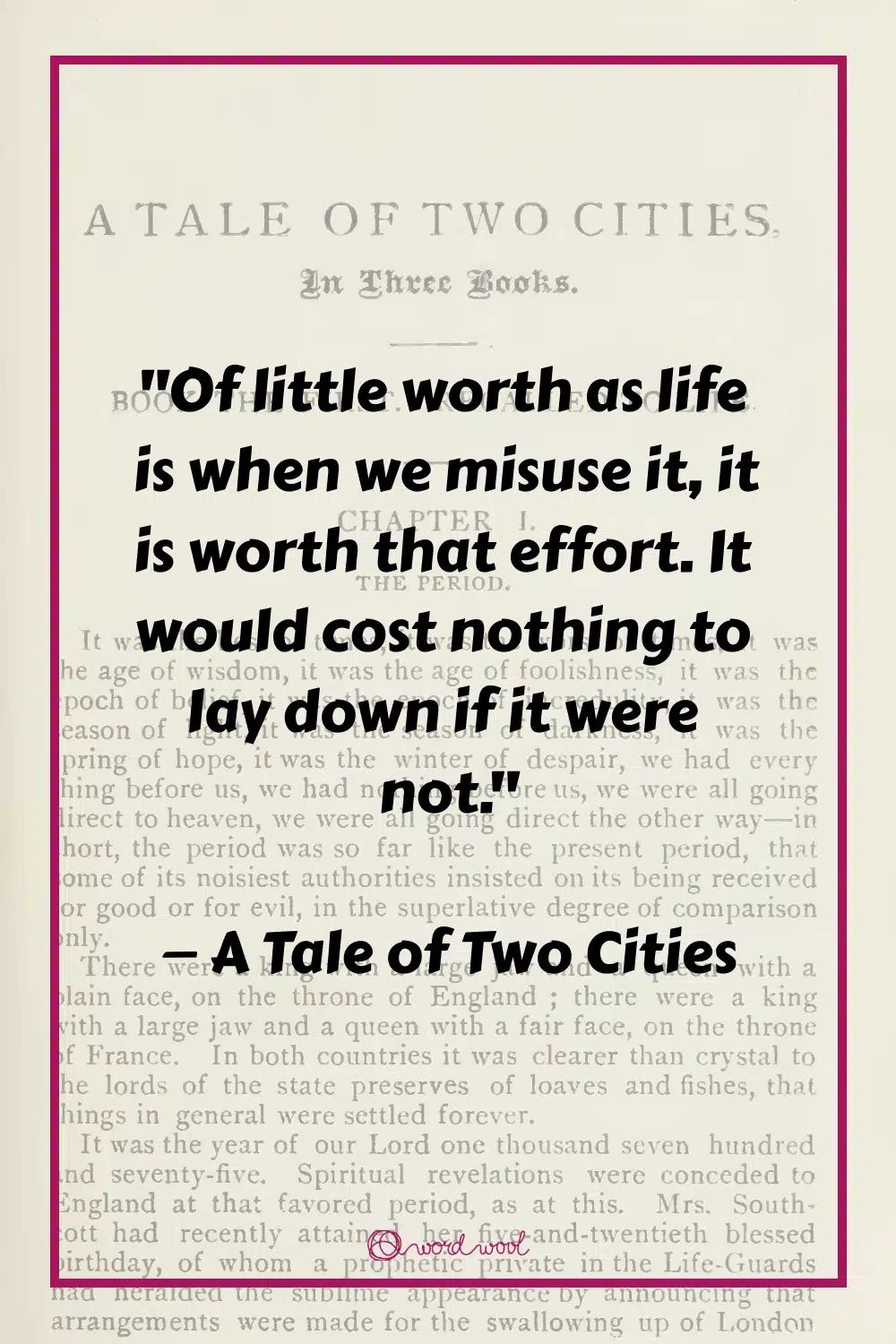
“Of little worth as life is when we misuse it, it is worth that effort. It would cost nothing to lay down if it were not.”
While our time on earth is limited, this quote highlights the importance of living our lives wisely through our words and actions.
No matter how short the time we may have left, it’s still worth living as long as we strive to live a life that is full of purpose and good intentions.
Ultimately, this quote suggests that we should cherish and make the most of our lives because even if it takes a lot to live a meaningful life, not showing effort to live a purposeful life already diminishes its worth.
Best Handpicked Quotes From “A Tale of Two Cities” by Charles Dickens
#2
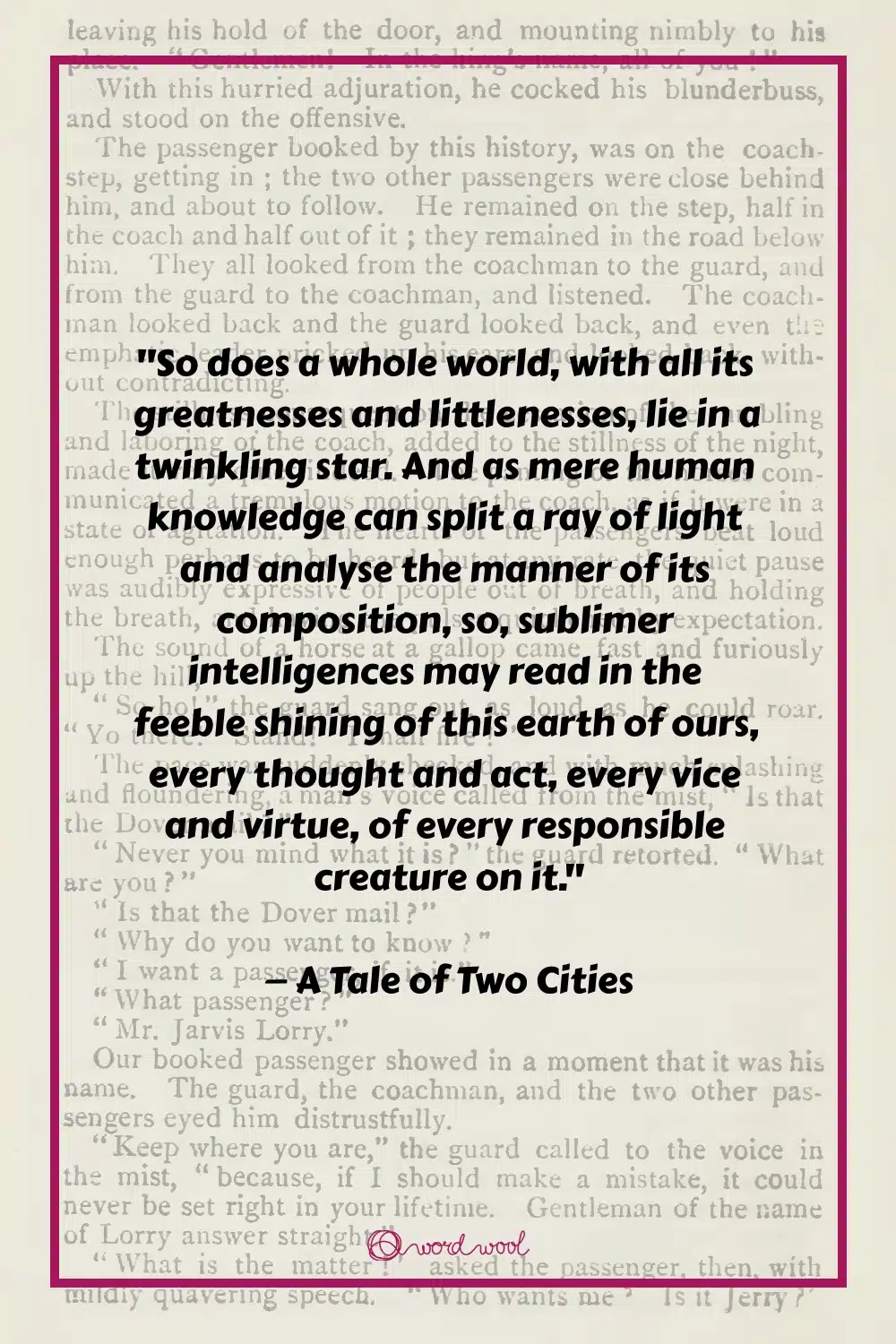
“So does a whole world, with all its greatnesses and littlenesses, lie in a twinkling star. And as mere human knowledge can split a ray of light and analyse the manner of its composition, so, sublimer intelligences may read in the feeble shining of this earth of ours, every thought and act, every vice and virtue, of every responsible creature on it.”
— A Tale of Two Cities
#3
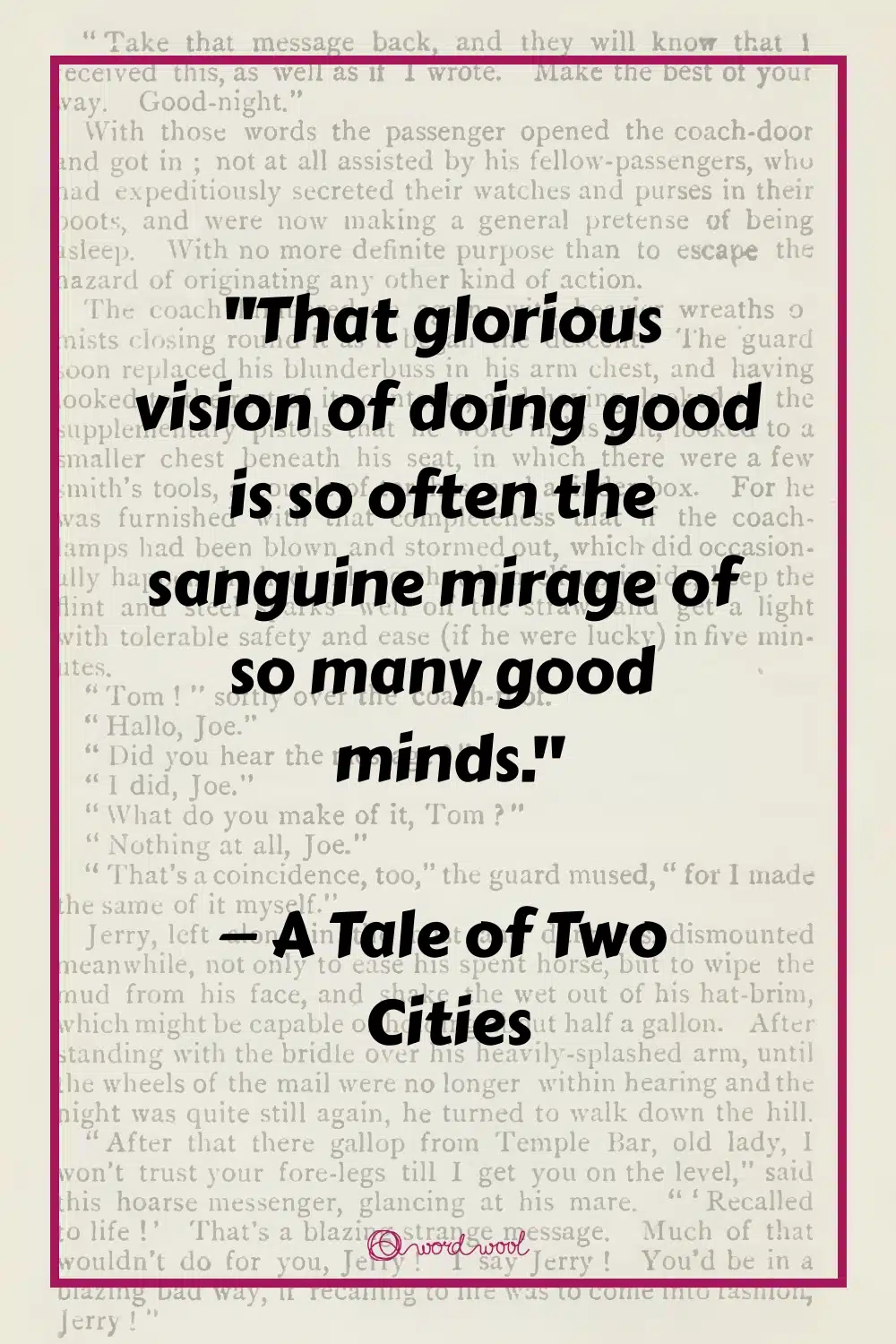
“That glorious vision of doing good is so often the sanguine mirage of so many good minds.”
— A Tale of Two Cities
#4
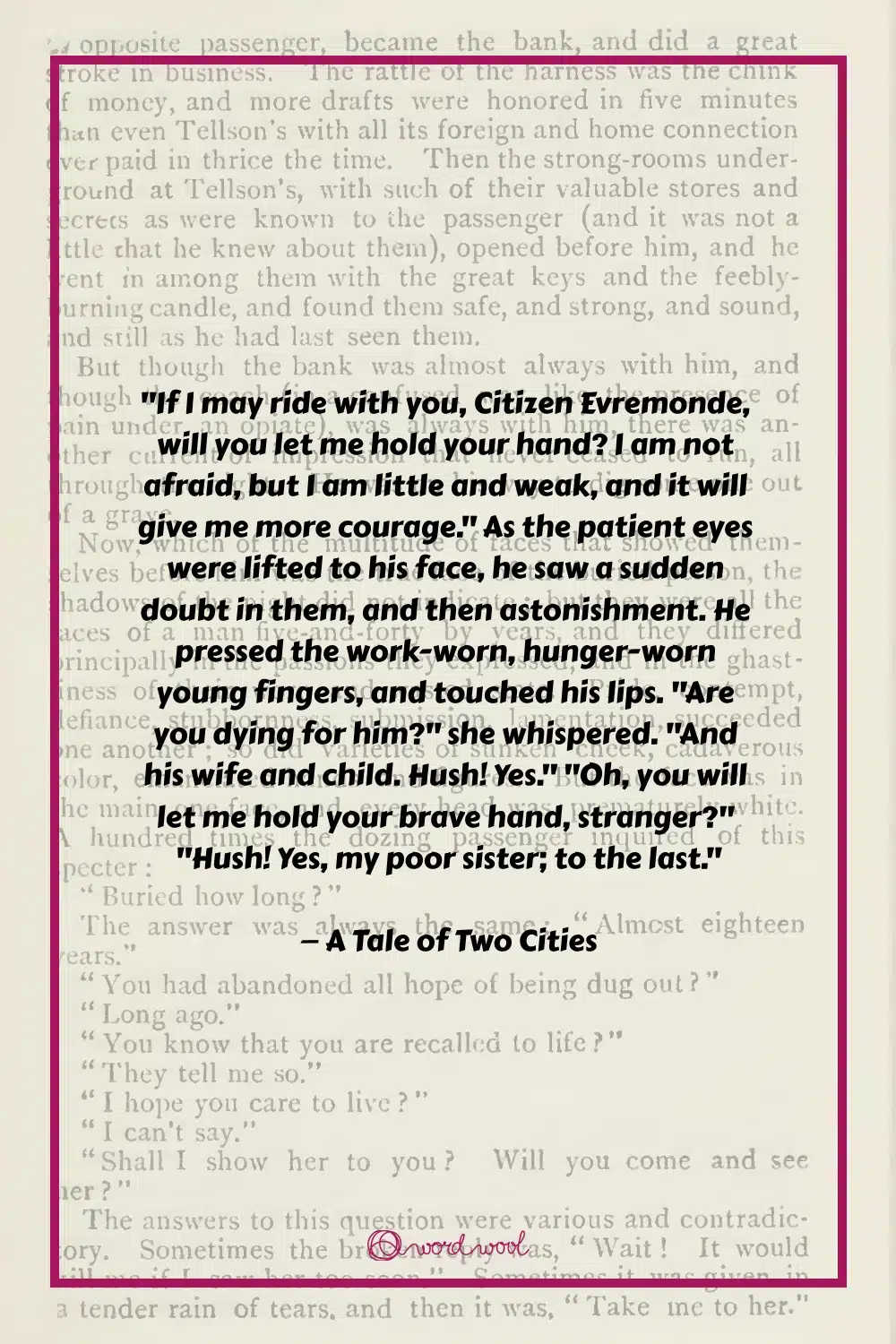
“If I may ride with you, Citizen Evremonde, will you let me hold your hand? I am not afraid, but I am little and weak, and it will give me more courage.” As the patient eyes were lifted to his face, he saw a sudden doubt in them, and then astonishment. He pressed the work-worn, hunger-worn young fingers, and touched his lips. “Are you dying for him?” she whispered. “And his wife and child. Hush! Yes.” “Oh, you will let me hold your brave hand, stranger?” “Hush! Yes, my poor sister; to the last.”
— A Tale of Two Cities
#5
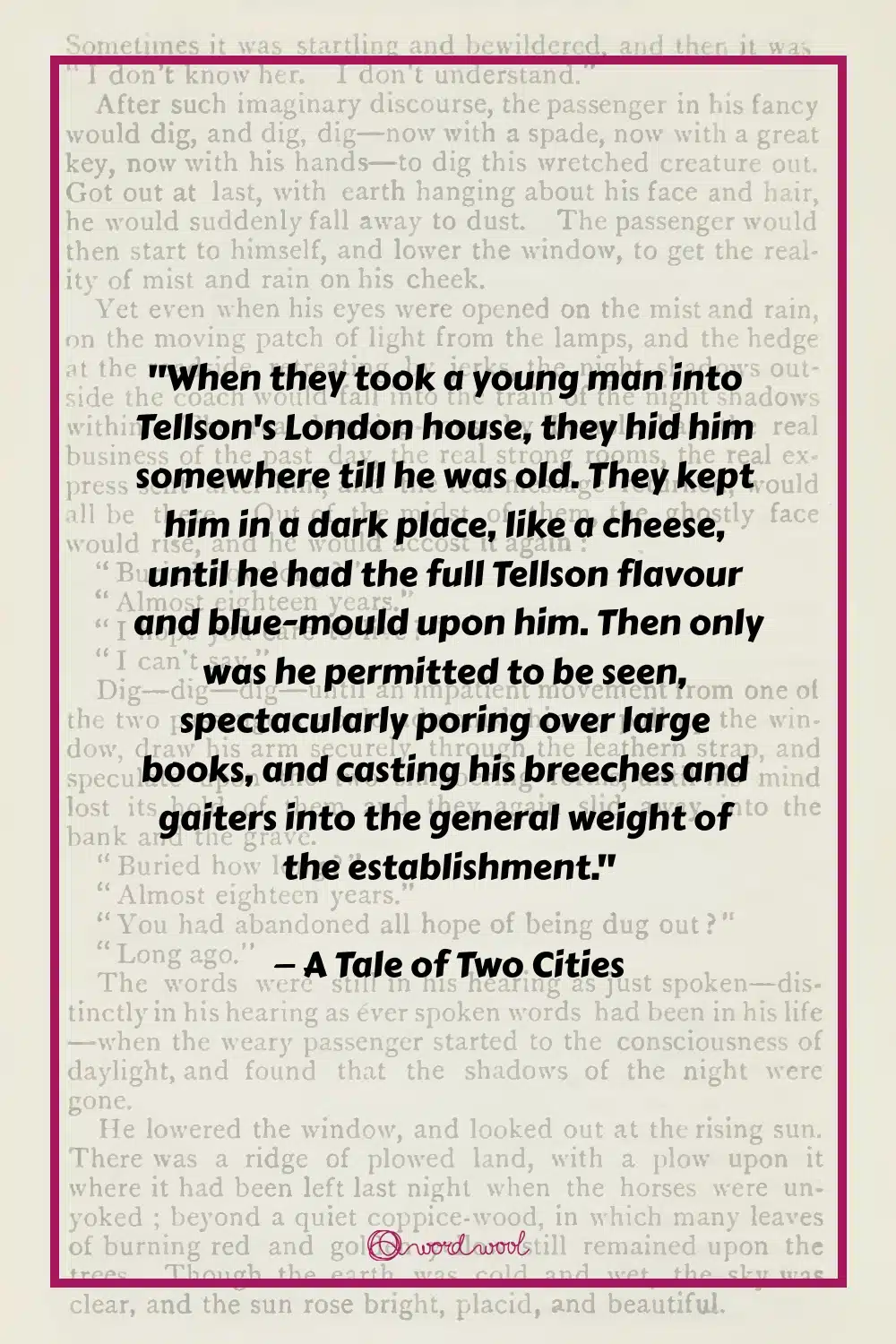
“When they took a young man into Tellson’s London house, they hid him somewhere till he was old. They kept him in a dark place, like a cheese, until he had the full Tellson flavour and blue-mould upon him. Then only was he permitted to be seen, spectacularly poring over large books, and casting his breeches and gaiters into the general weight of the establishment.”
— A Tale of Two Cities
#6
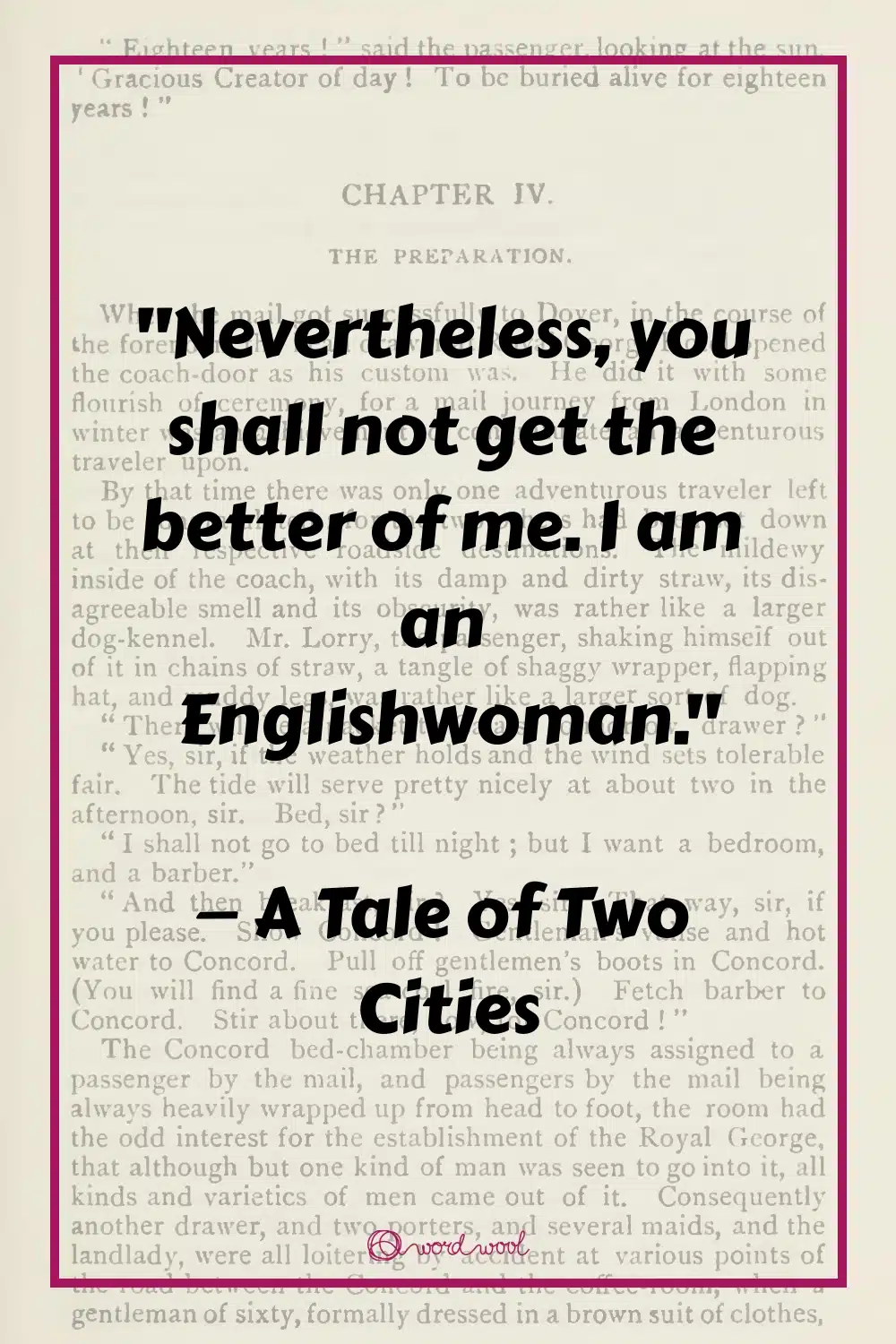
“Nevertheless, you shall not get the better of me. I am an Englishwoman.”
— A Tale of Two Cities
#7
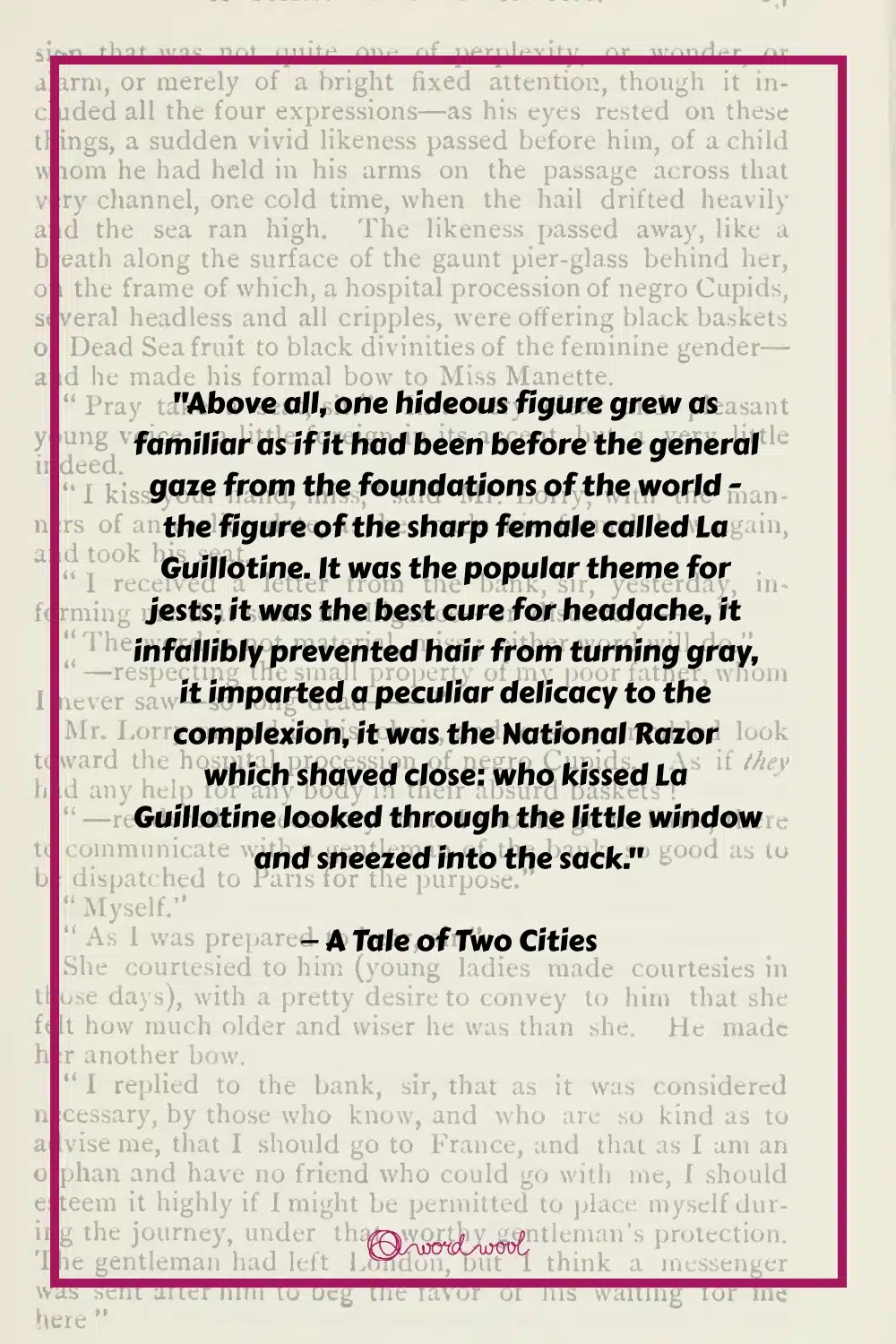
“Above all, one hideous figure grew as familiar as if it had been before the general gaze from the foundations of the world – the figure of the sharp female called La Guillotine. It was the popular theme for jests; it was the best cure for headache, it infallibly prevented hair from turning gray, it imparted a peculiar delicacy to the complexion, it was the National Razor which shaved close: who kissed La Guillotine looked through the little window and sneezed into the sack.”
— A Tale of Two Cities
#8
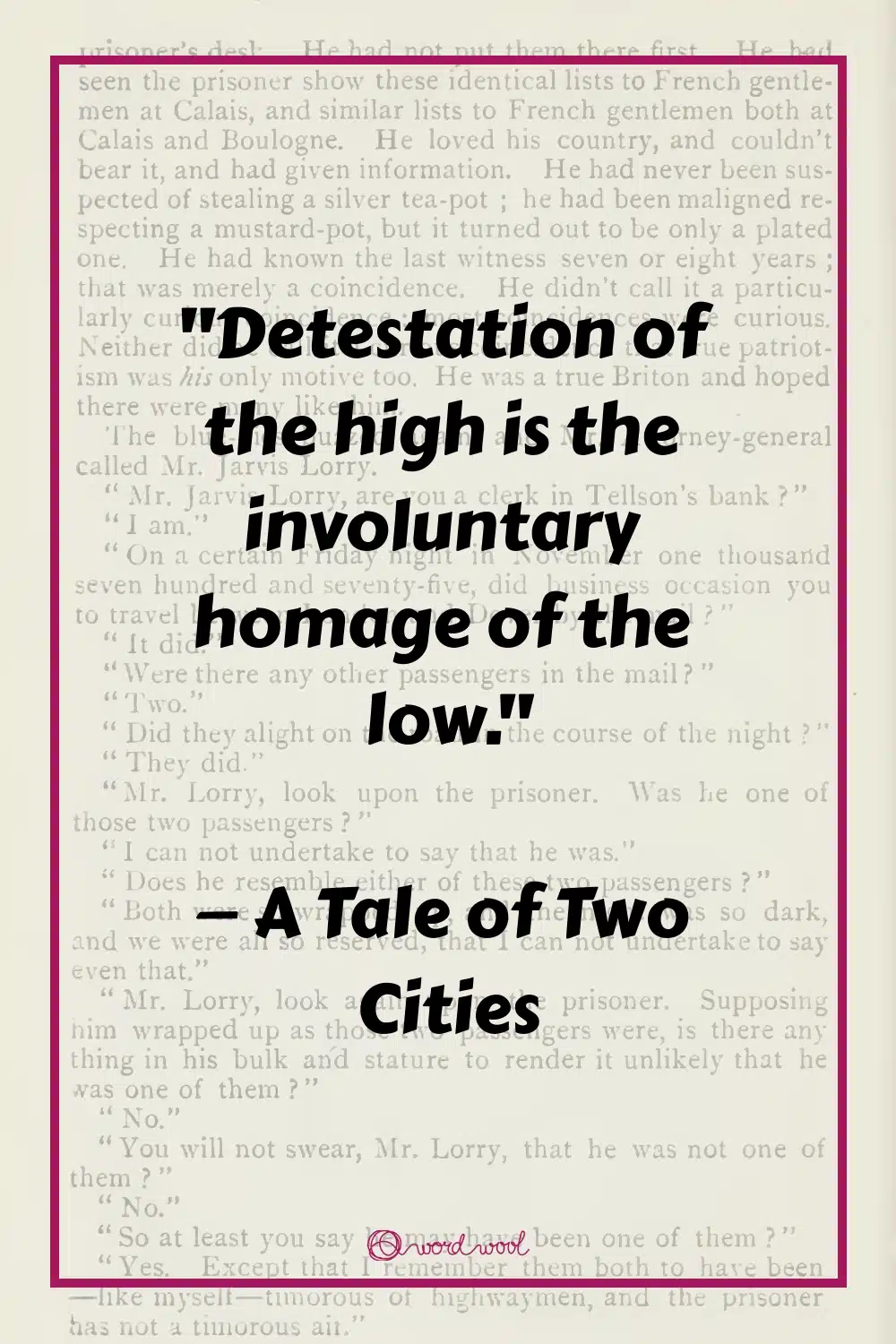
“Detestation of the high is the involuntary homage of the low.”
— A Tale of Two Cities
#9
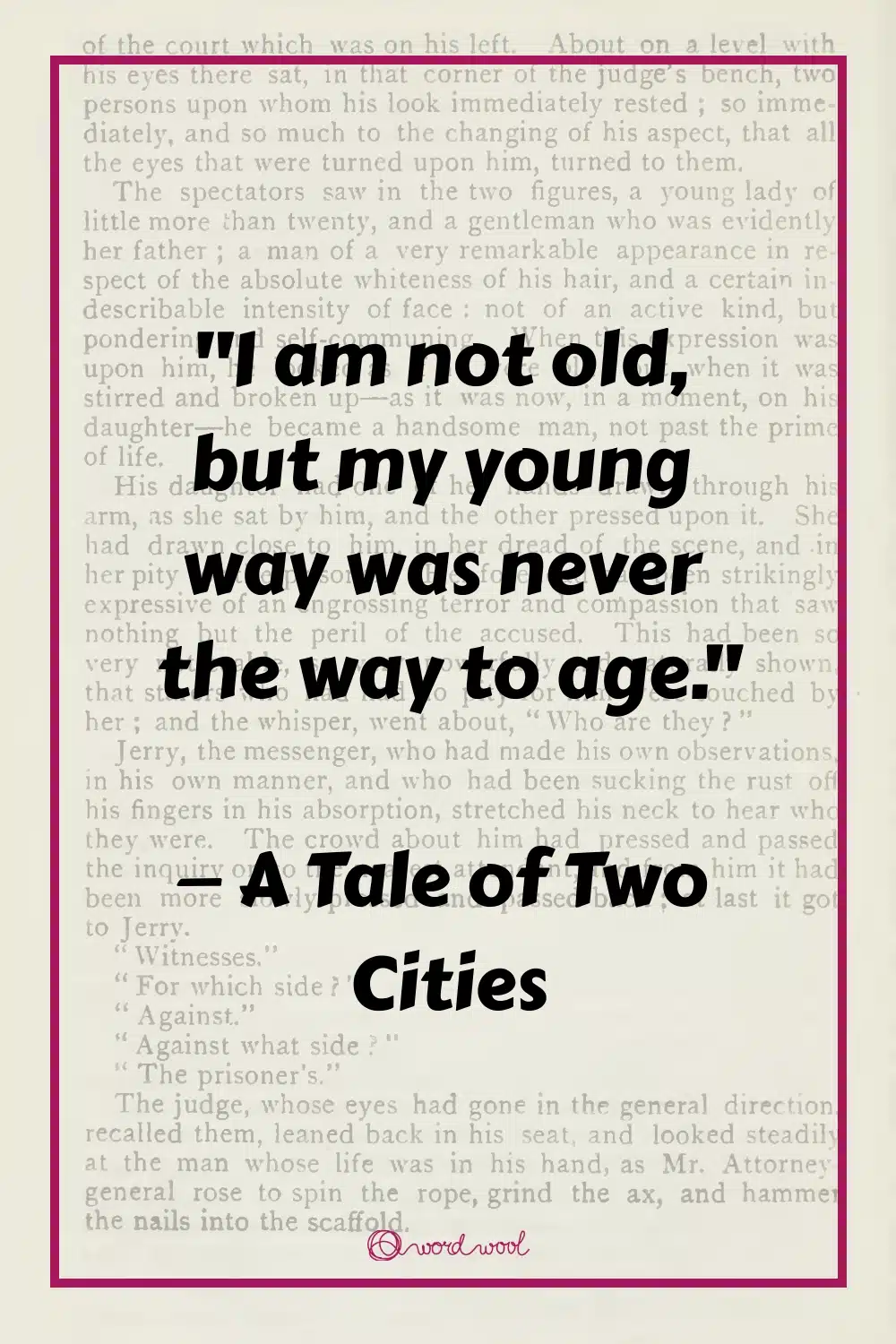
“I am not old, but my young way was never the way to age.”
— A Tale of Two Cities
#10
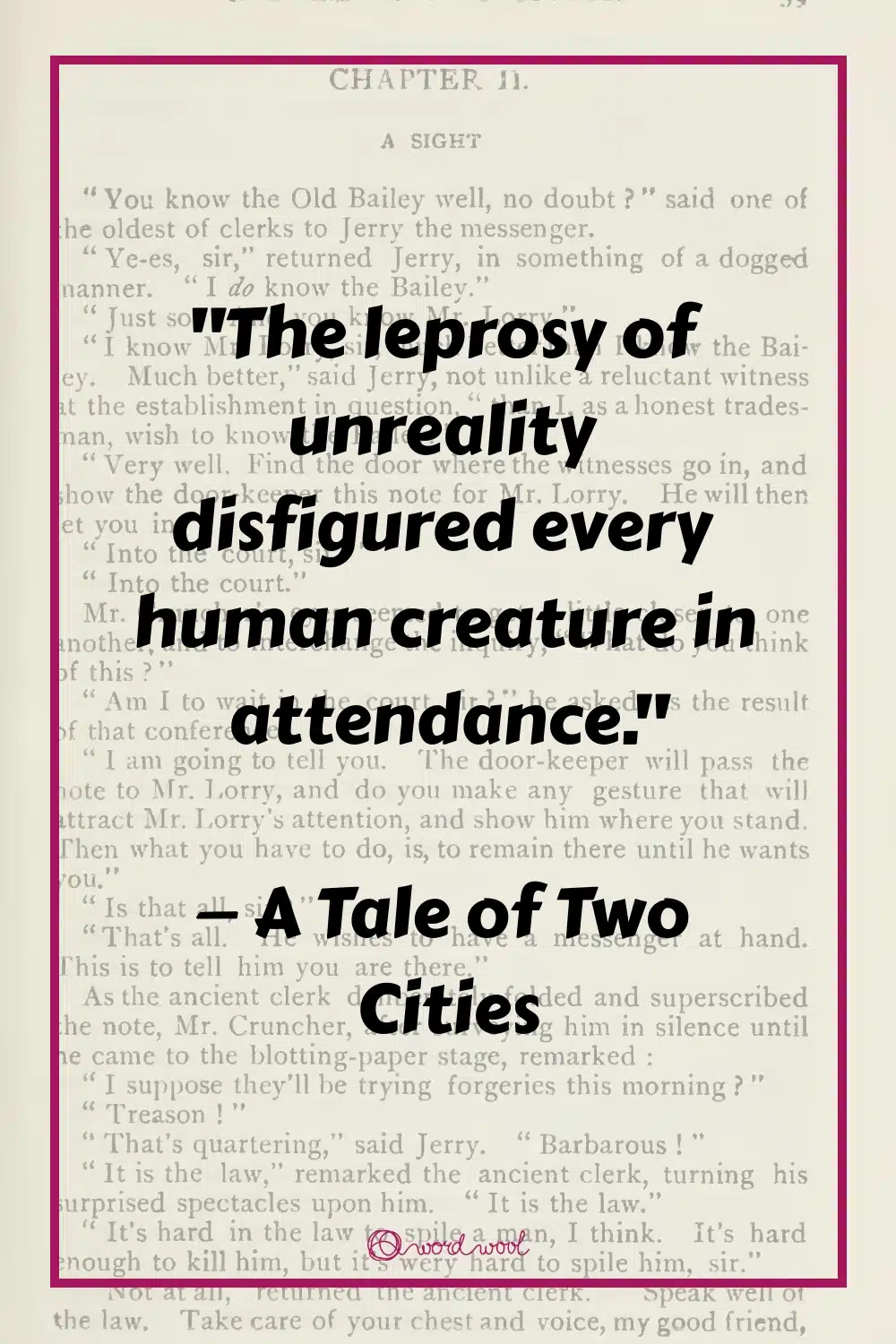
“The leprosy of unreality disfigured every human creature in attendance.”
— A Tale of Two Cities
#11
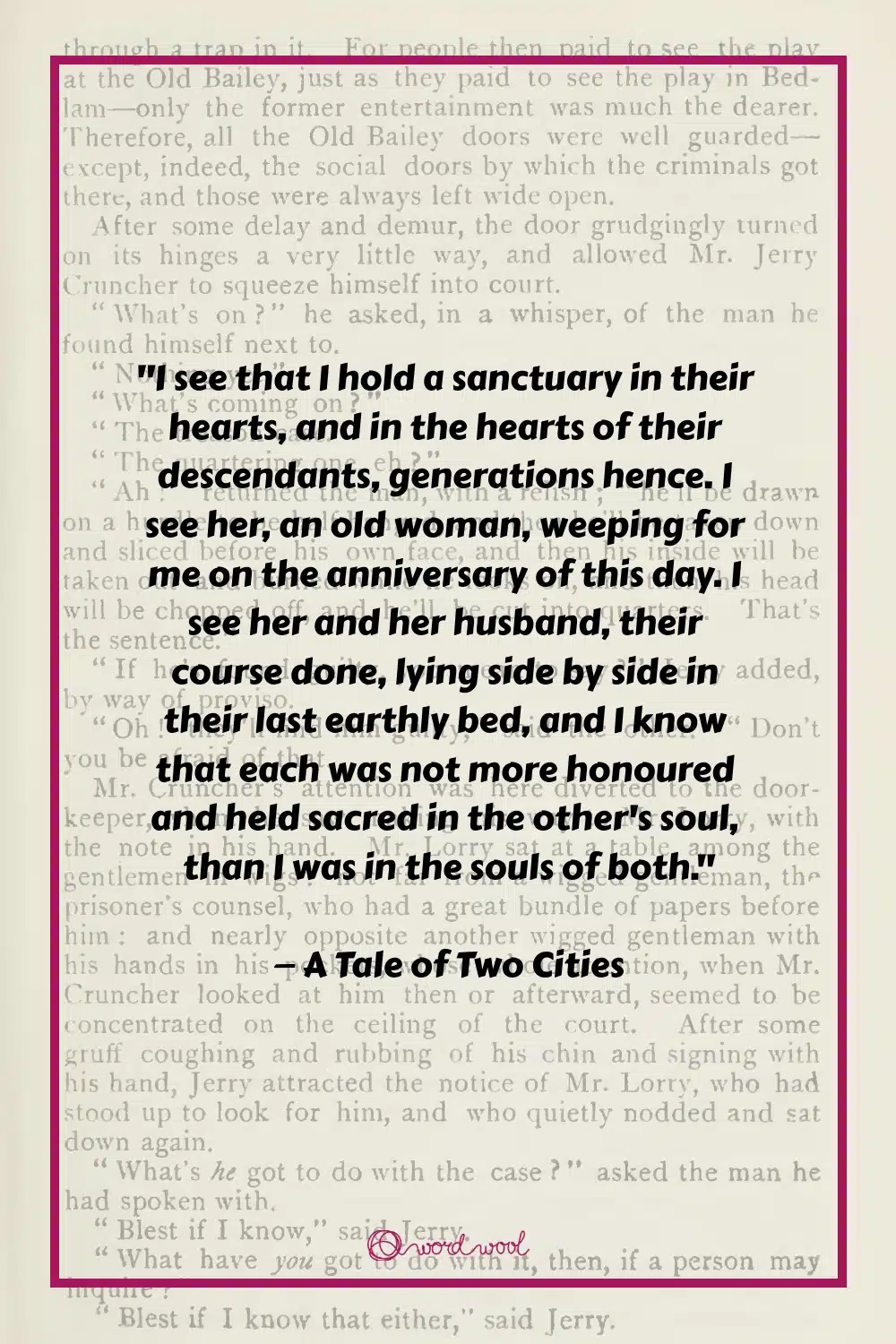
“I see that I hold a sanctuary in their hearts, and in the hearts of their descendants, generations hence. I see her, an old woman, weeping for me on the anniversary of this day. I see her and her husband, their course done, lying side by side in their last earthly bed, and I know that each was not more honoured and held sacred in the other’s soul, than I was in the souls of both.”
— A Tale of Two Cities
#12
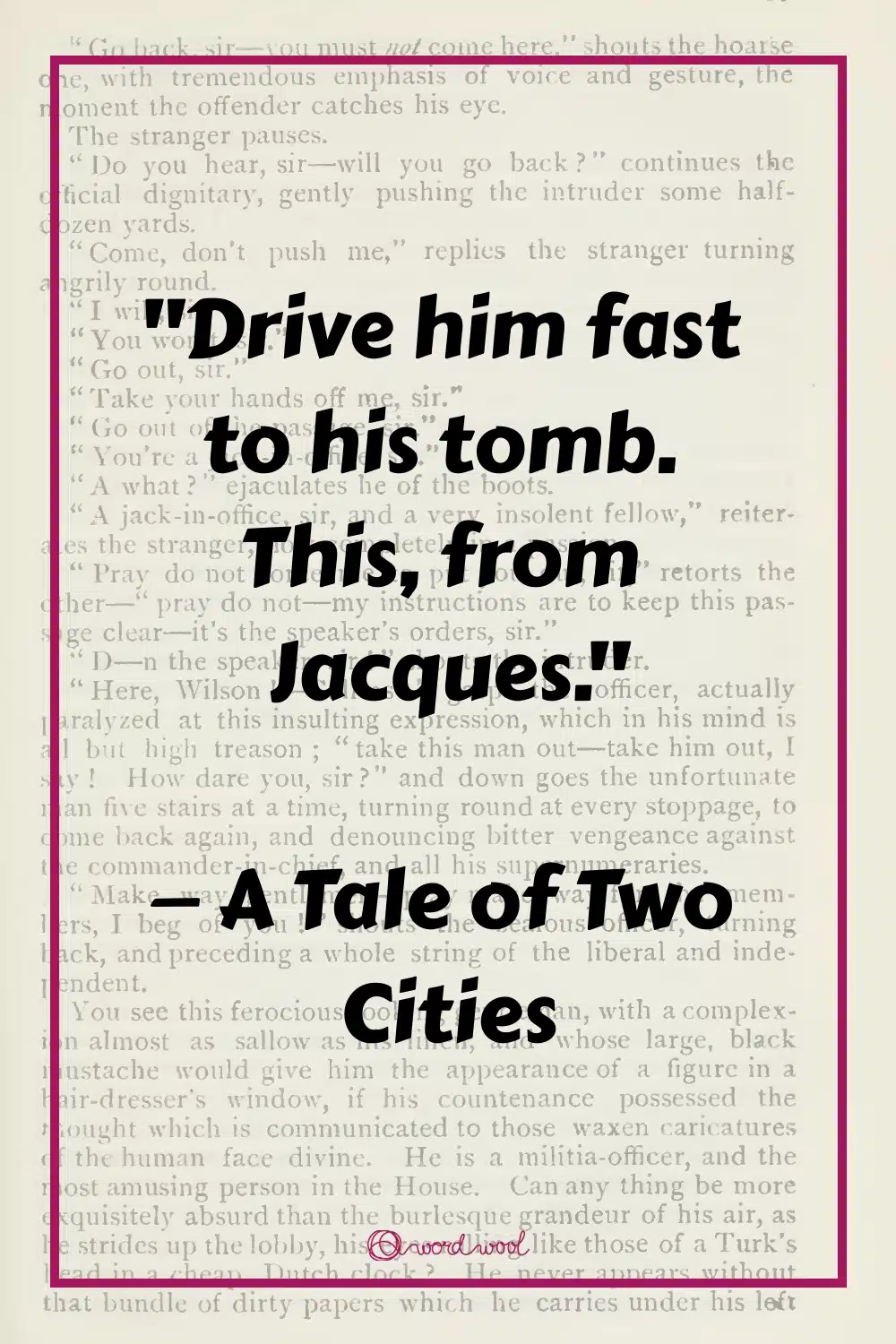
“Drive him fast to his tomb. This, from Jacques.”
— A Tale of Two Cities
#13
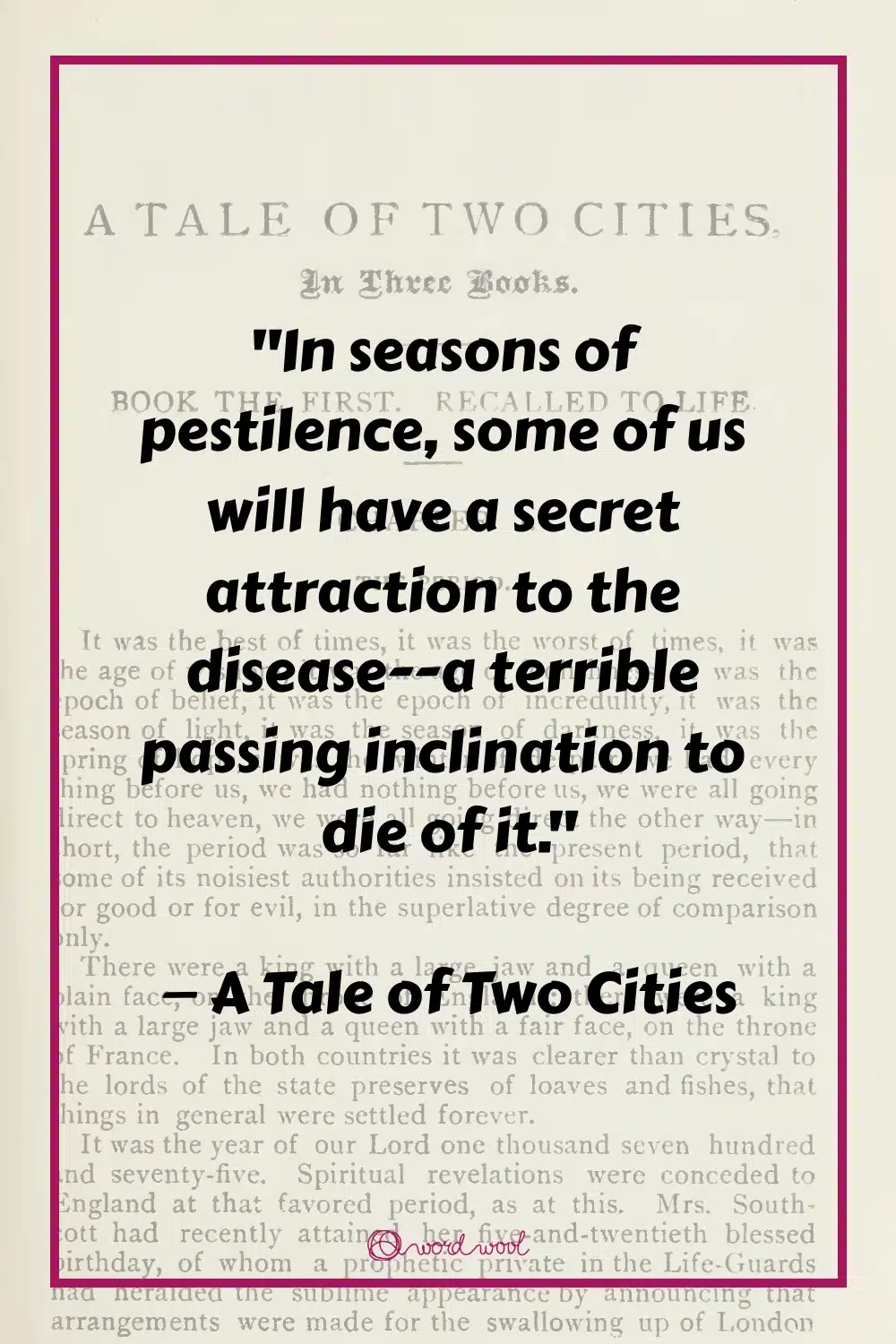
“In seasons of pestilence, some of us will have a secret attraction to the disease–a terrible passing inclination to die of it.”
— A Tale of Two Cities
#14
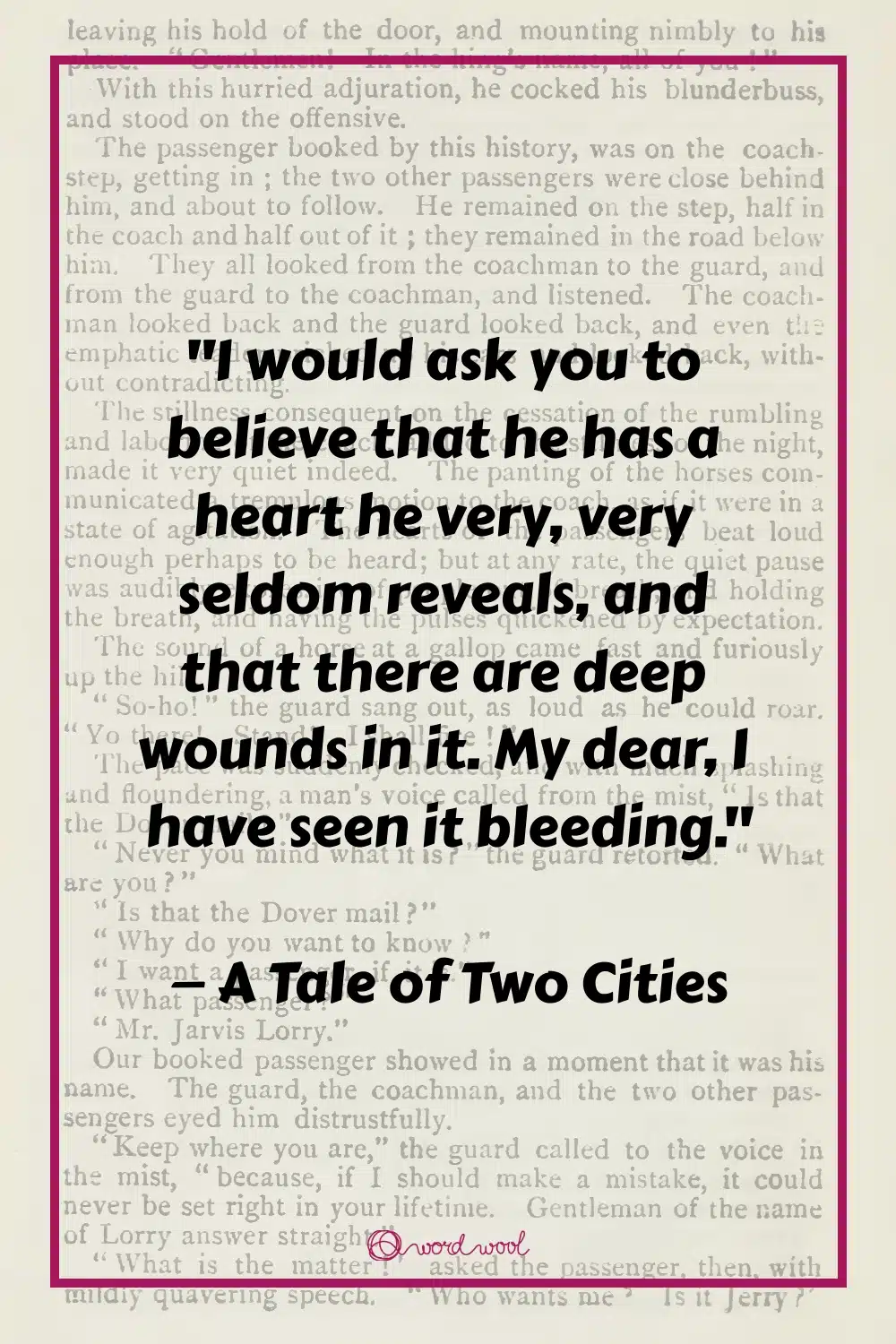
“I would ask you to believe that he has a heart he very, very seldom reveals, and that there are deep wounds in it. My dear, I have seen it bleeding.”
— A Tale of Two Cities
#15
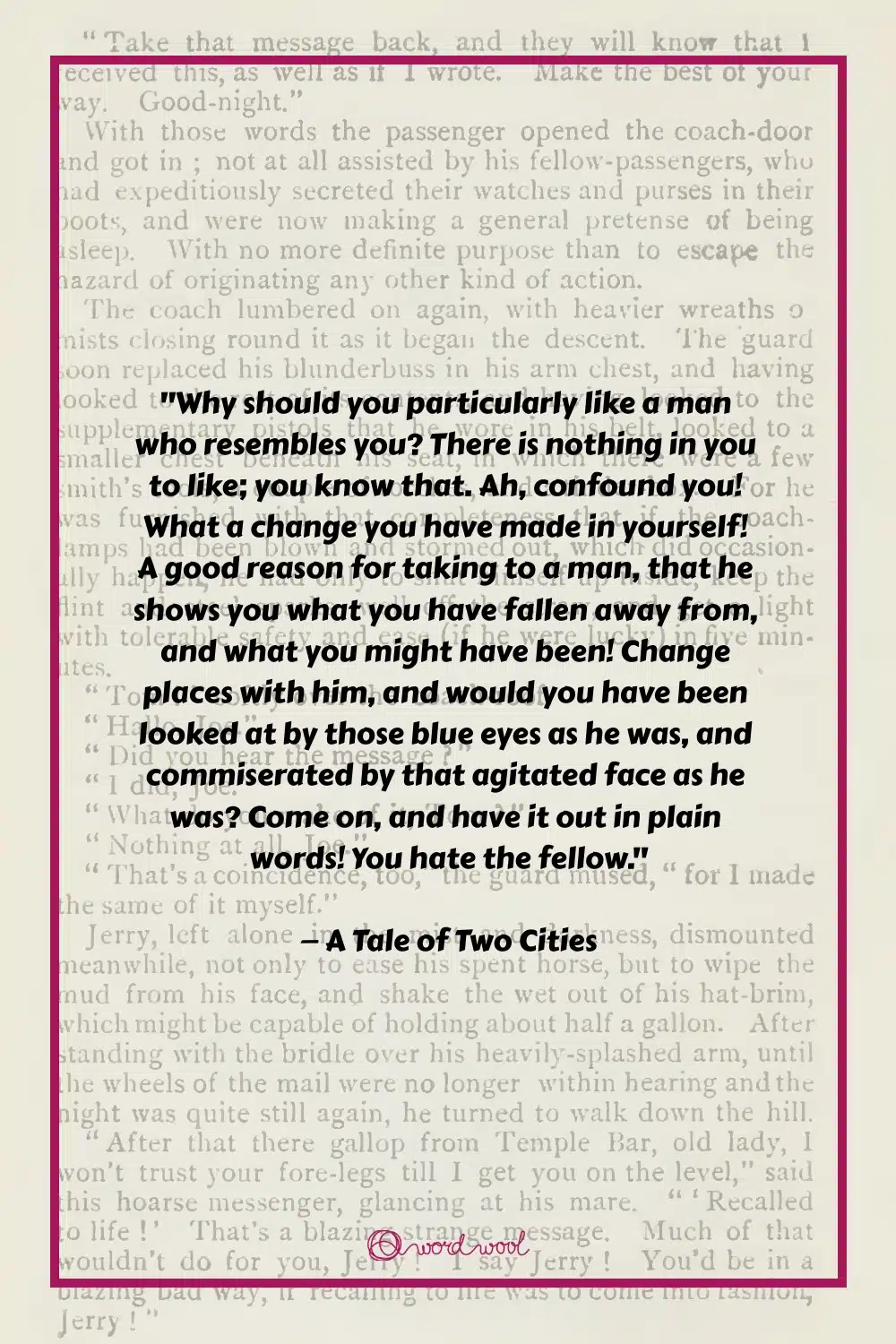
“Why should you particularly like a man who resembles you? There is nothing in you to like; you know that. Ah, confound you! What a change you have made in yourself! A good reason for taking to a man, that he shows you what you have fallen away from, and what you might have been! Change places with him, and would you have been looked at by those blue eyes as he was, and commiserated by that agitated face as he was? Come on, and have it out in plain words! You hate the fellow.”
— A Tale of Two Cities
#16
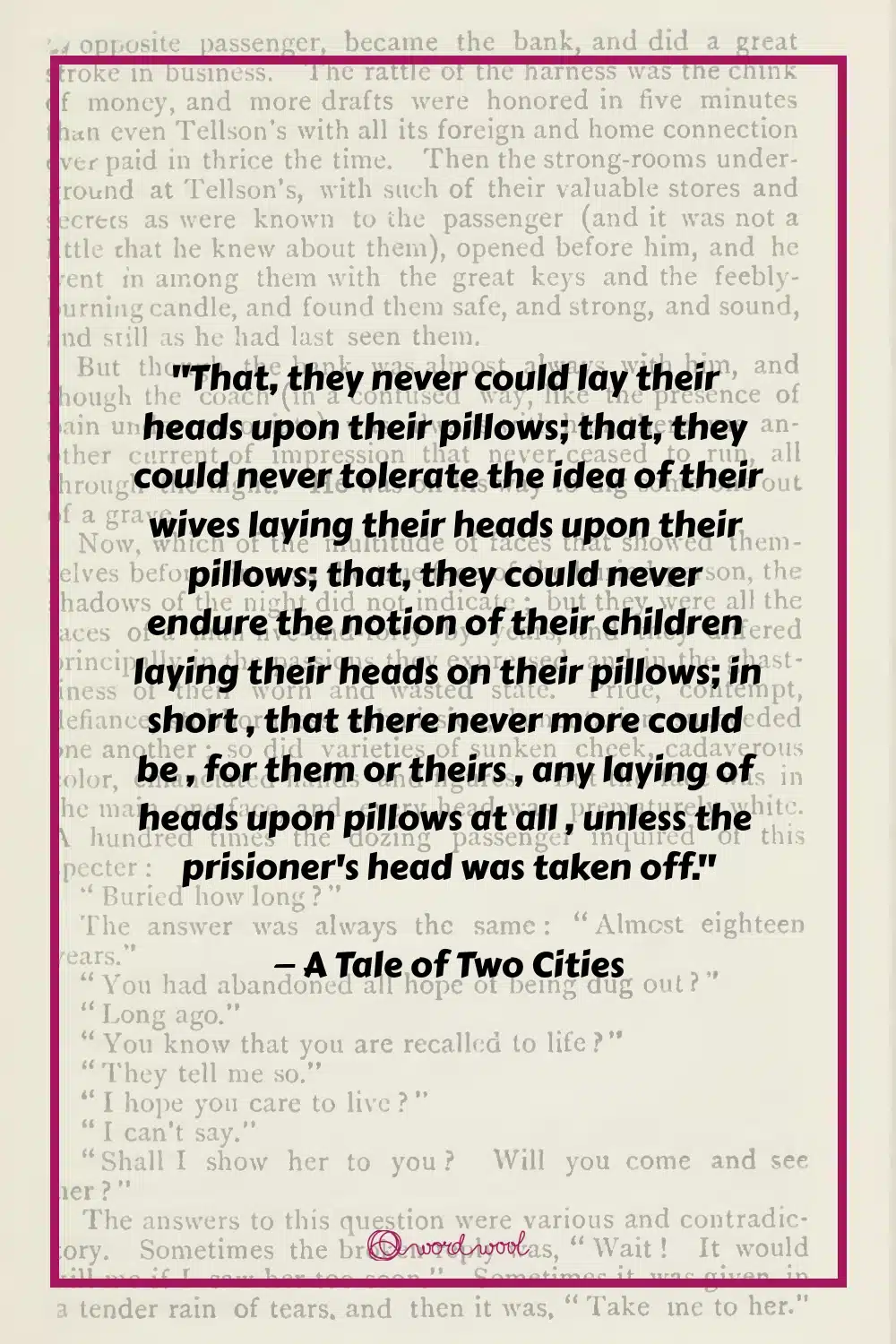
“That, they never could lay their heads upon their pillows; that, they could never tolerate the idea of their wives laying their heads upon their pillows; that, they could never endure the notion of their children laying their heads on their pillows; in short , that there never more could be , for them or theirs , any laying of heads upon pillows at all , unless the prisioner’s head was taken off.”
— A Tale of Two Cities
#17
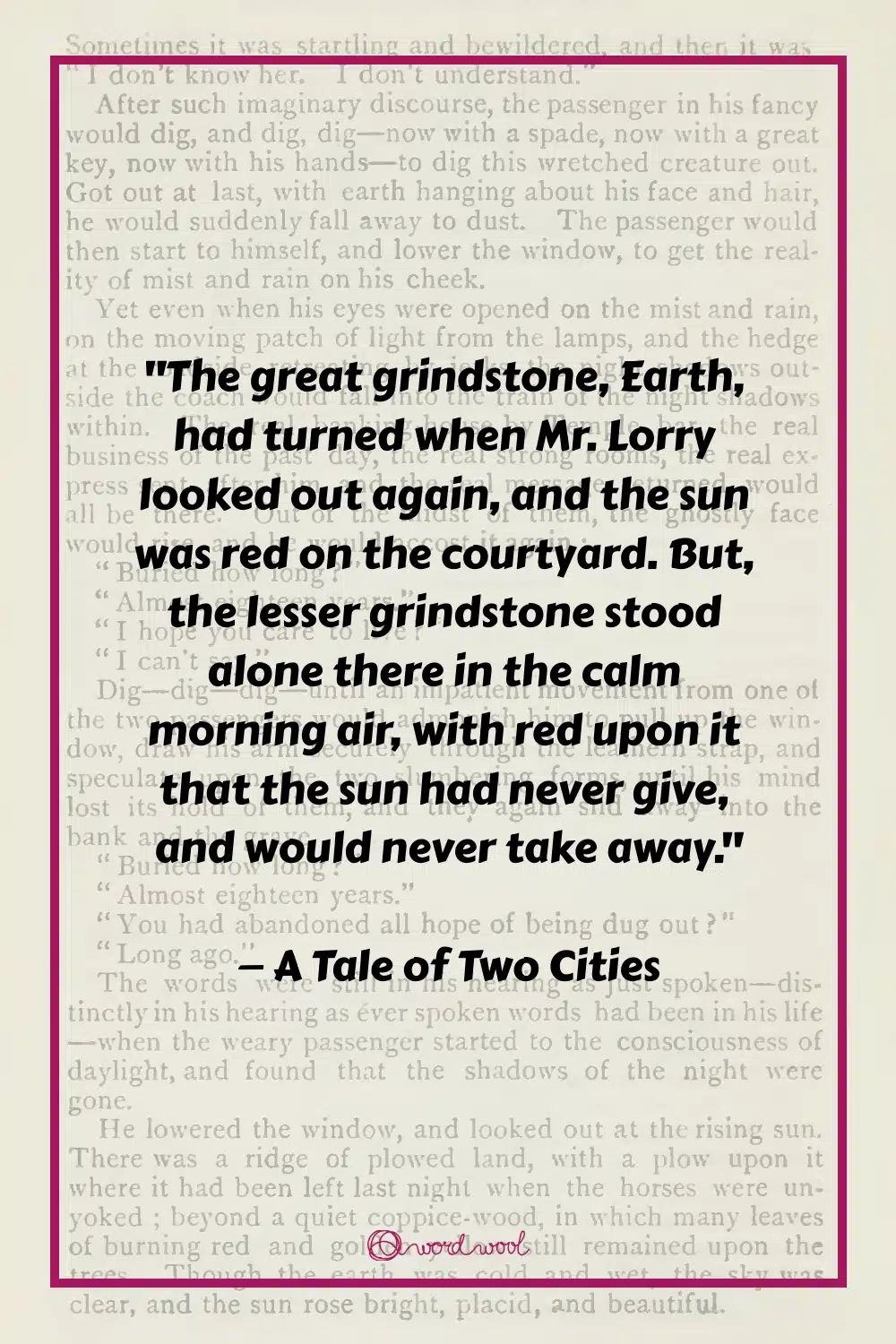
“The great grindstone, Earth, had turned when Mr. Lorry looked out again, and the sun was red on the courtyard. But, the lesser grindstone stood alone there in the calm morning air, with red upon it that the sun had never give, and would never take away.”
— A Tale of Two Cities
#18
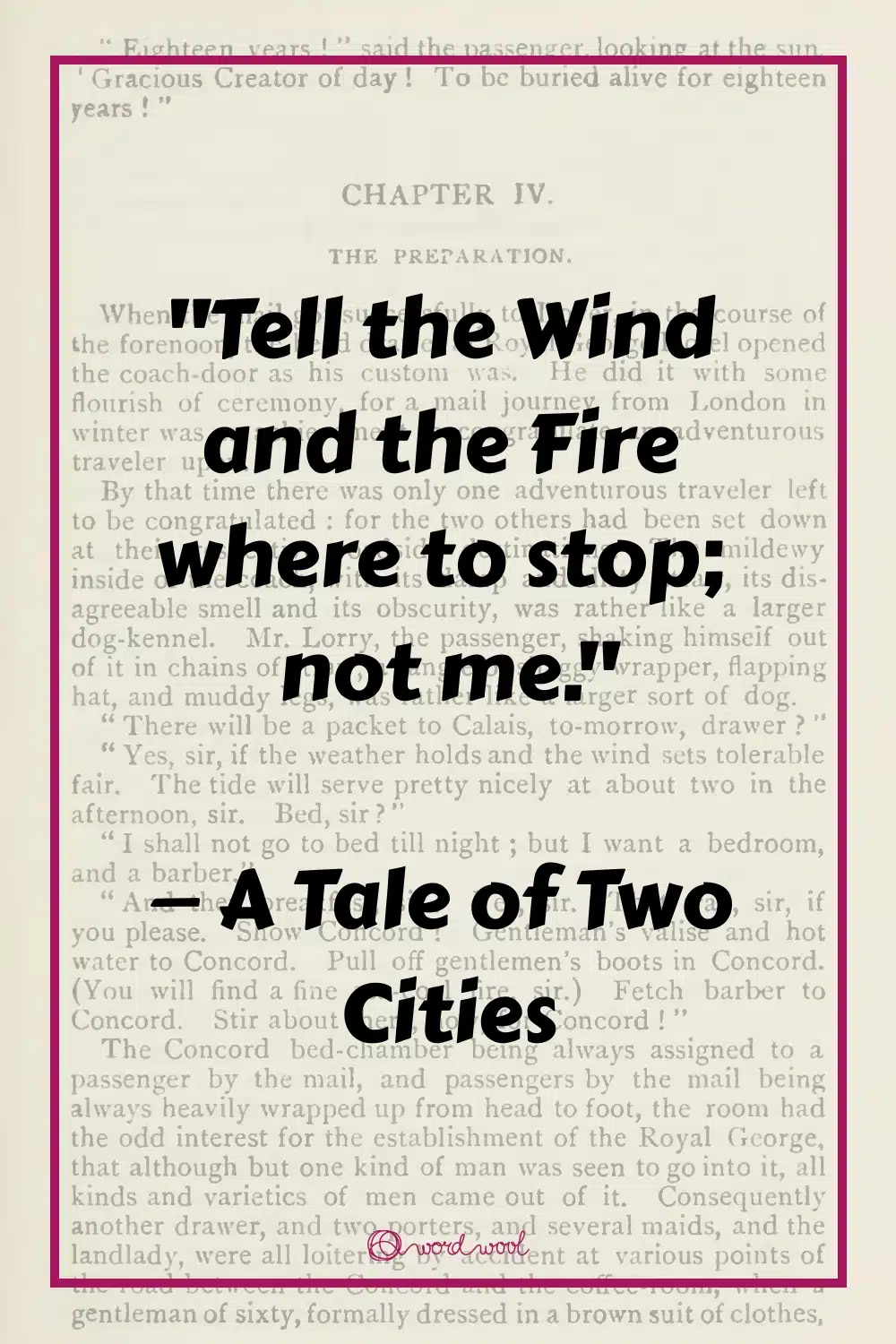
“Tell the Wind and the Fire where to stop; not me.”
— A Tale of Two Cities
#19
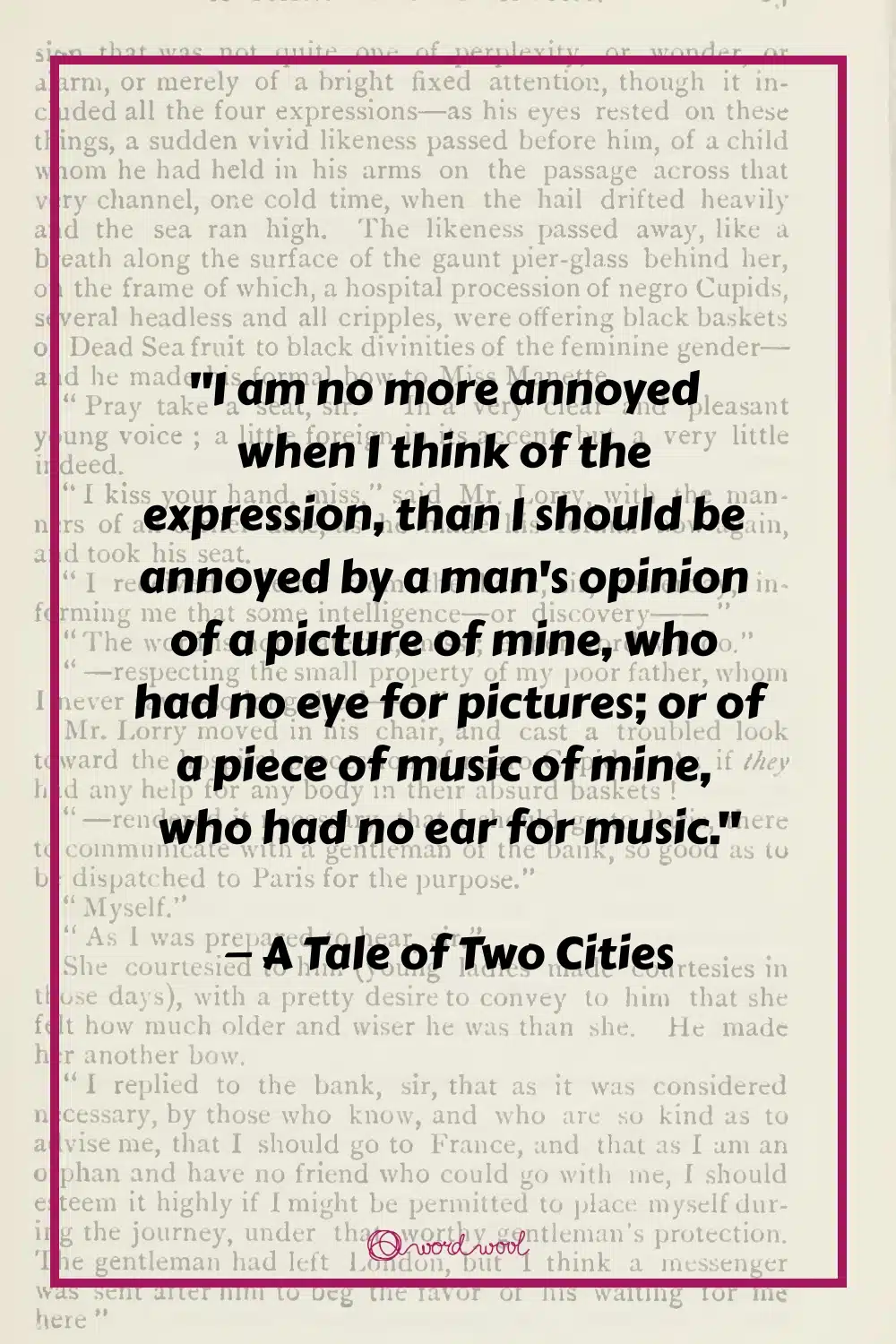
“I am no more annoyed when I think of the expression, than I should be annoyed by a man’s opinion of a picture of mine, who had no eye for pictures; or of a piece of music of mine, who had no ear for music.”
— A Tale of Two Cities
#20
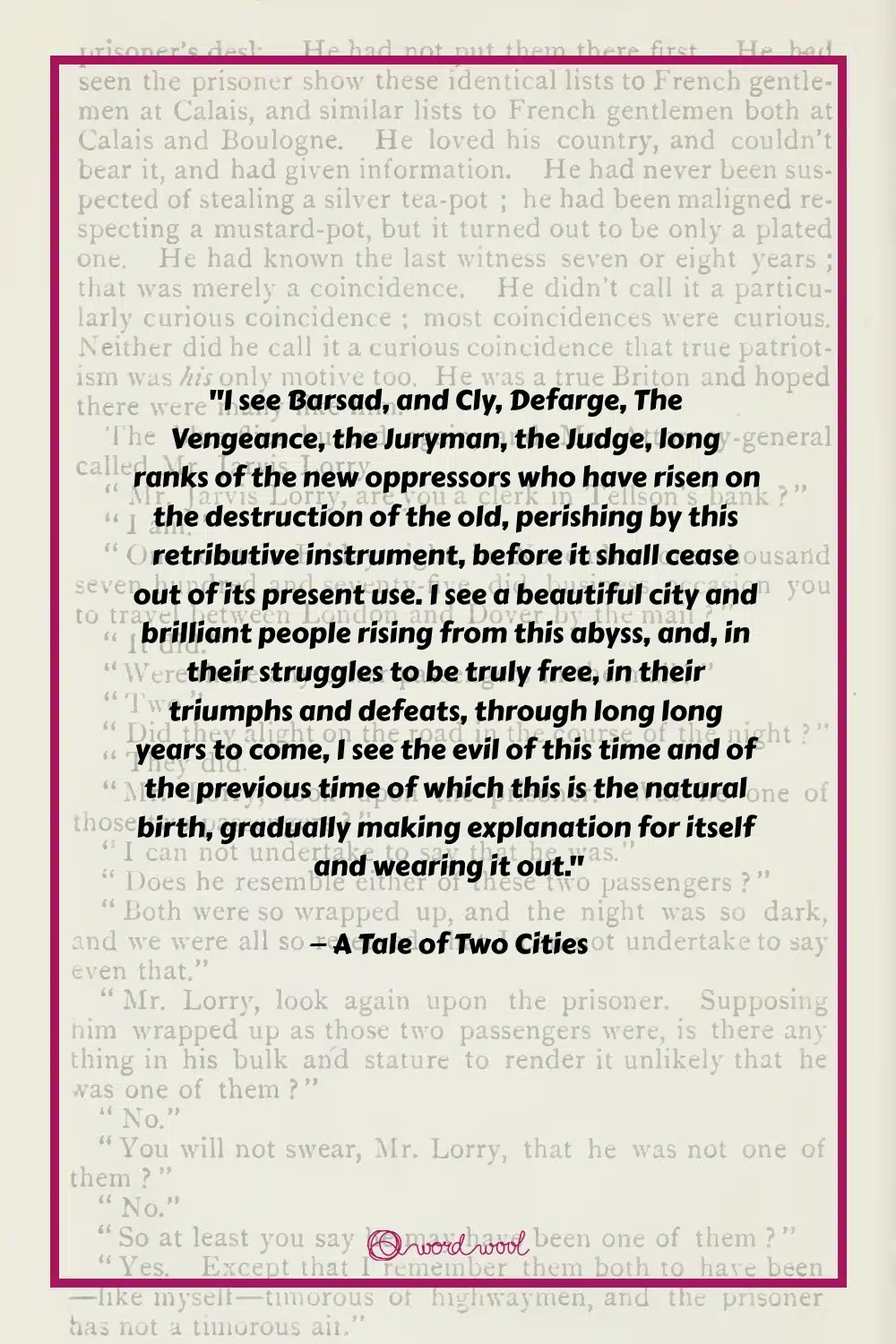
“I see Barsad, and Cly, Defarge, The Vengeance, the Juryman, the Judge, long ranks of the new oppressors who have risen on the destruction of the old, perishing by this retributive instrument, before it shall cease out of its present use. I see a beautiful city and brilliant people rising from this abyss, and, in their struggles to be truly free, in their triumphs and defeats, through long long years to come, I see the evil of this time and of the previous time of which this is the natural birth, gradually making explanation for itself and wearing it out.”
— A Tale of Two Cities
#21
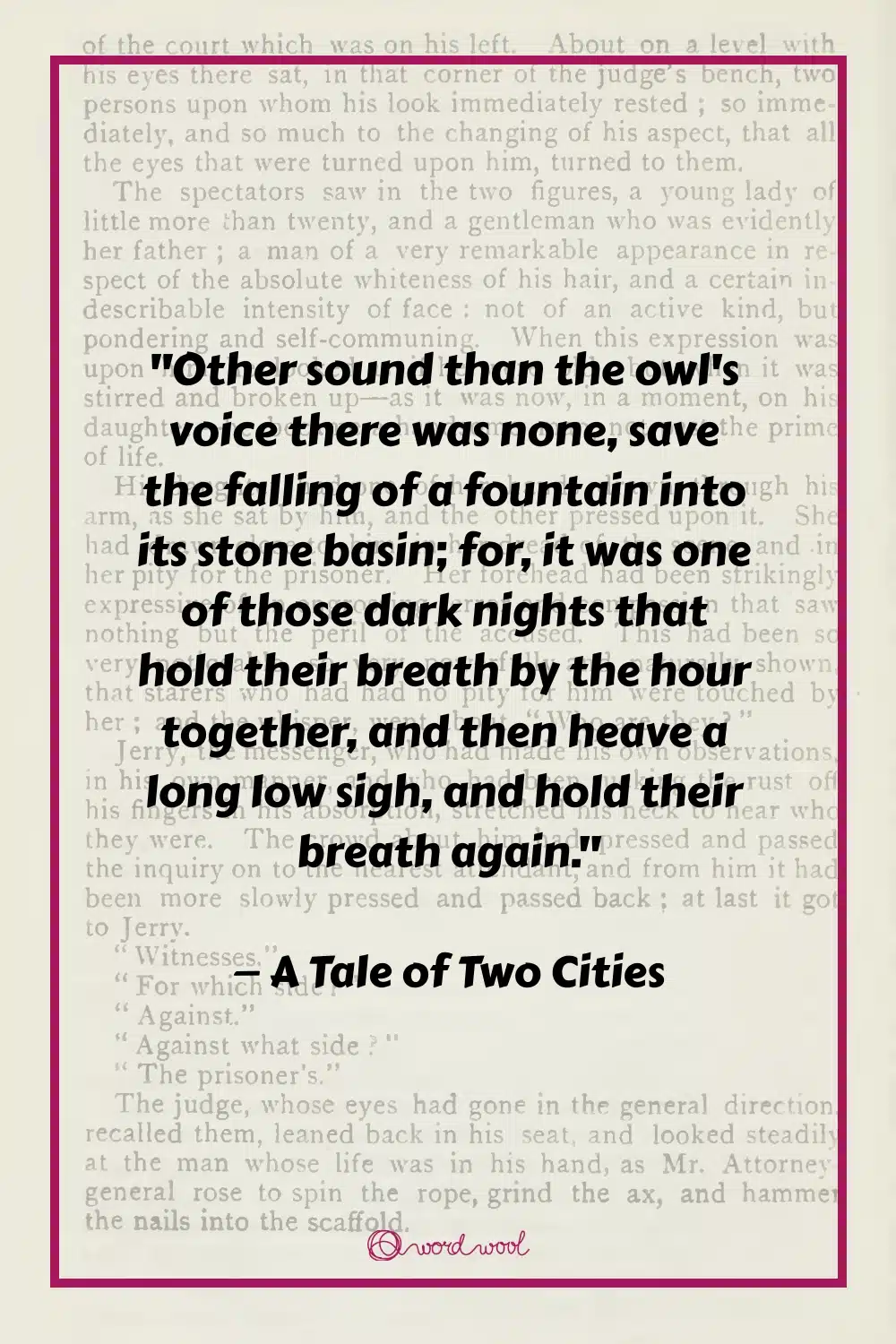
“Other sound than the owl’s voice there was none, save the falling of a fountain into its stone basin; for, it was one of those dark nights that hold their breath by the hour together, and then heave a long low sigh, and hold their breath again.”
— A Tale of Two Cities
#22
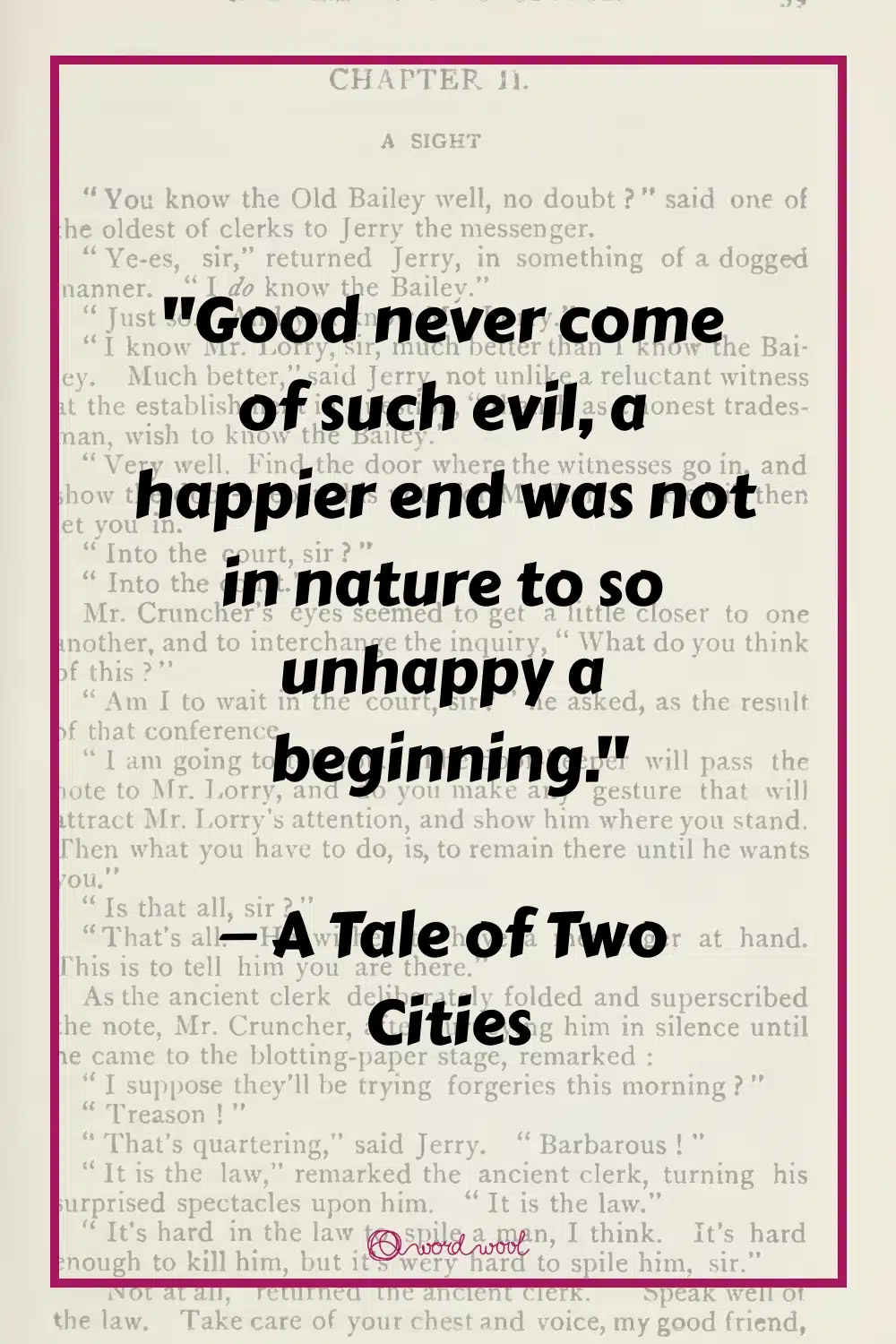
“Good never come of such evil, a happier end was not in nature to so unhappy a beginning.”
— A Tale of Two Cities
#23
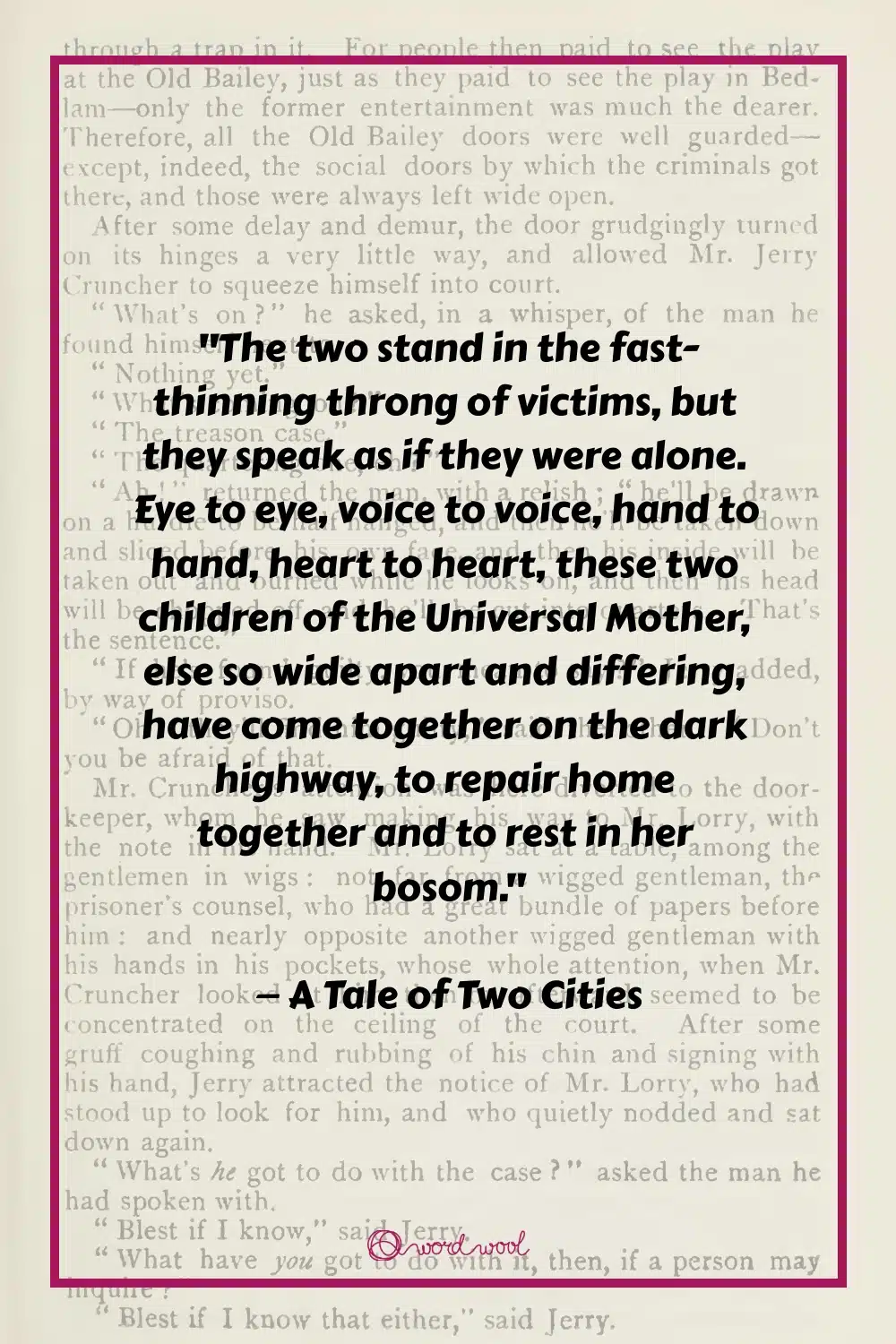
“The two stand in the fast-thinning throng of victims, but they speak as if they were alone. Eye to eye, voice to voice, hand to hand, heart to heart, these two children of the Universal Mother, else so wide apart and differing, have come together on the dark highway, to repair home together and to rest in her bosom.”
— A Tale of Two Cities
#24
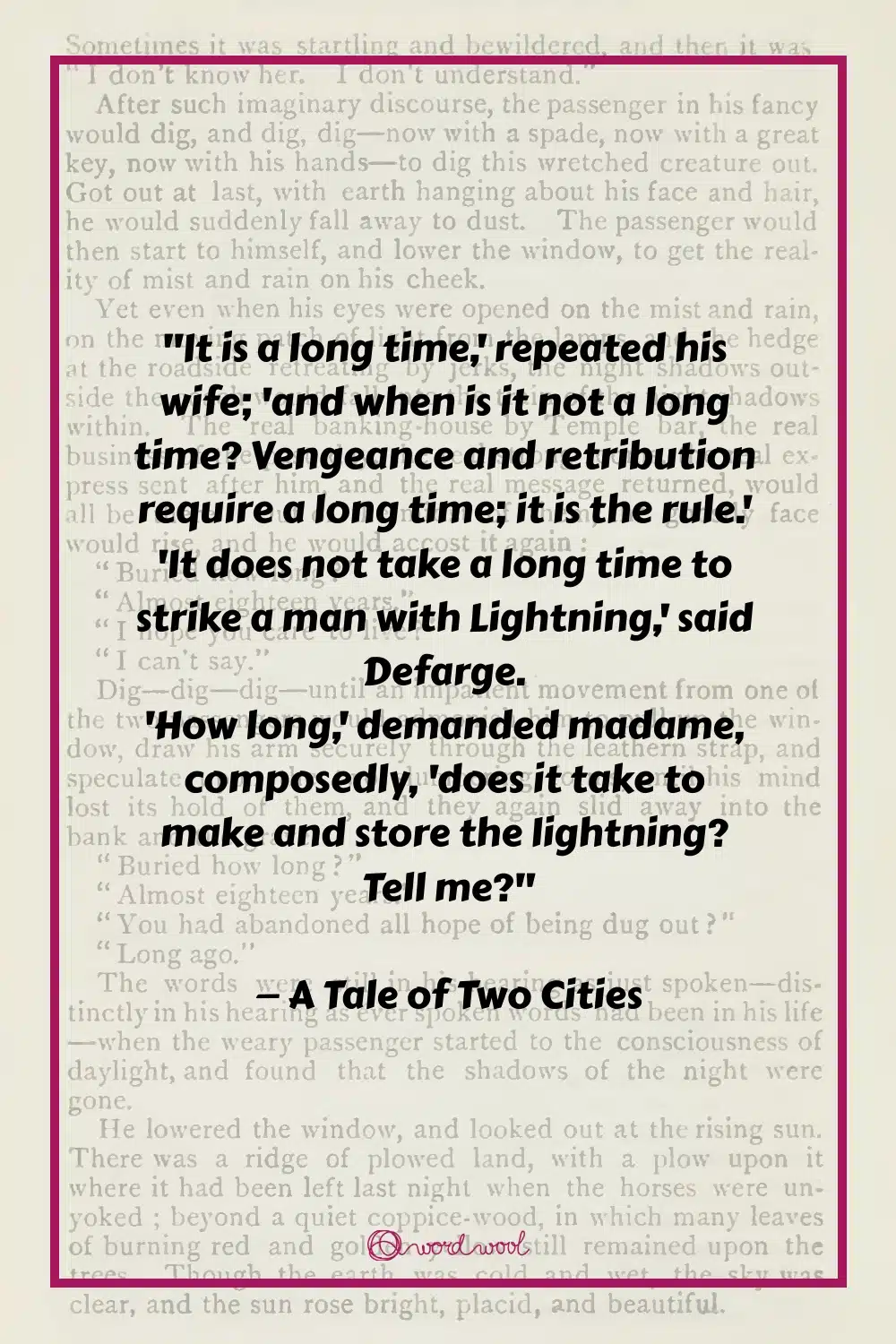
“It is a long time,’ repeated his wife; ‘and when is it not a long time? Vengeance and retribution require a long time; it is the rule.’
‘It does not take a long time to strike a man with Lightning,’ said Defarge.
‘How long,’ demanded madame, composedly, ‘does it take to make and store the lightning? Tell me?”
#25
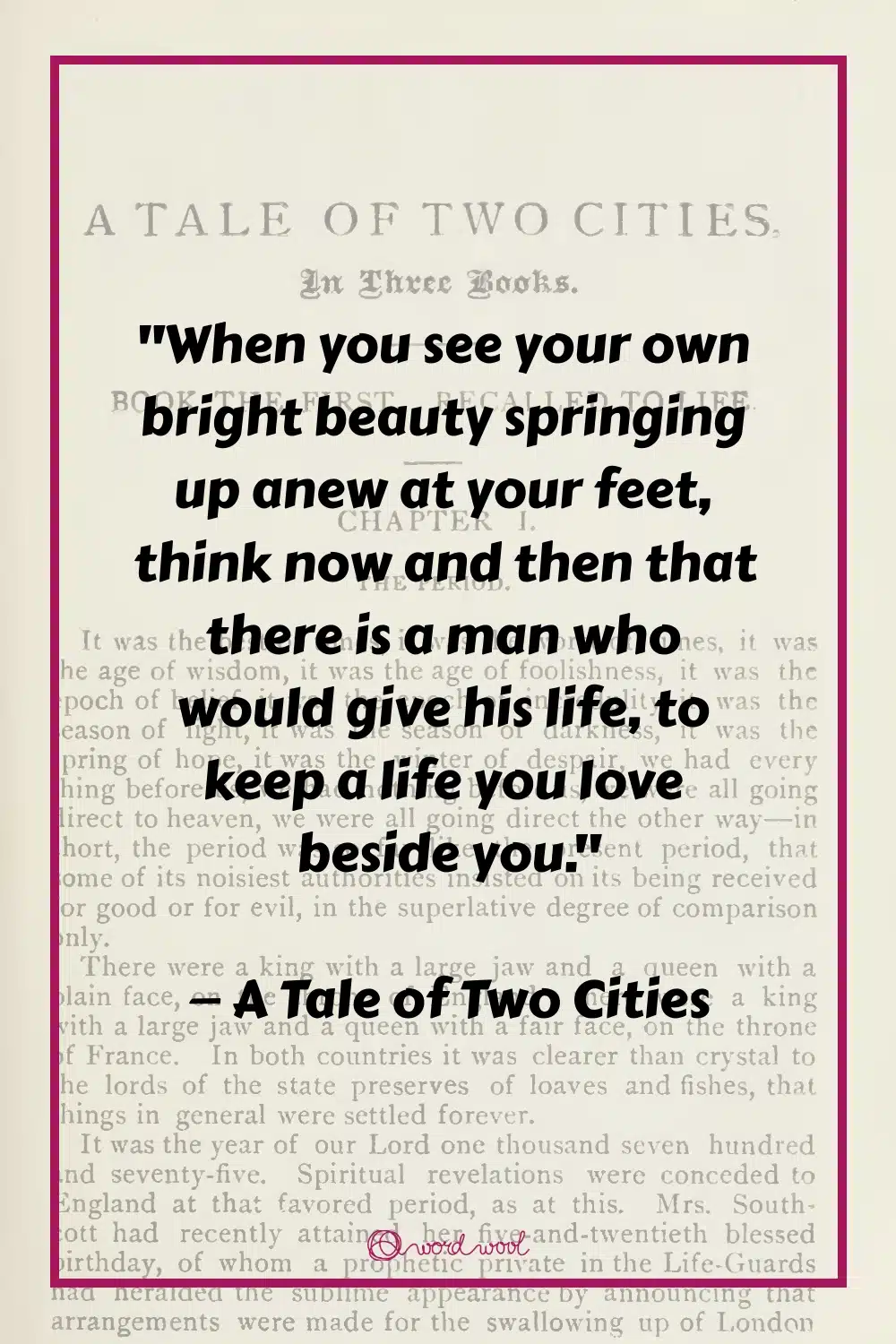
“When you see your own bright beauty springing up anew at your feet, think now and then that there is a man who would give his life, to keep a life you love beside you.”
— A Tale of Two Cities
#26
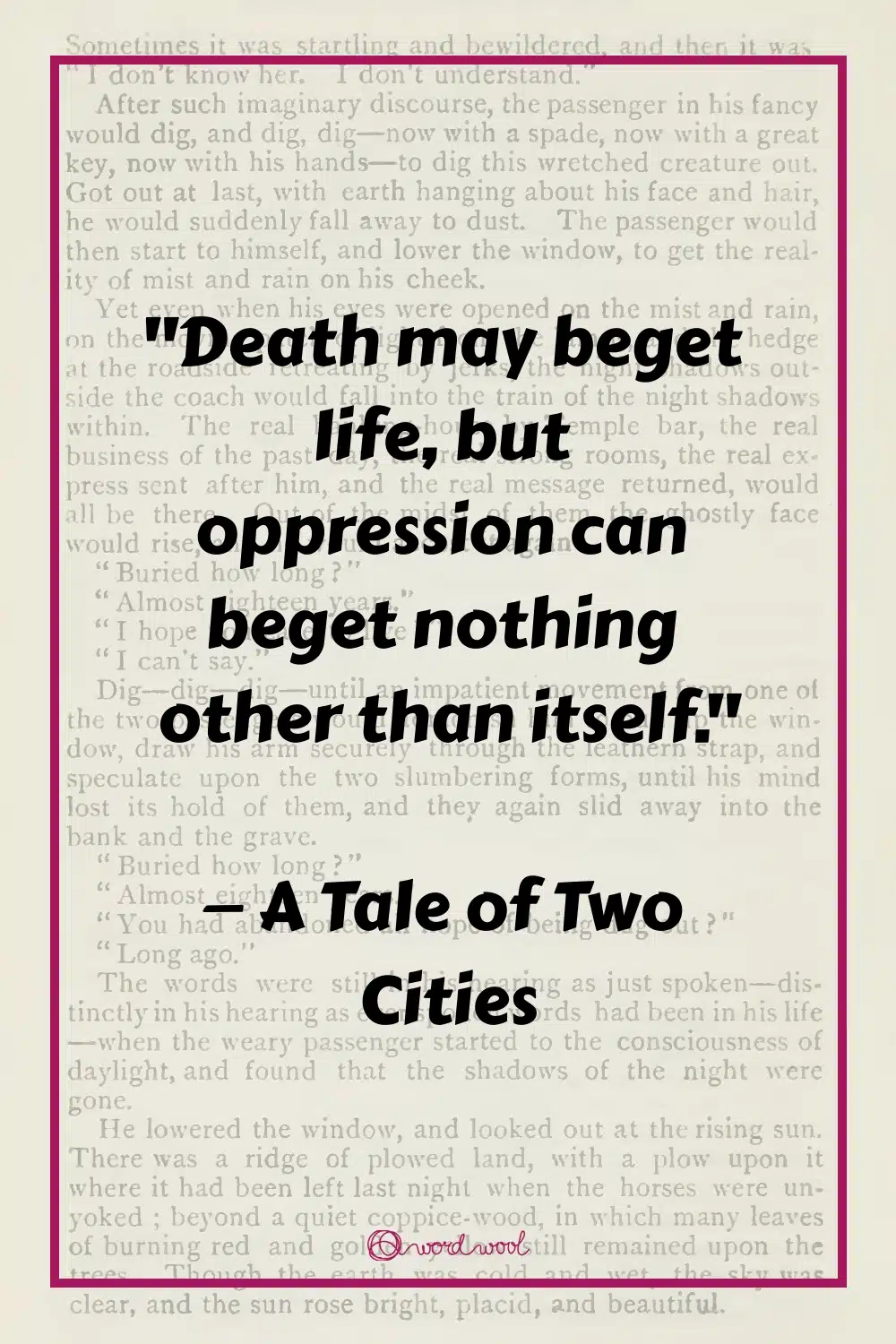
“Death may beget life, but oppression can beget nothing other than itself.”
— A Tale of Two Cities
#27
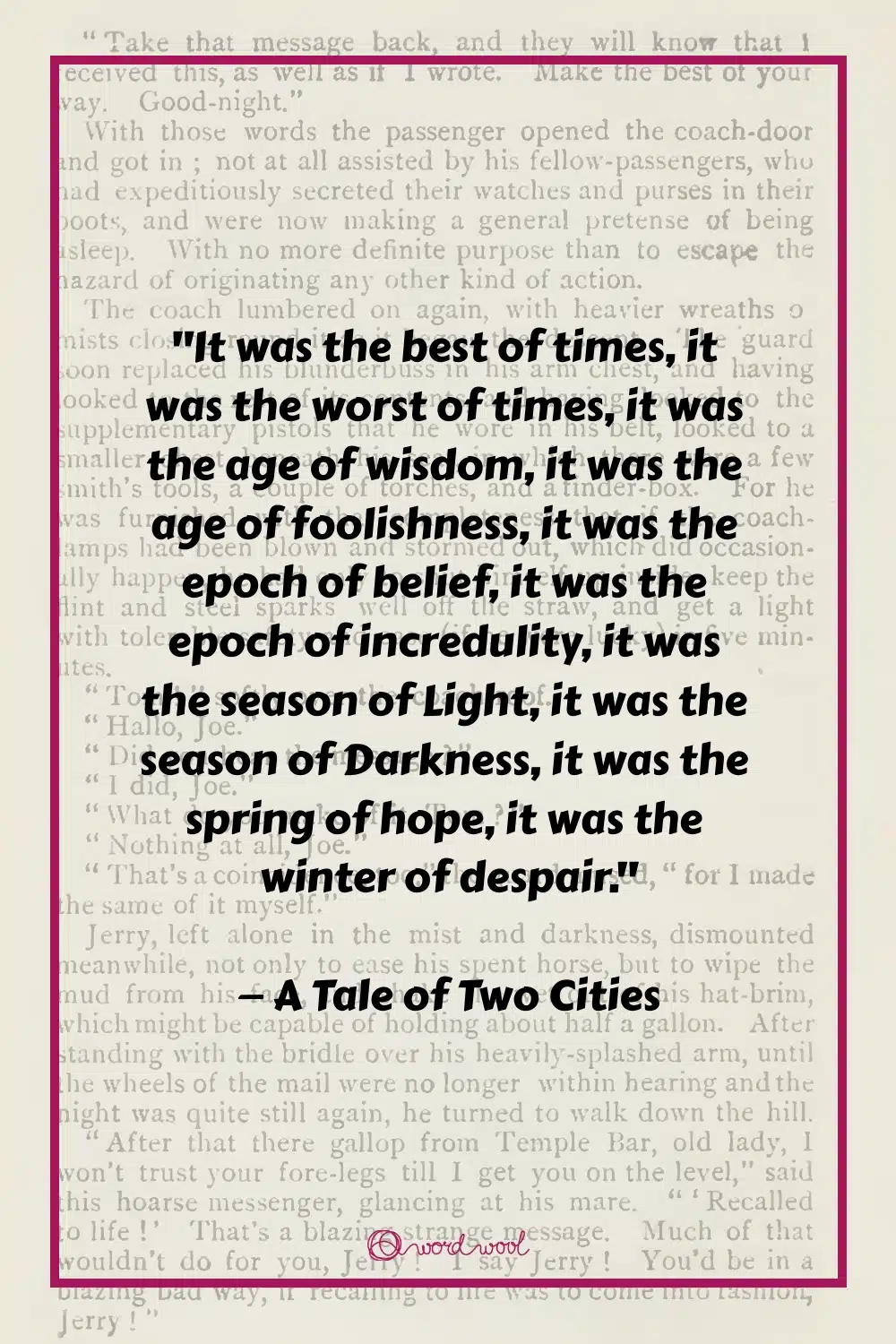
“It was the best of times, it was the worst of times, it was the age of wisdom, it was the age of foolishness, it was the epoch of belief, it was the epoch of incredulity, it was the season of Light, it was the season of Darkness, it was the spring of hope, it was the winter of despair.”
— A Tale of Two Cities
#28
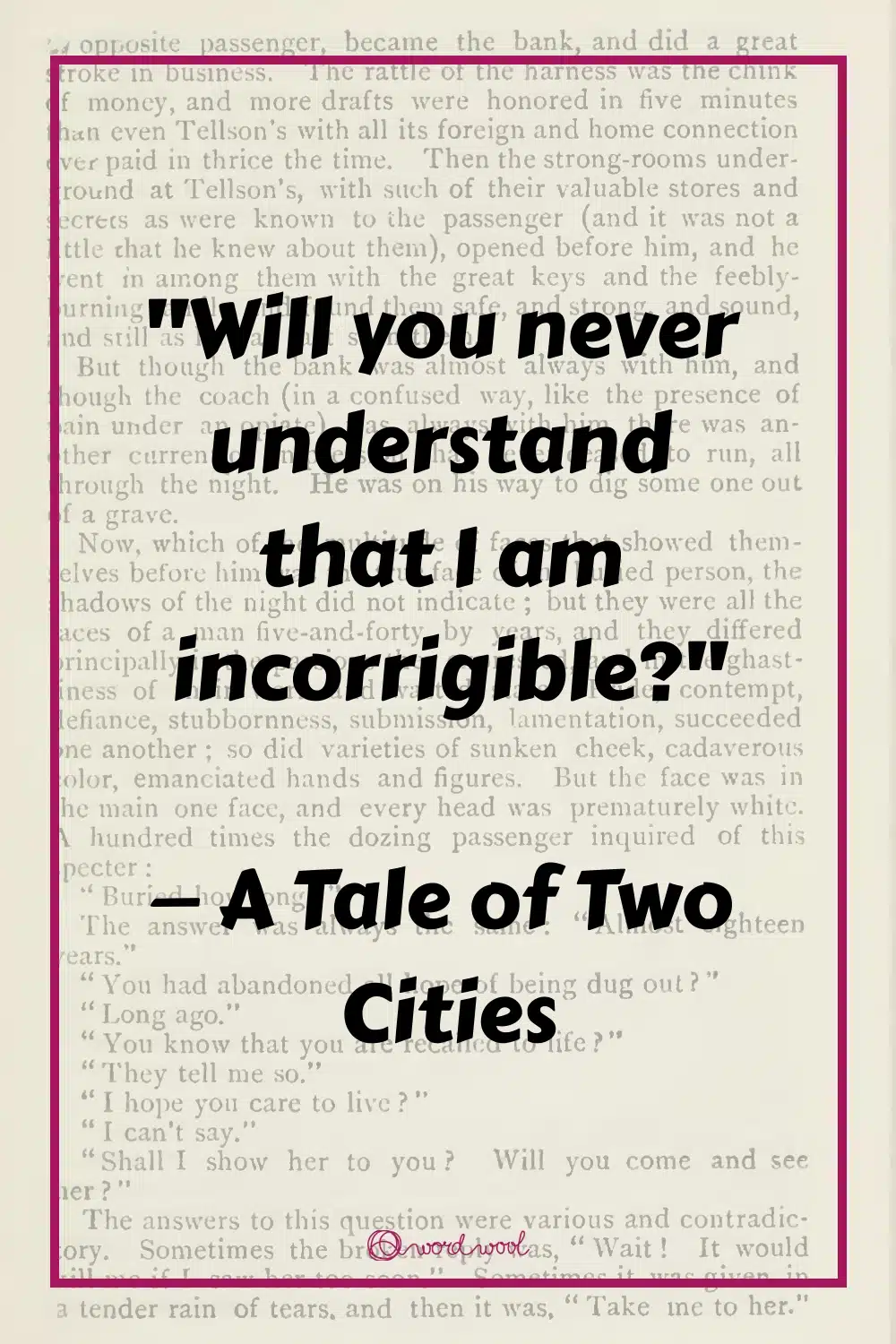
“Will you never understand that I am incorrigible?”
— A Tale of Two Cities
#29
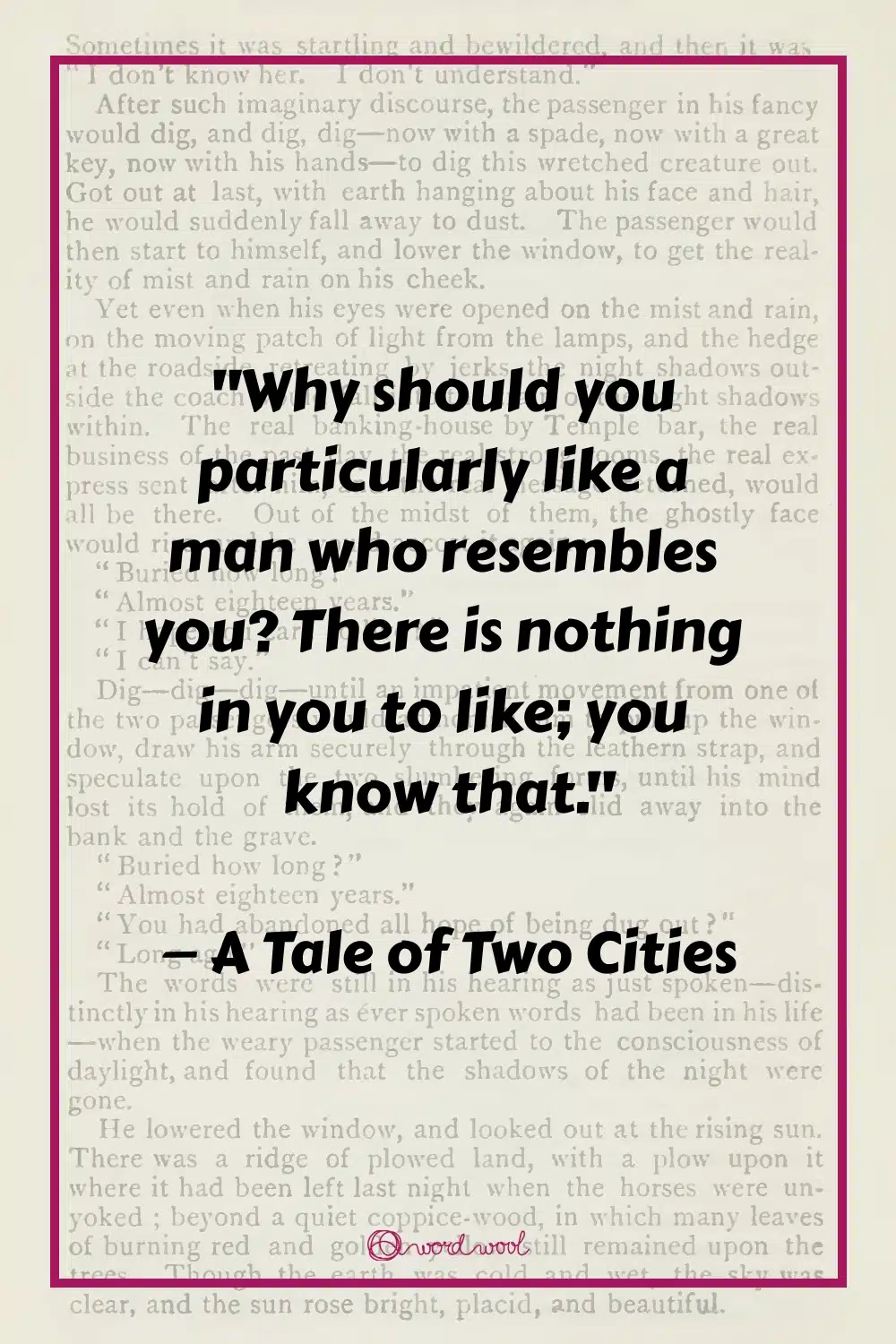
“Why should you particularly like a man who resembles you? There is nothing in you to like; you know that.”
— A Tale of Two Cities
#30
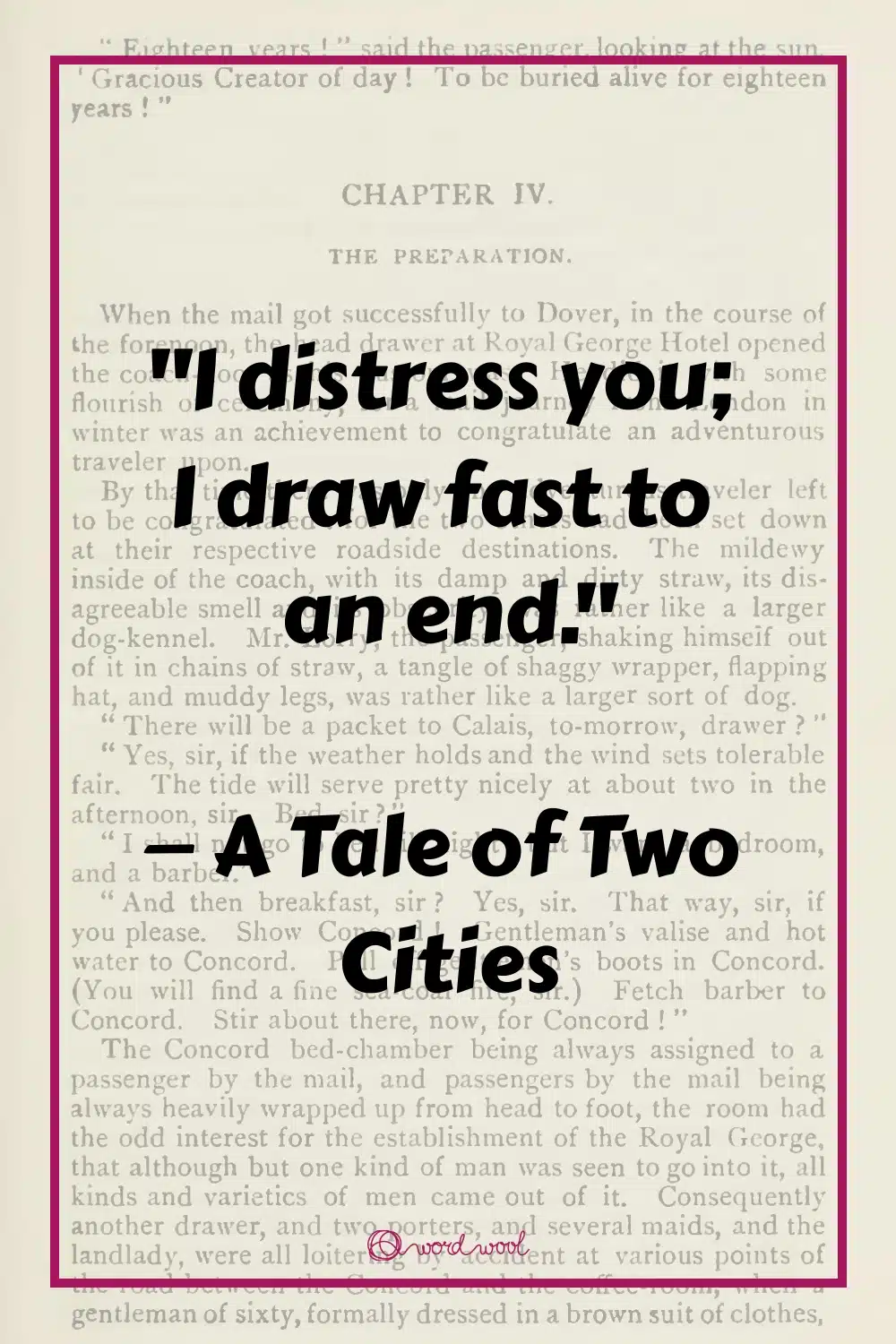
“I distress you; I draw fast to an end.”
— A Tale of Two Cities
#31
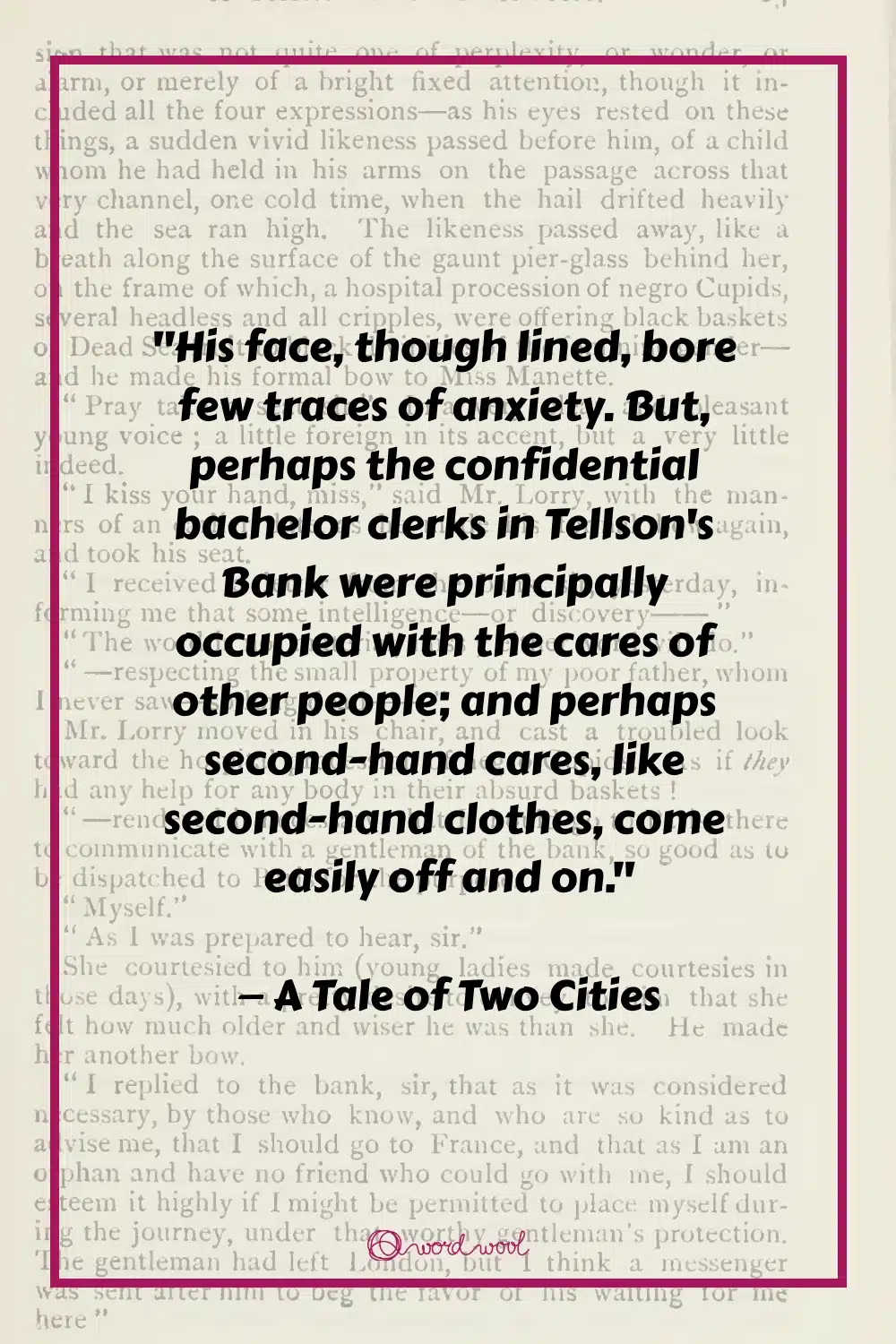
“His face, though lined, bore few traces of anxiety. But, perhaps the confidential bachelor clerks in Tellson’s Bank were principally occupied with the cares of other people; and perhaps second-hand cares, like second-hand clothes, come easily off and on.”
— A Tale of Two Cities
#32
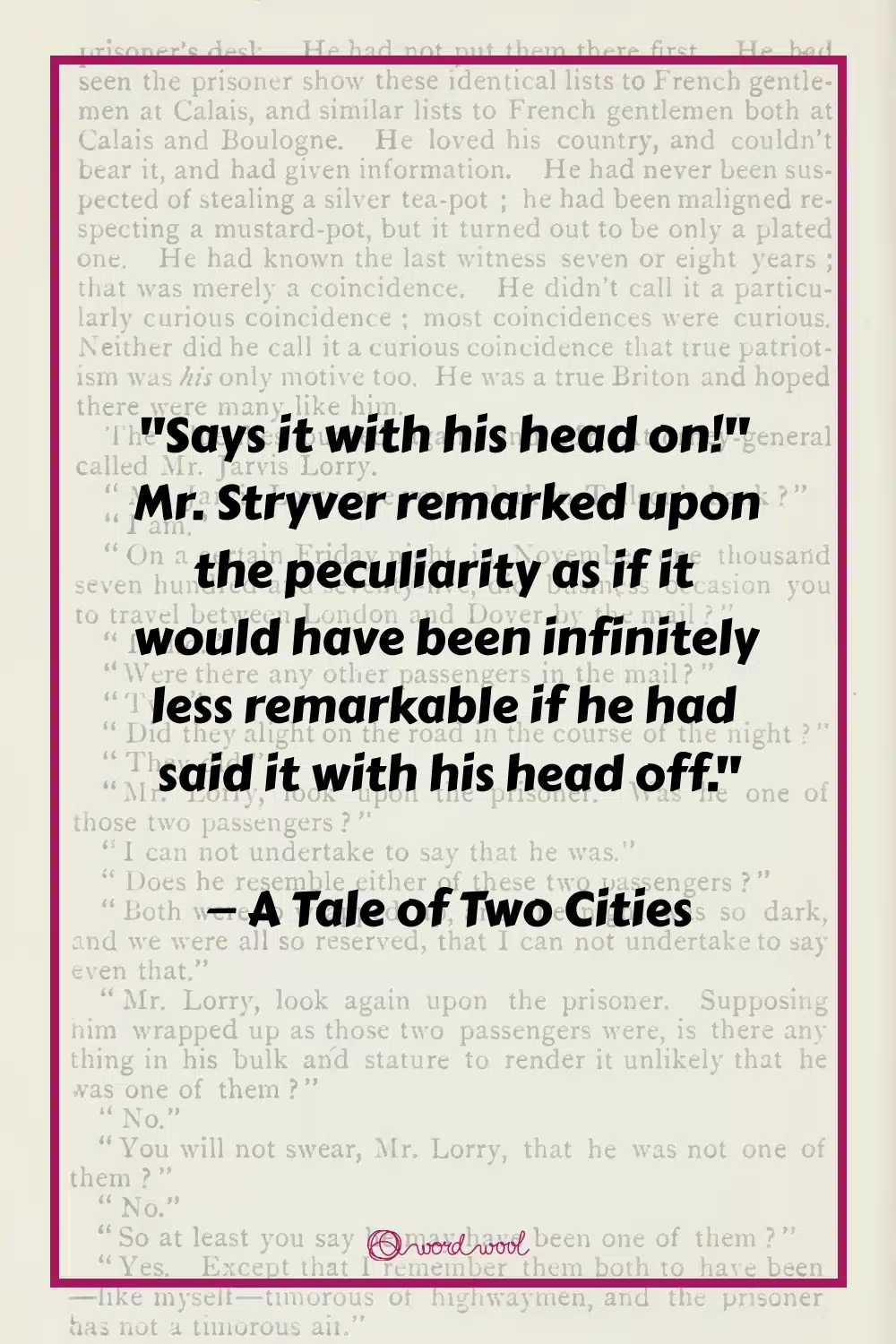
“Says it with his head on!” Mr. Stryver remarked upon the peculiarity as if it would have been infinitely less remarkable if he had said it with his head off.”
— A Tale of Two Cities
#33
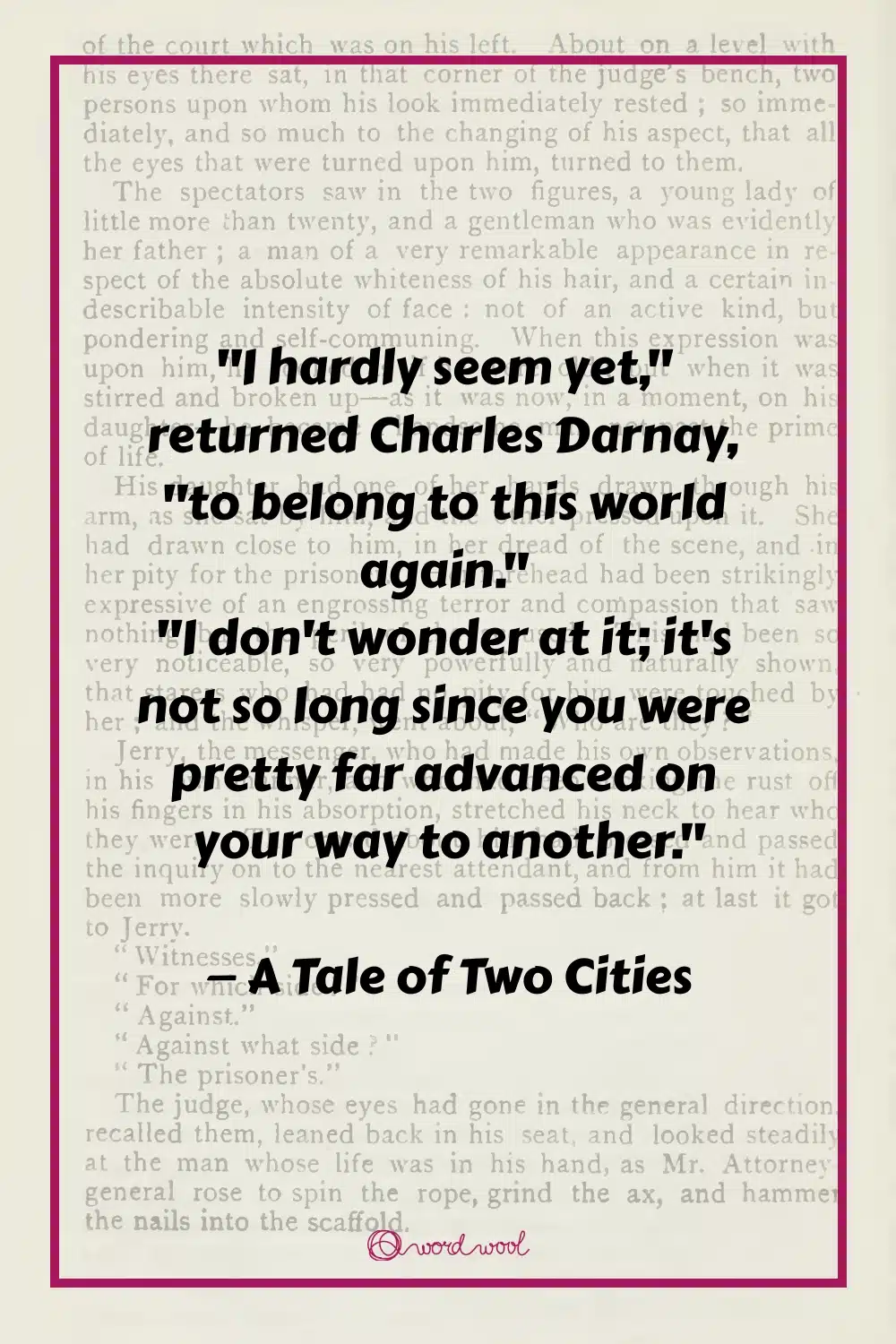
“I hardly seem yet,” returned Charles Darnay, “to belong to this world again.”
“I don’t wonder at it; it’s not so long since you were pretty far advanced on your way to another.”
— A Tale of Two Cities
#34
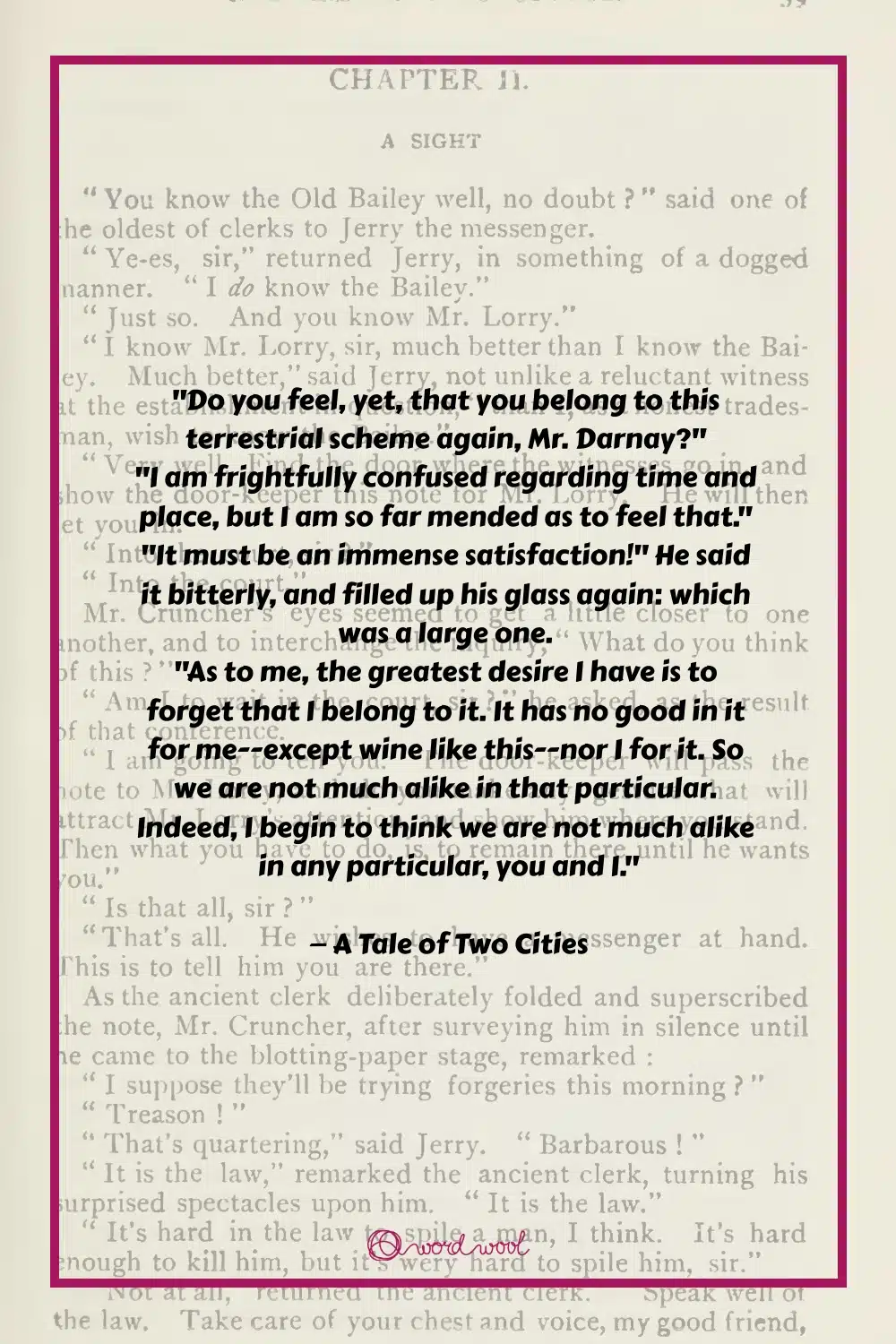
“Do you feel, yet, that you belong to this terrestrial scheme again, Mr. Darnay?”
“I am frightfully confused regarding time and place, but I am so far mended as to feel that.”
“It must be an immense satisfaction!” He said it bitterly, and filled up his glass again: which was a large one.
“As to me, the greatest desire I have is to forget that I belong to it. It has no good in it for me–except wine like this–nor I for it. So we are not much alike in that particular. Indeed, I begin to think we are not much alike in any particular, you and I.”
— A Tale of Two Cities
#35
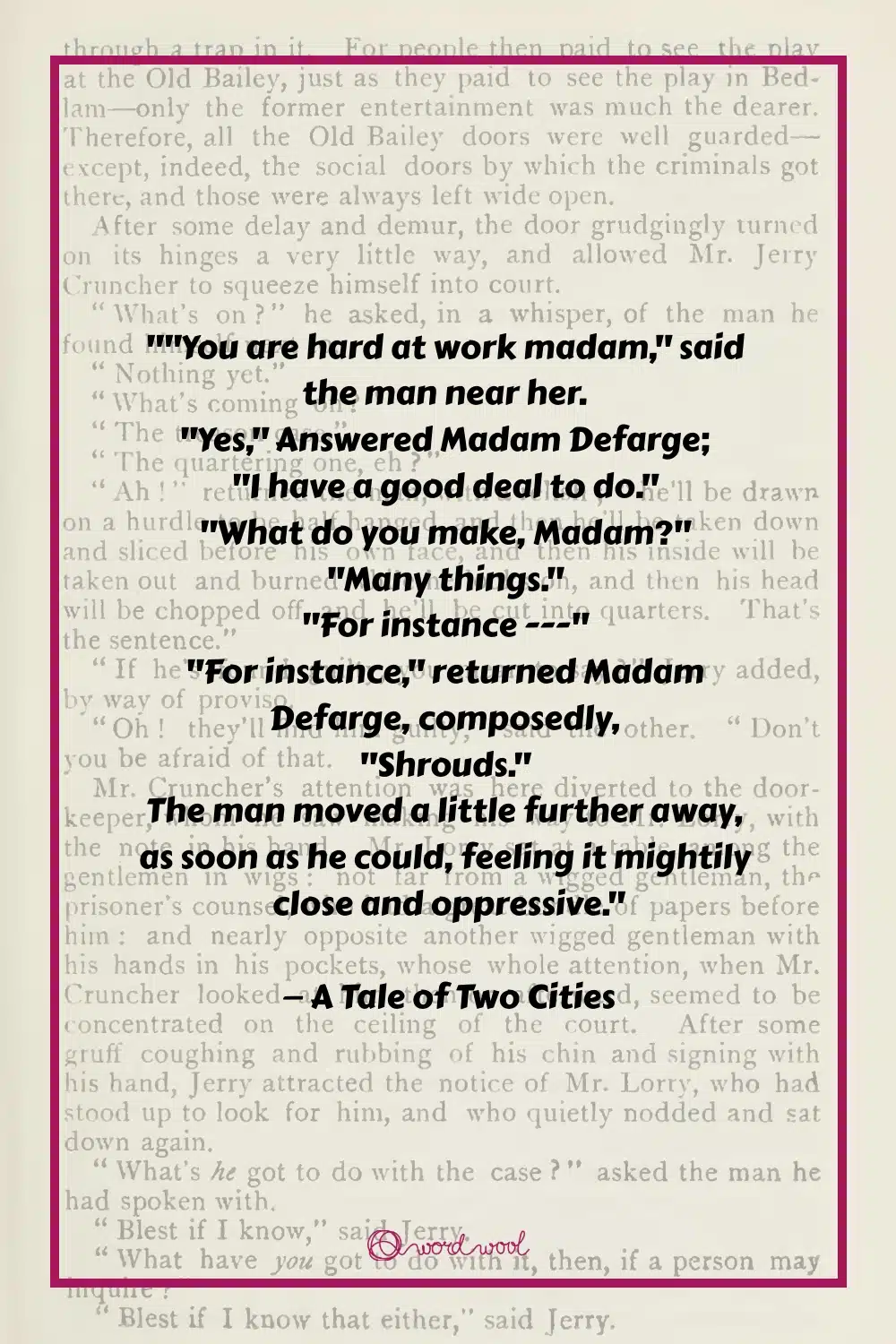
“”You are hard at work madam,” said the man near her.
“Yes,” Answered Madam Defarge;
“I have a good deal to do.”
“What do you make, Madam?”
“Many things.”
“For instance —”
“For instance,” returned Madam Defarge, composedly,
“Shrouds.”
The man moved a little further away, as soon as he could, feeling it mightily close and oppressive.”
— A Tale of Two Cities
#36
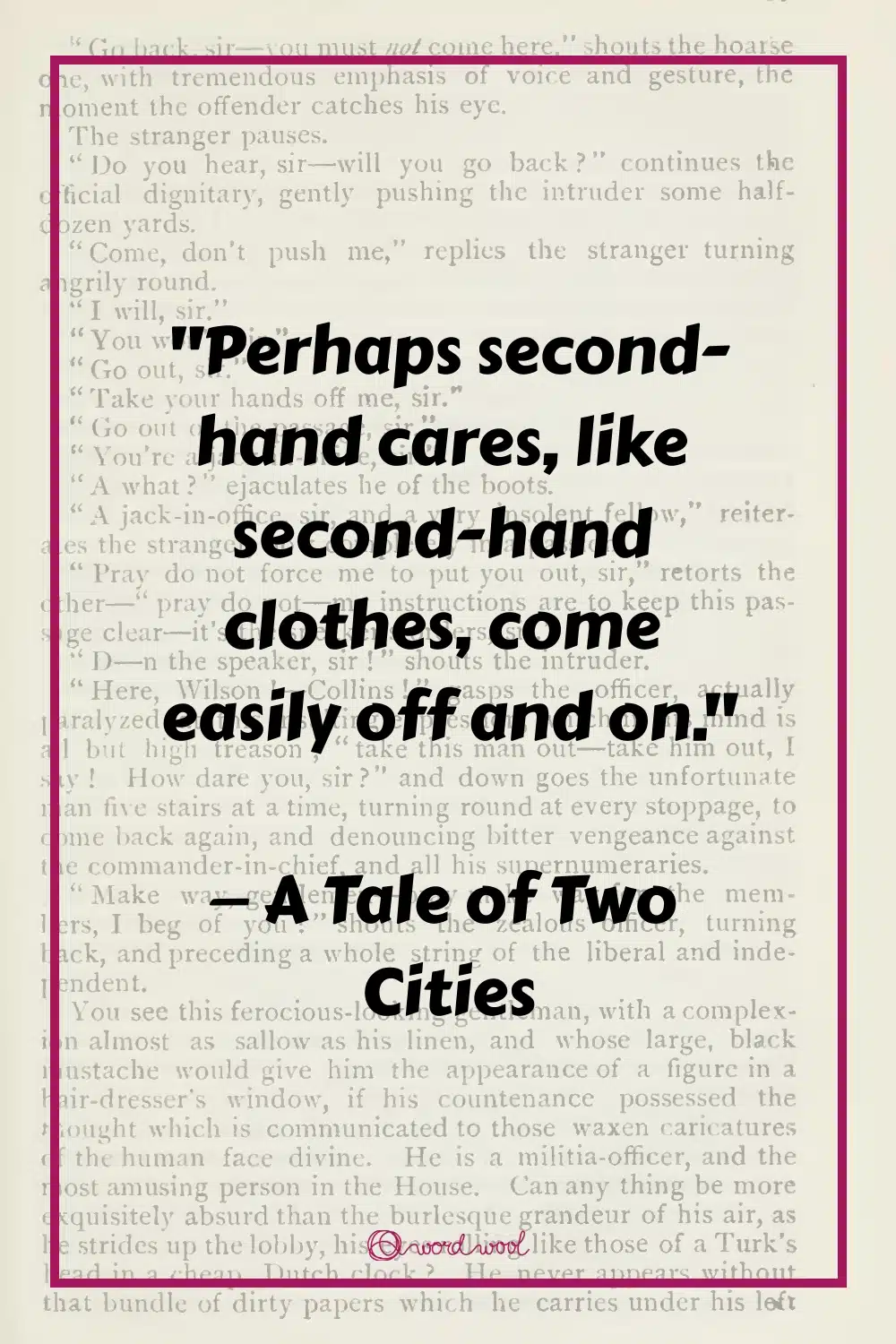
“Perhaps second-hand cares, like second-hand clothes, come easily off and on.”
— A Tale of Two Cities
#37
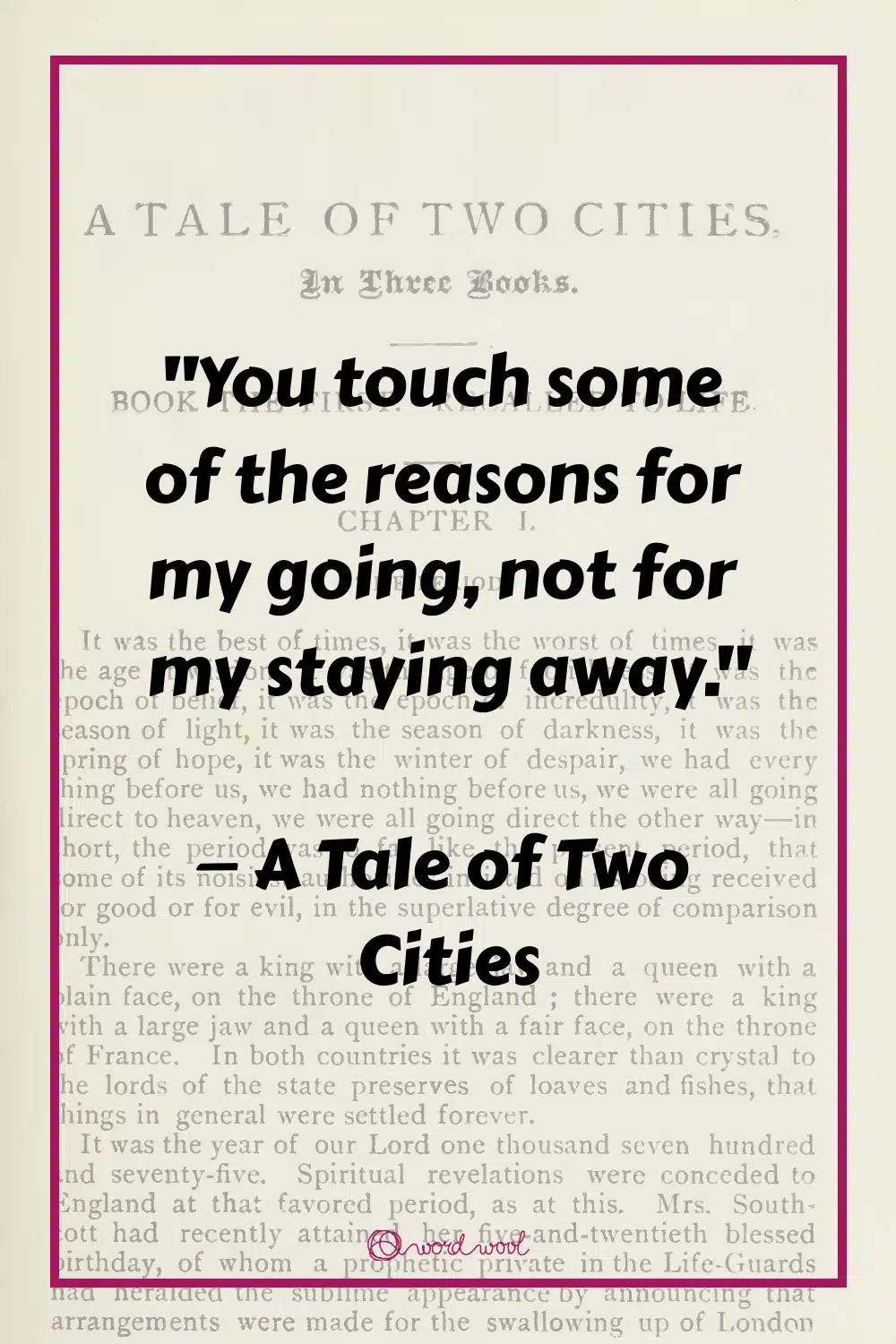
“You touch some of the reasons for my going, not for my staying away.”
— A Tale of Two Cities
#38
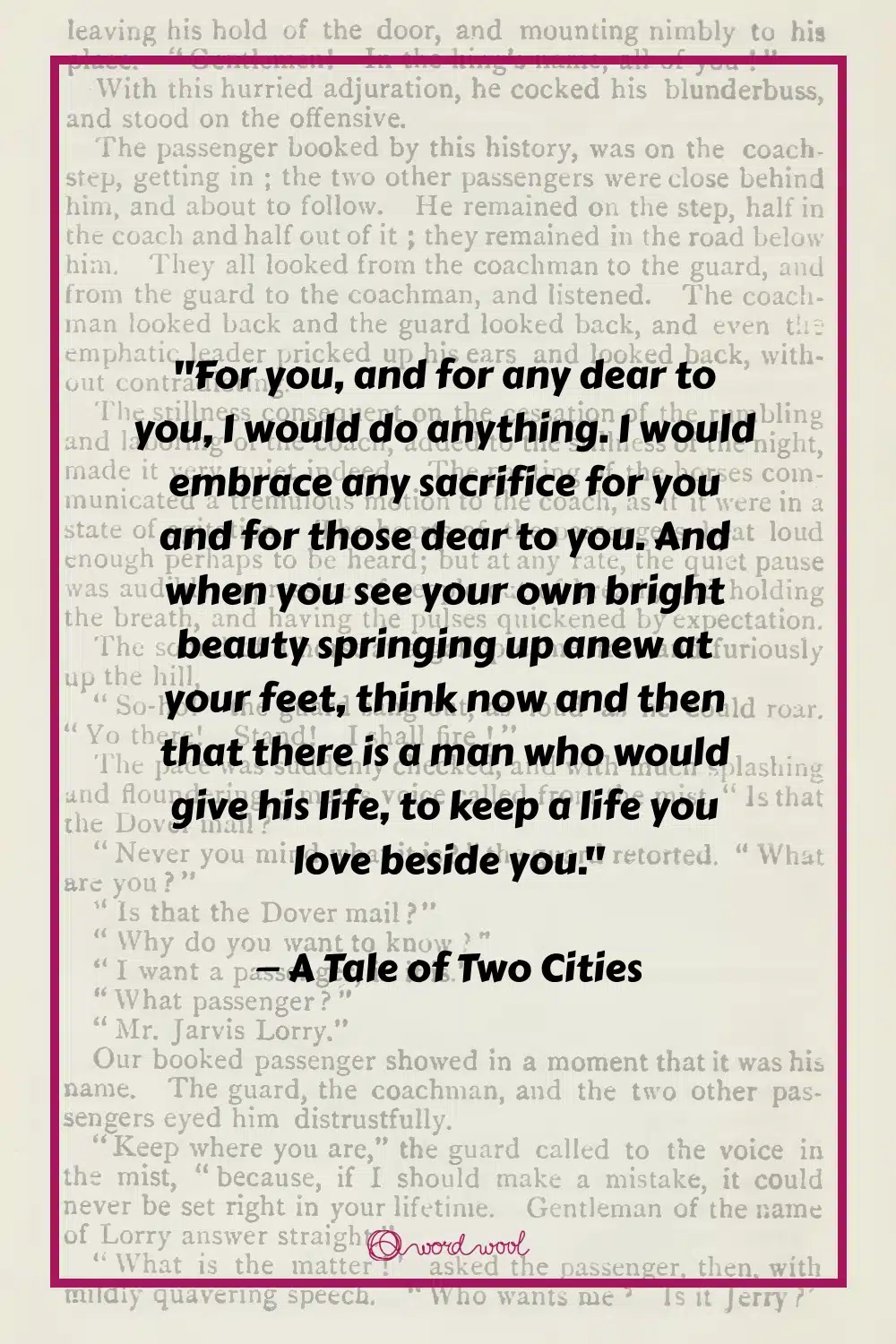
“For you, and for any dear to you, I would do anything. I would embrace any sacrifice for you and for those dear to you. And when you see your own bright beauty springing up anew at your feet, think now and then that there is a man who would give his life, to keep a life you love beside you.”
— A Tale of Two Cities
#39
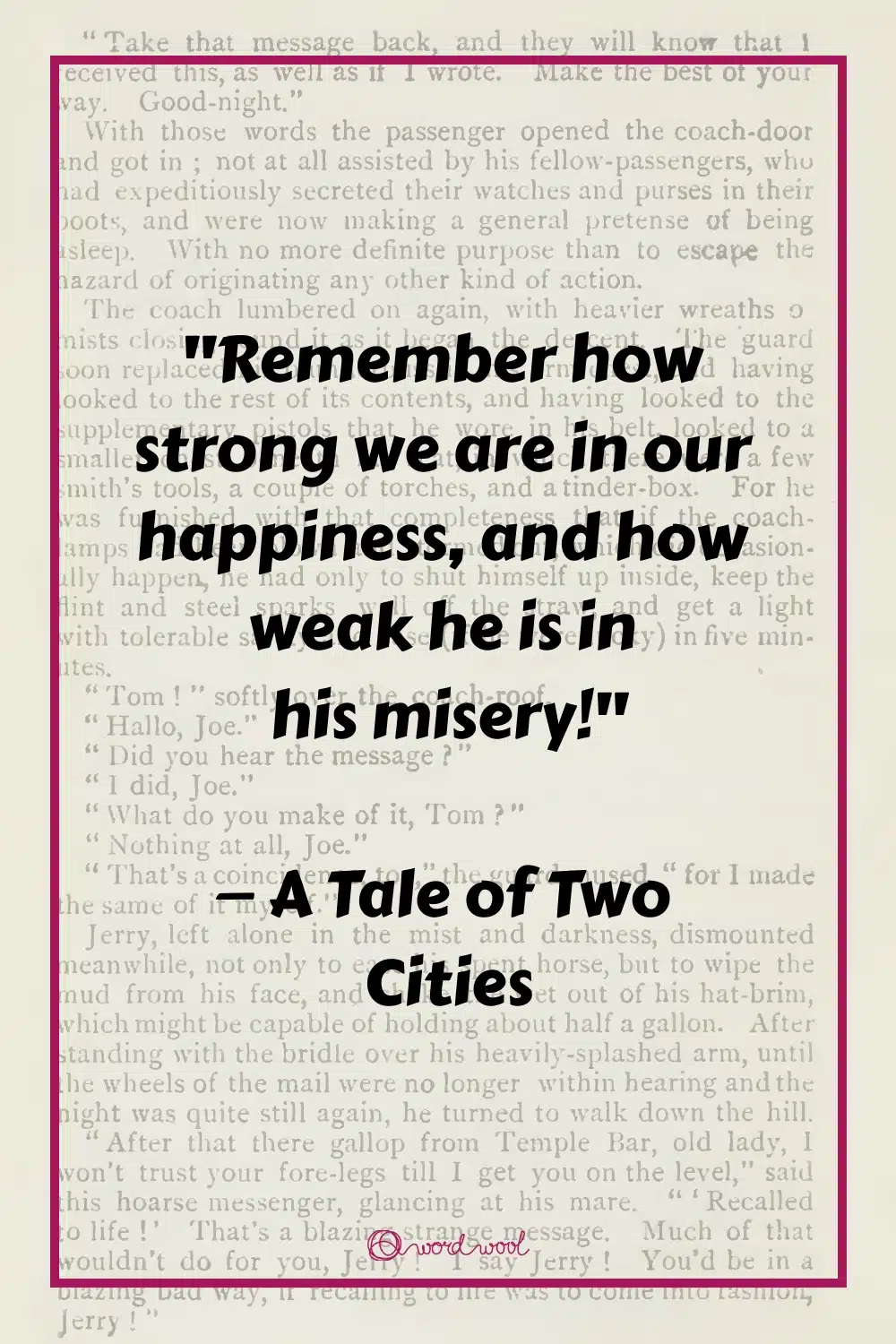
“Remember how strong we are in our happiness, and how weak he is in his misery!”
— A Tale of Two Cities
#40
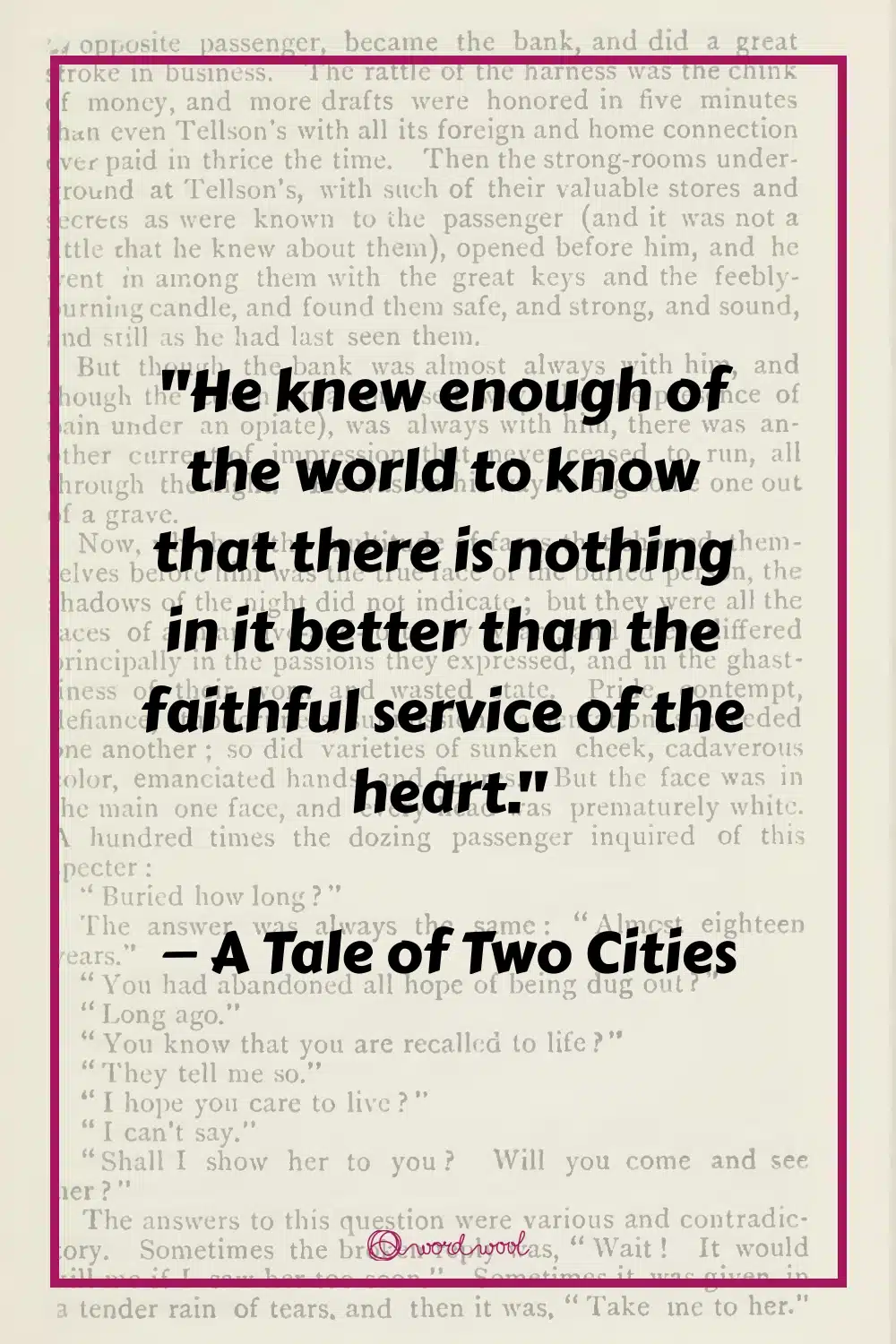
“He knew enough of the world to know that there is nothing in it better than the faithful service of the heart.”
— A Tale of Two Cities
#41
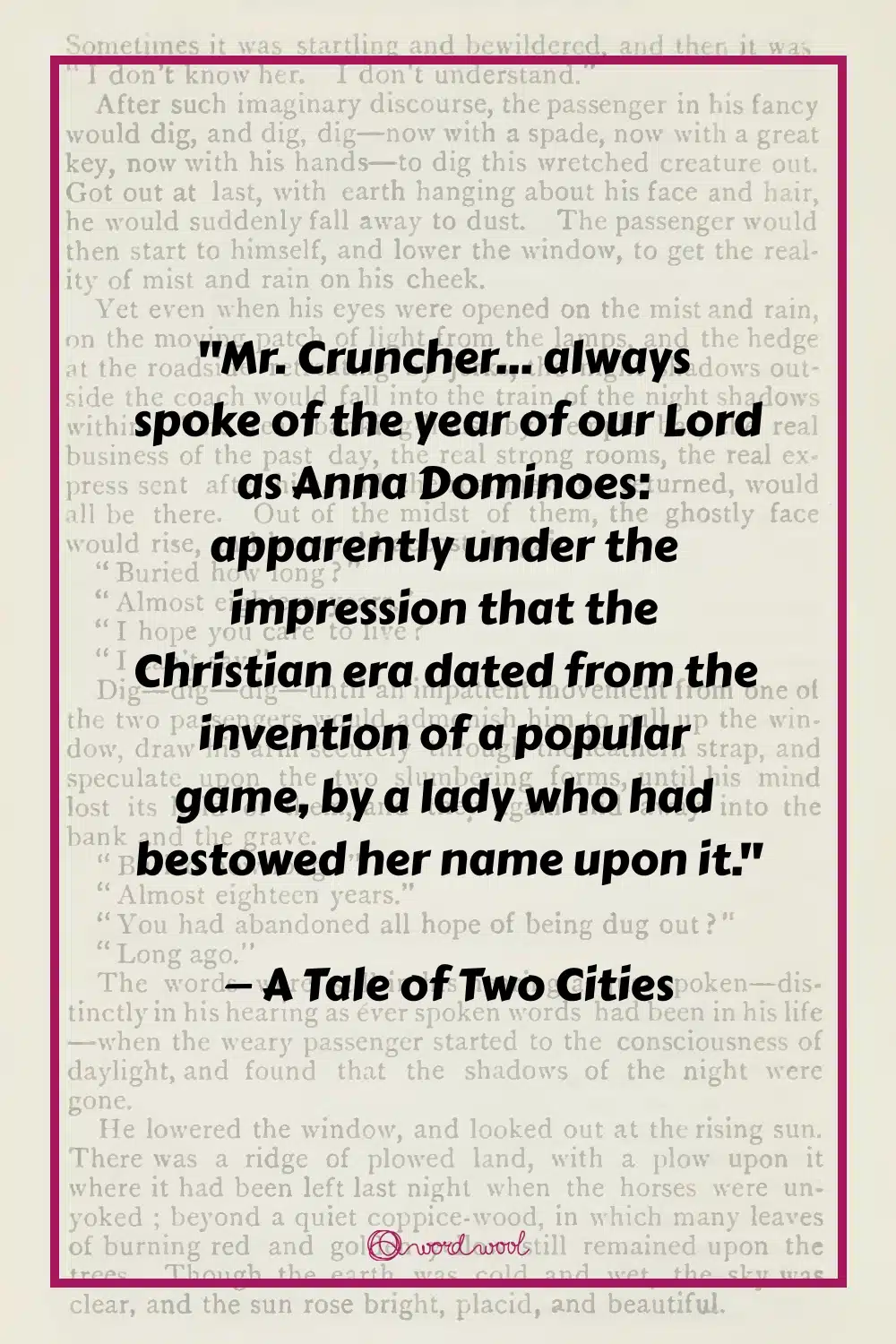
“Mr. Cruncher… always spoke of the year of our Lord as Anna Dominoes: apparently under the impression that the Christian era dated from the invention of a popular game, by a lady who had bestowed her name upon it.”
— A Tale of Two Cities
#42
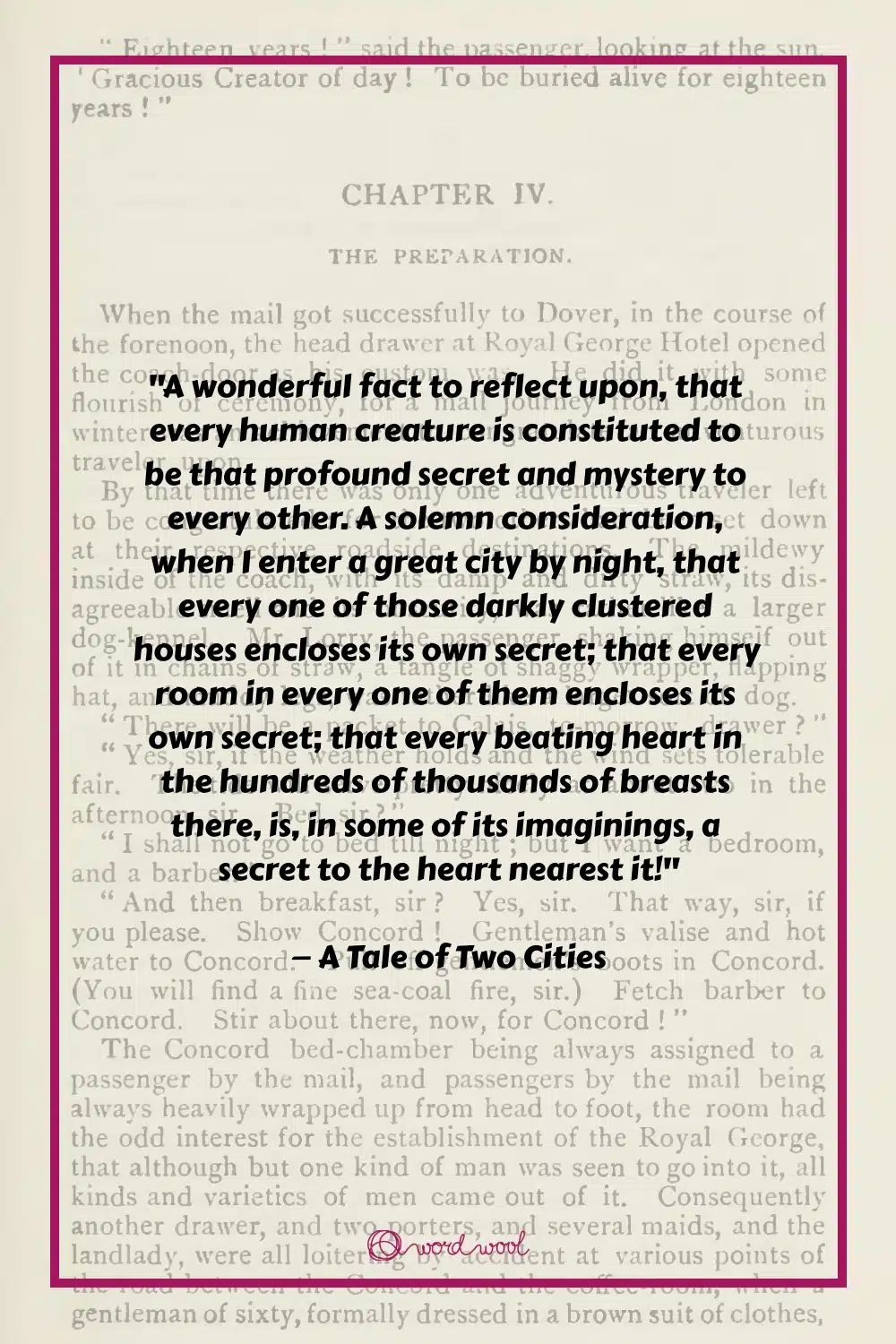
“A wonderful fact to reflect upon, that every human creature is constituted to be that profound secret and mystery to every other. A solemn consideration, when I enter a great city by night, that every one of those darkly clustered houses encloses its own secret; that every room in every one of them encloses its own secret; that every beating heart in the hundreds of thousands of breasts there, is, in some of its imaginings, a secret to the heart nearest it!”
— A Tale of Two Cities
#43
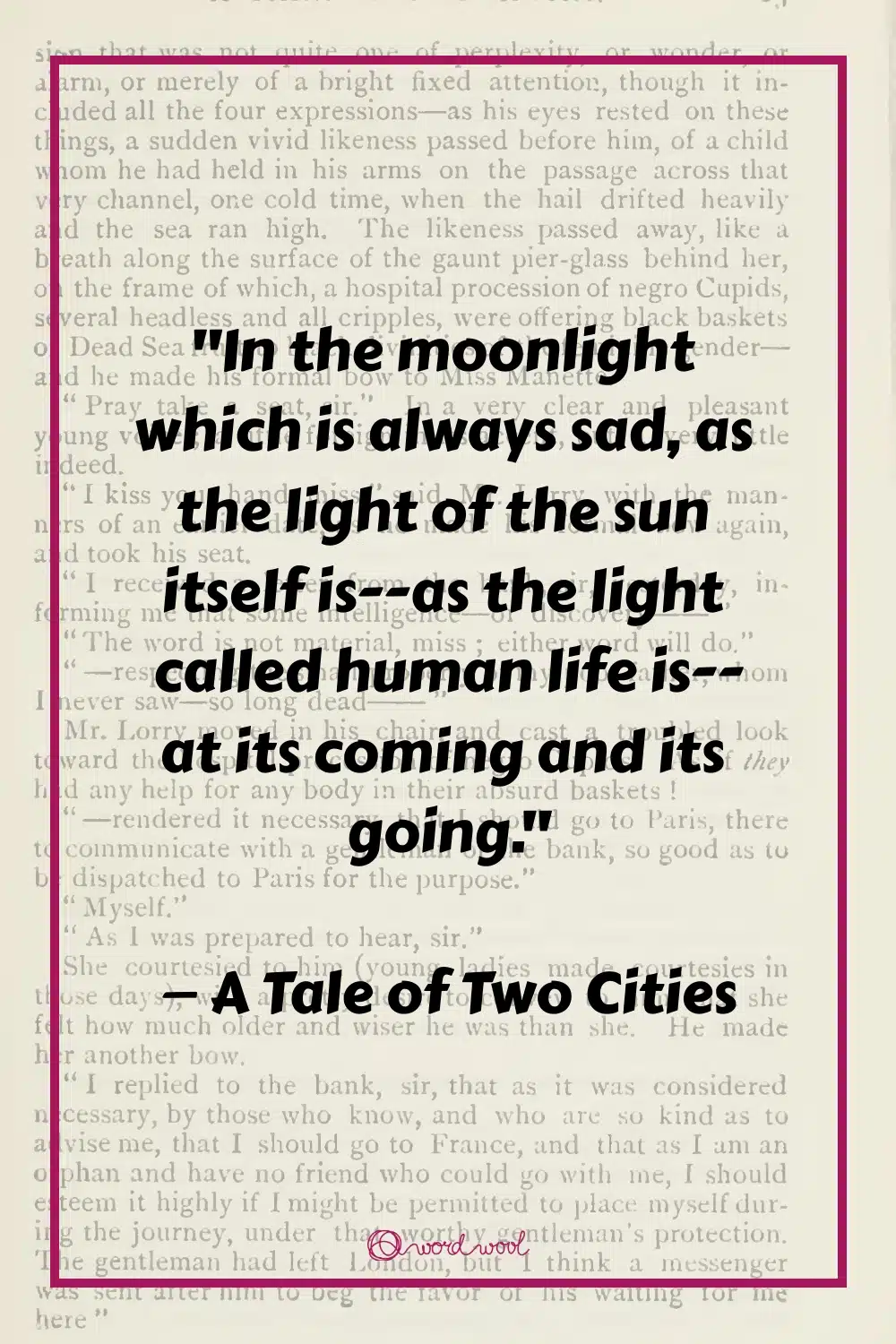
“In the moonlight which is always sad, as the light of the sun itself is–as the light called human life is–at its coming and its going.”
— A Tale of Two Cities
#44
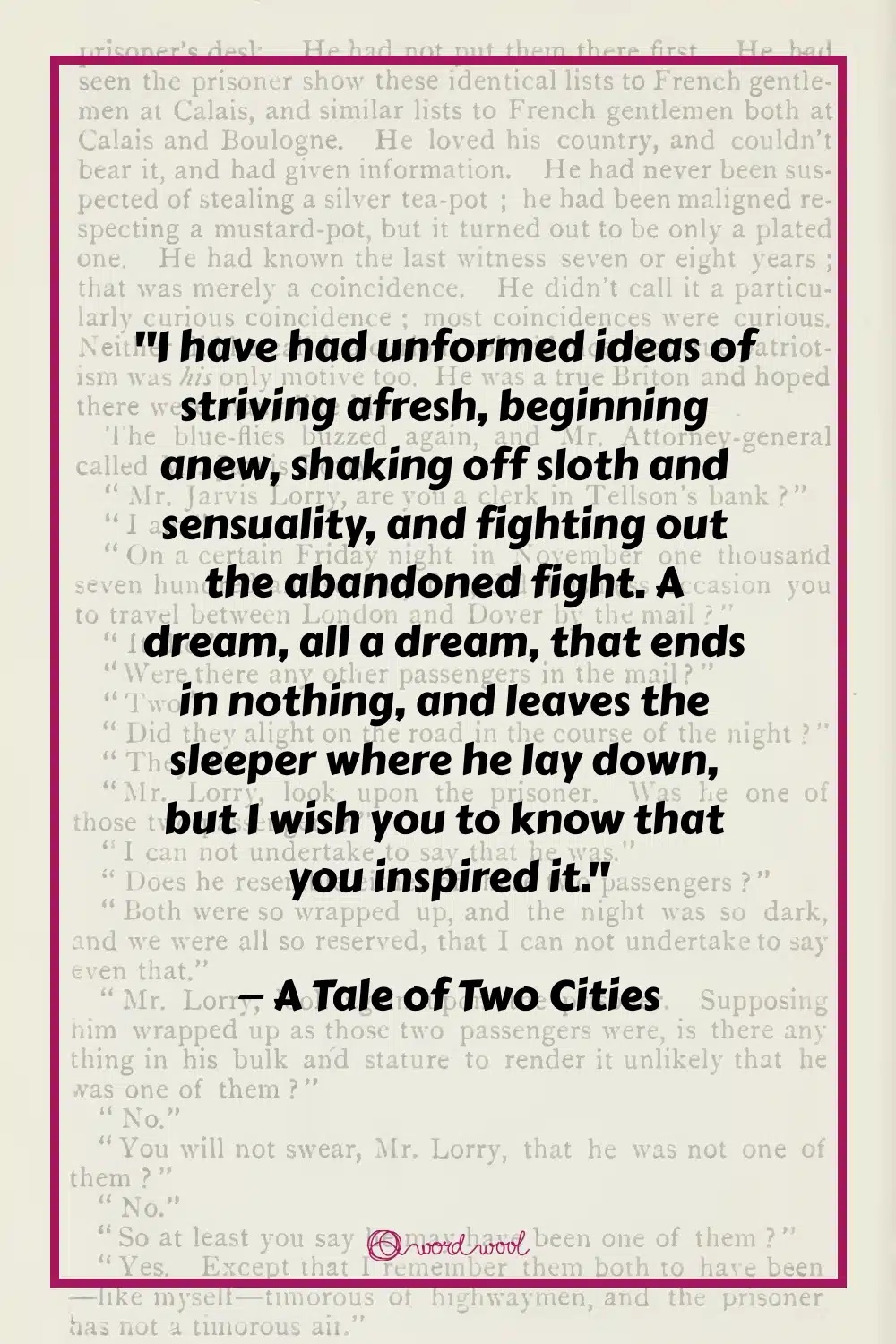
“I have had unformed ideas of striving afresh, beginning anew, shaking off sloth and sensuality, and fighting out the abandoned fight. A dream, all a dream, that ends in nothing, and leaves the sleeper where he lay down, but I wish you to know that you inspired it.”
— A Tale of Two Cities
#45
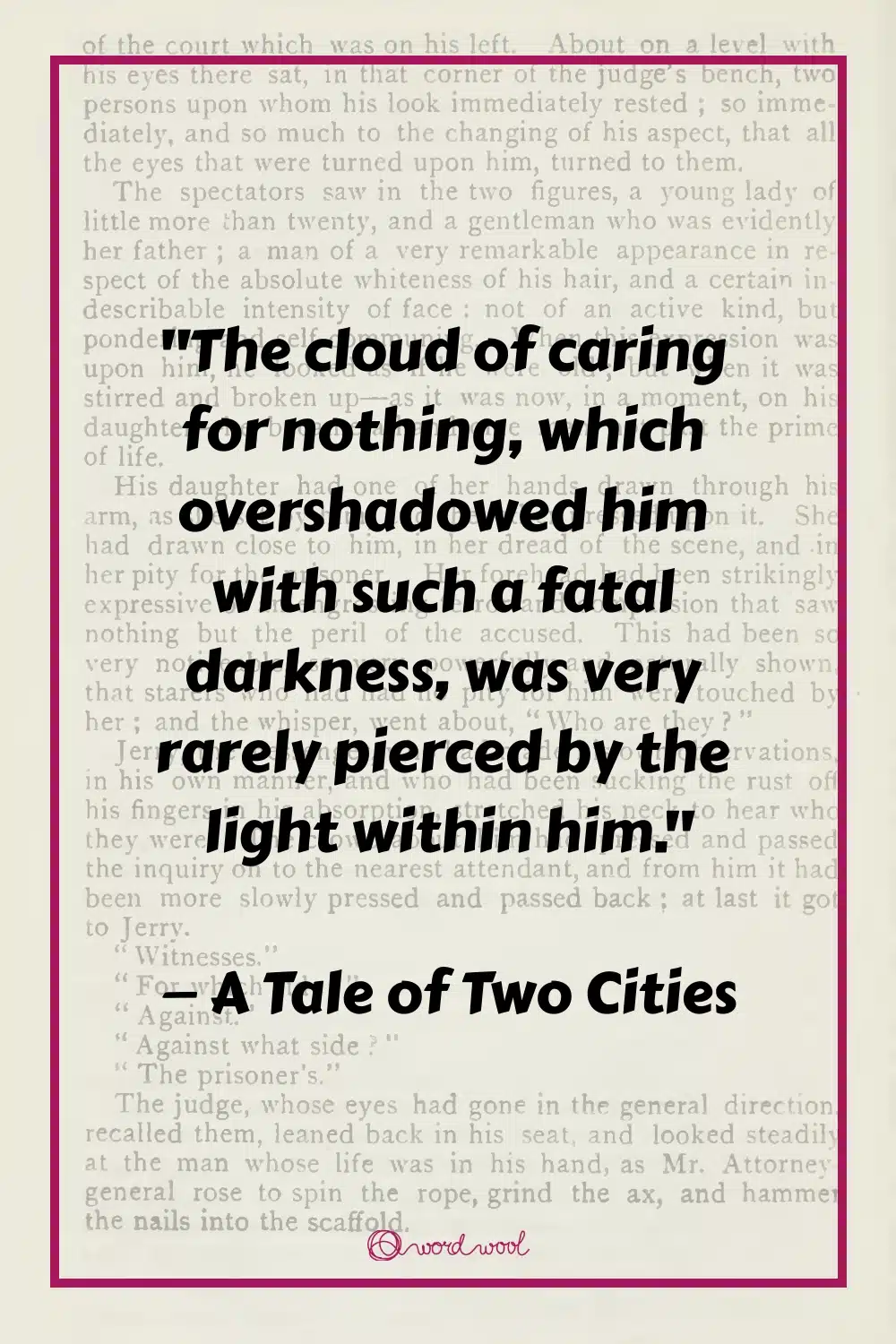
“The cloud of caring for nothing, which overshadowed him with such a fatal darkness, was very rarely pierced by the light within him.”
— A Tale of Two Cities
#46
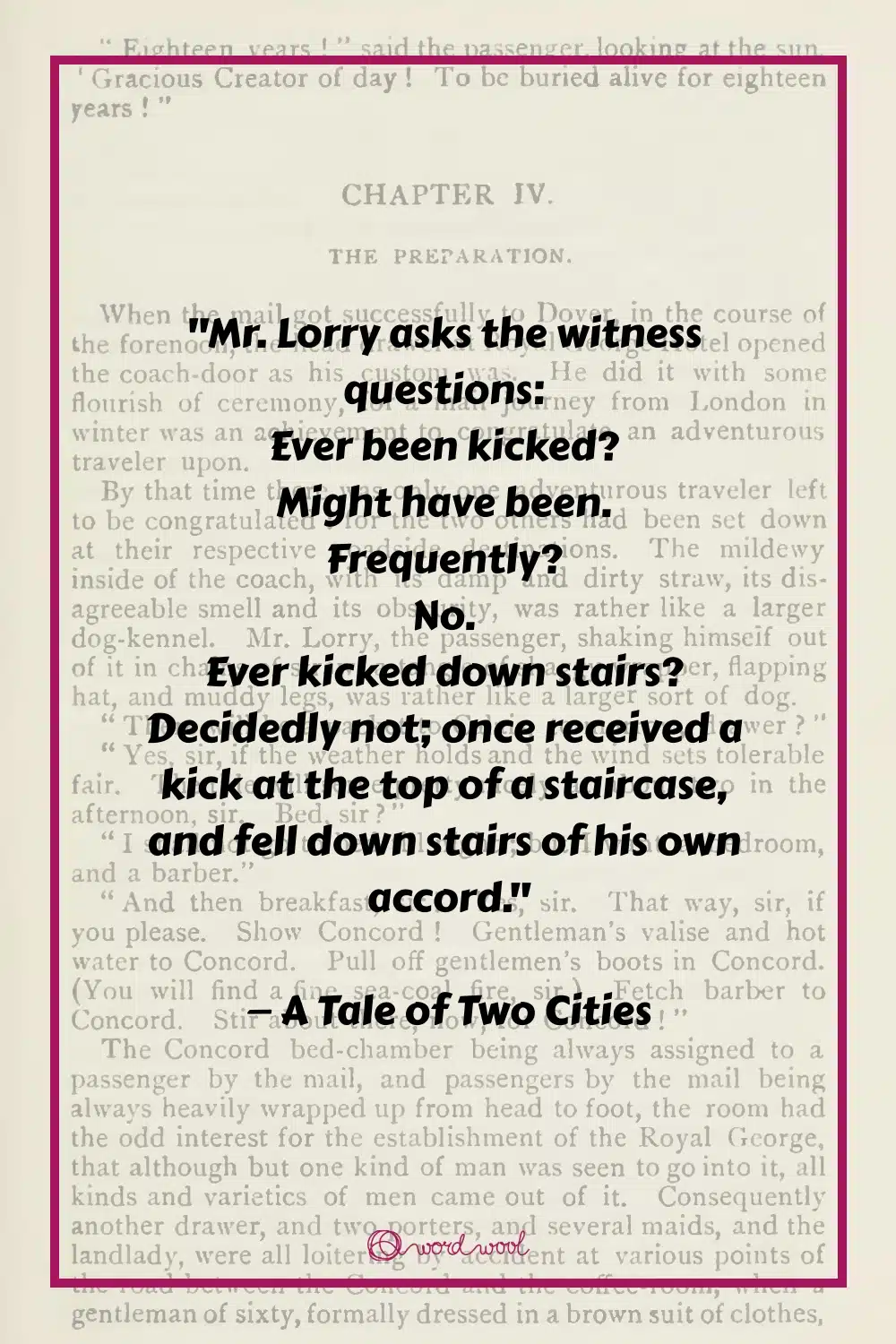
“Mr. Lorry asks the witness questions:
Ever been kicked?
Might have been.
Frequently?
No.
Ever kicked down stairs?
Decidedly not; once received a kick at the top of a staircase, and fell down stairs of his own accord.”
— A Tale of Two Cities
#47
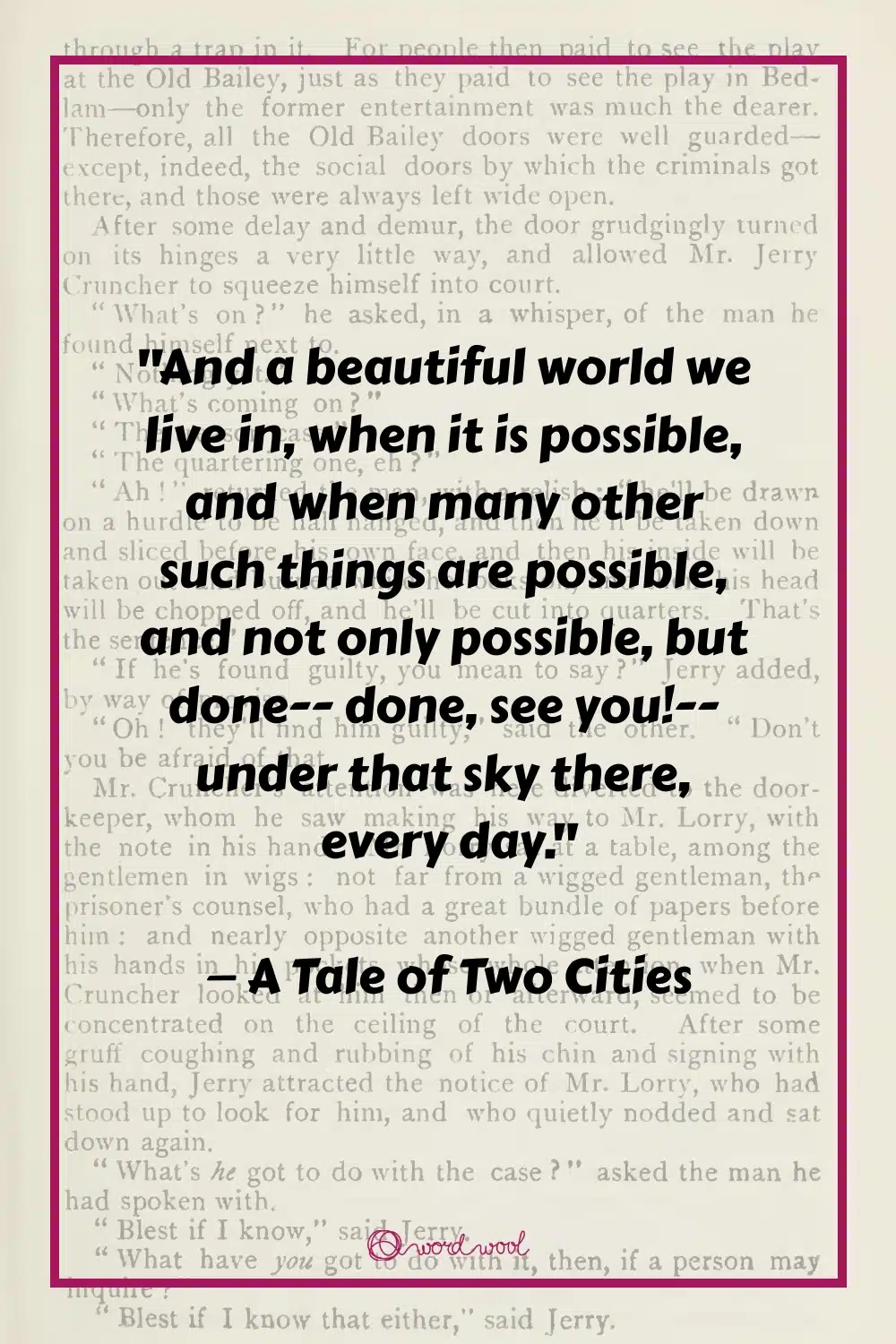
“And a beautiful world we live in, when it is possible, and when many other such things are possible, and not only possible, but done– done, see you!– under that sky there, every day.”
— A Tale of Two Cities
#48
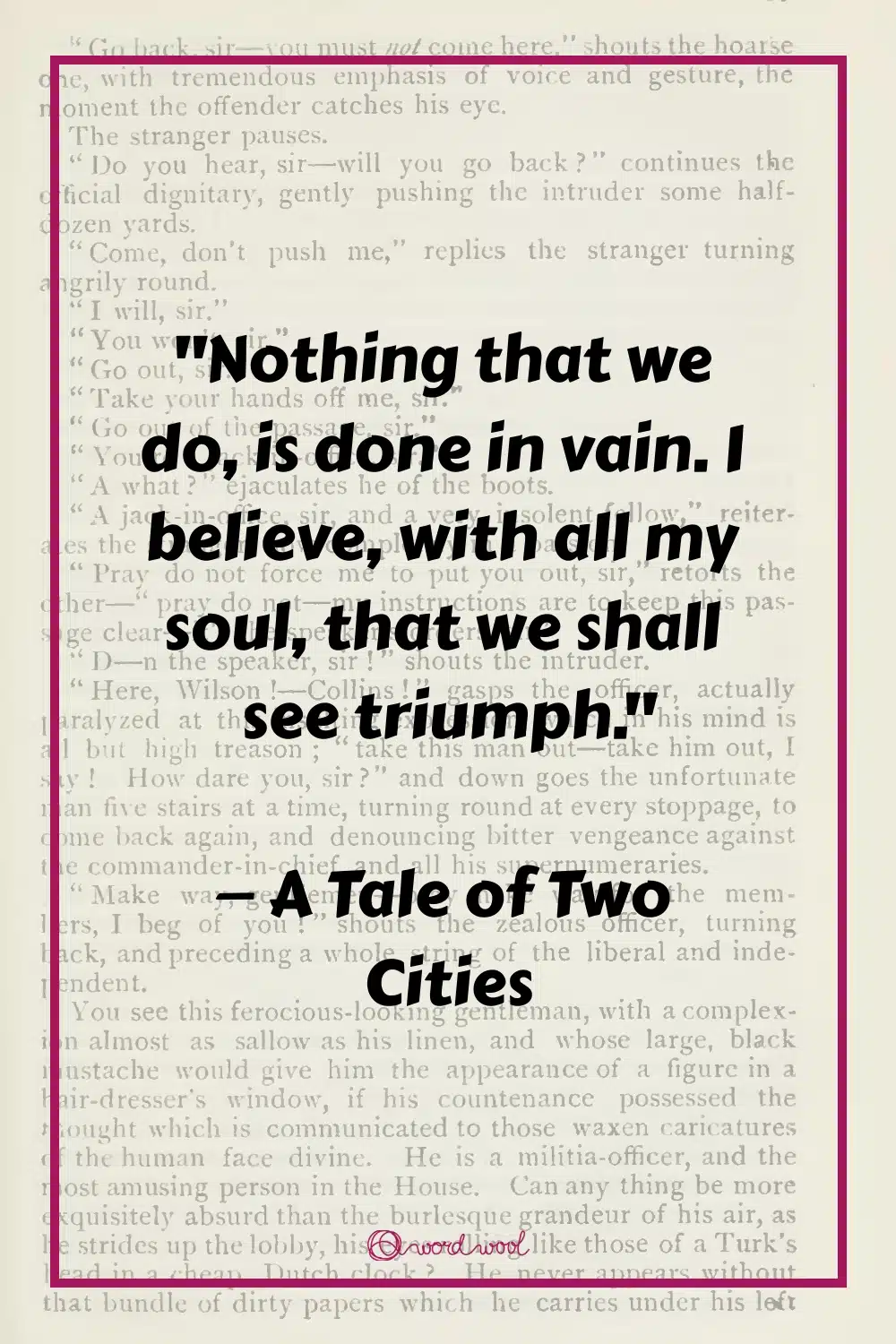
“Nothing that we do, is done in vain. I believe, with all my soul, that we shall see triumph.”
— A Tale of Two Cities
#49
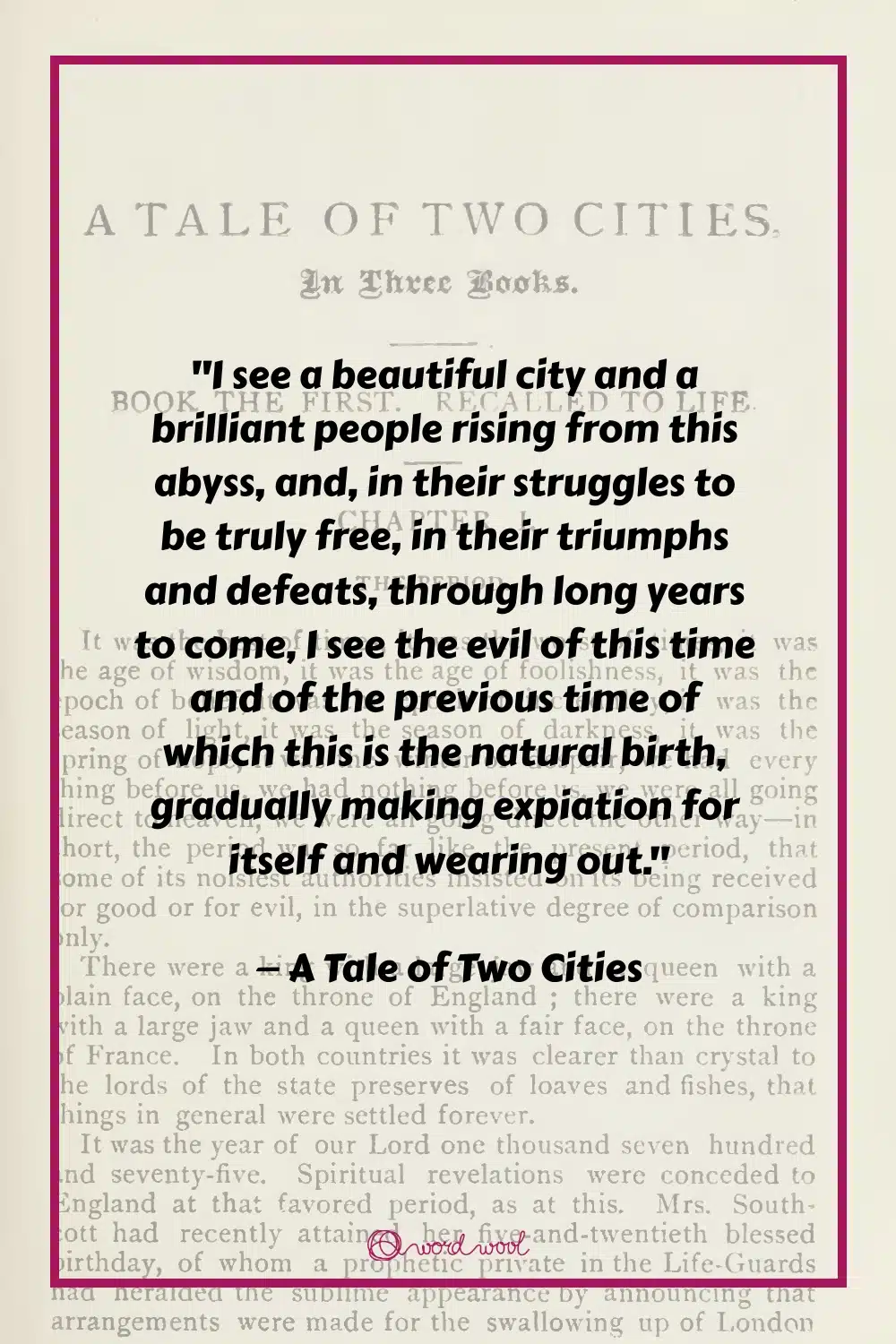
“I see a beautiful city and a brilliant people rising from this abyss, and, in their struggles to be truly free, in their triumphs and defeats, through long years to come, I see the evil of this time and of the previous time of which this is the natural birth, gradually making expiation for itself and wearing out.”
— A Tale of Two Cities
#50
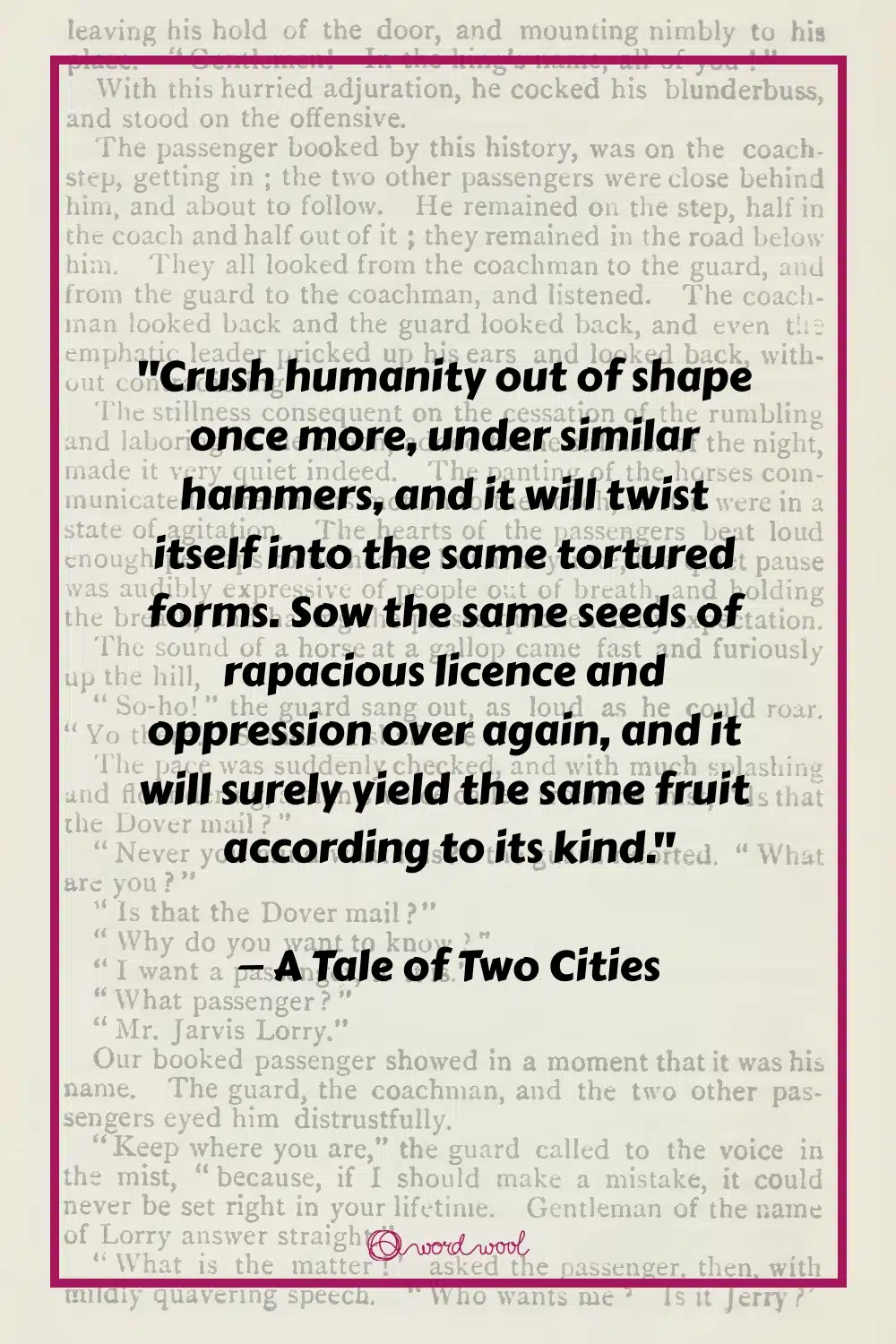
“Crush humanity out of shape once more, under similar hammers, and it will twist itself into the same tortured forms. Sow the same seeds of rapacious licence and oppression over again, and it will surely yield the same fruit according to its kind.”
— A Tale of Two Cities
#51
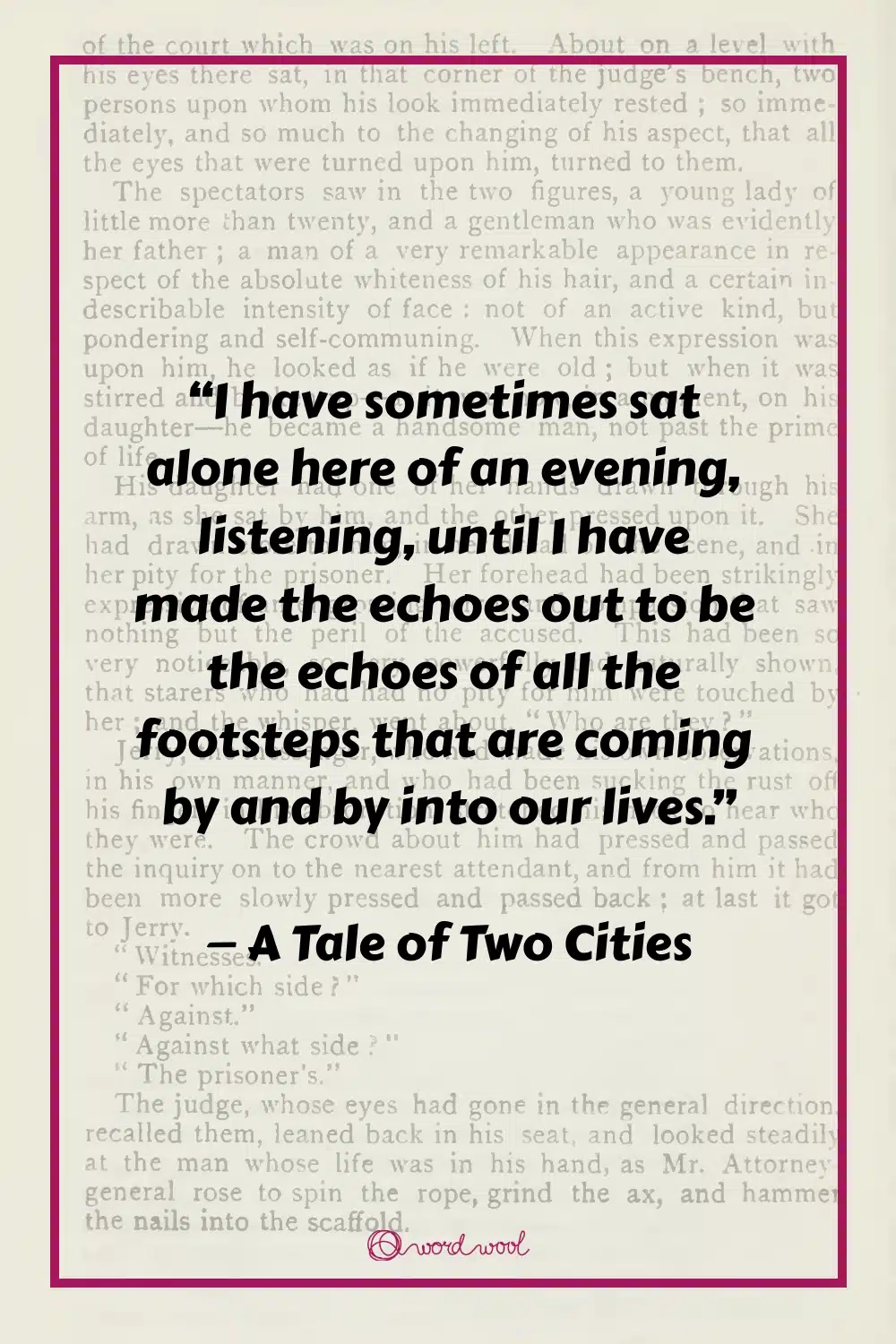
“I have sometimes sat alone here of an evening, listening, until I have made the echoes out to be the echoes of all the footsteps that are coming by and by into our lives.”
— A Tale of Two Cities
#52
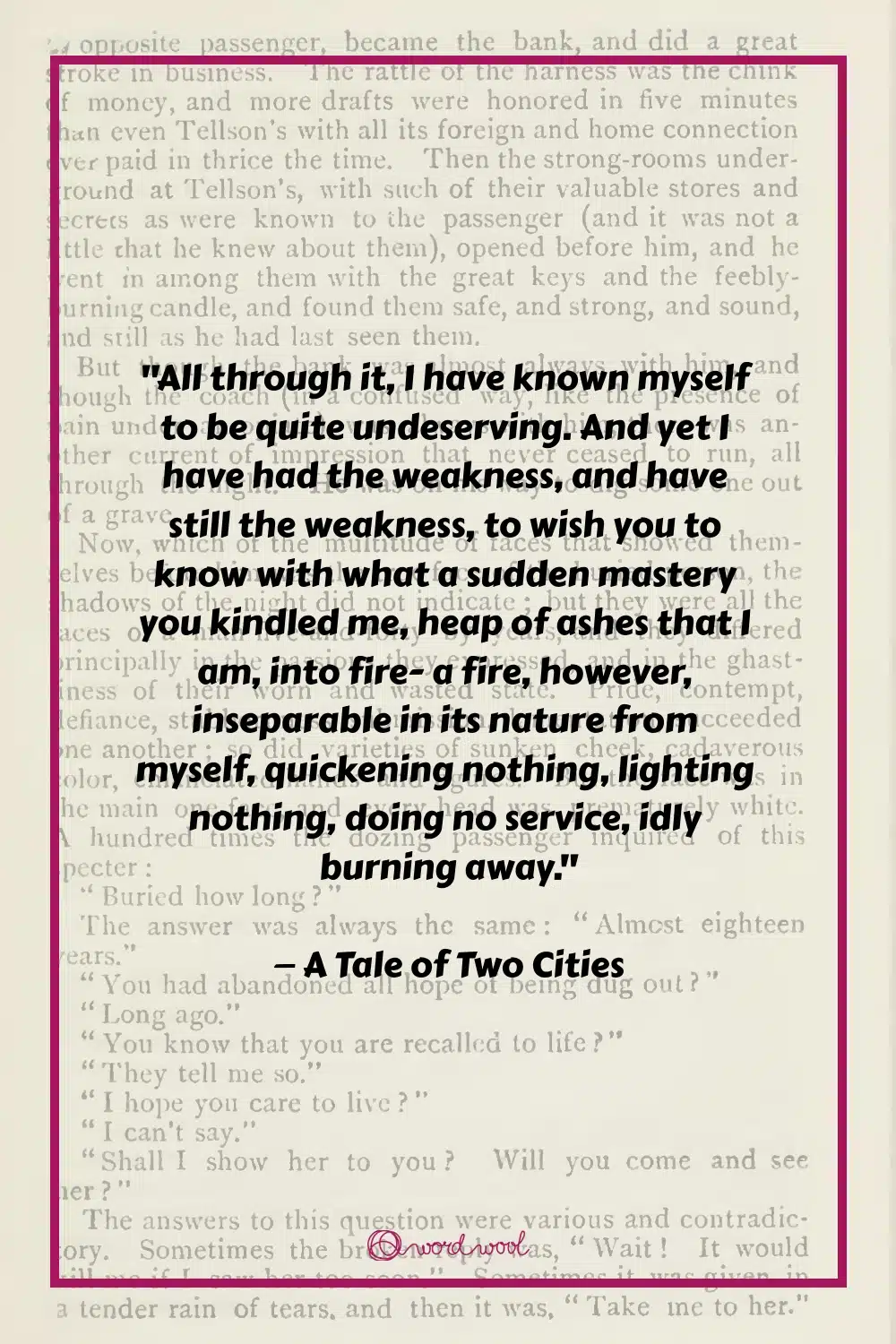
“All through it, I have known myself to be quite undeserving. And yet I have had the weakness, and have still the weakness, to wish you to know with what a sudden mastery you kindled me, heap of ashes that I am, into fire- a fire, however, inseparable in its nature from myself, quickening nothing, lighting nothing, doing no service, idly burning away.”
— A Tale of Two Cities
#53
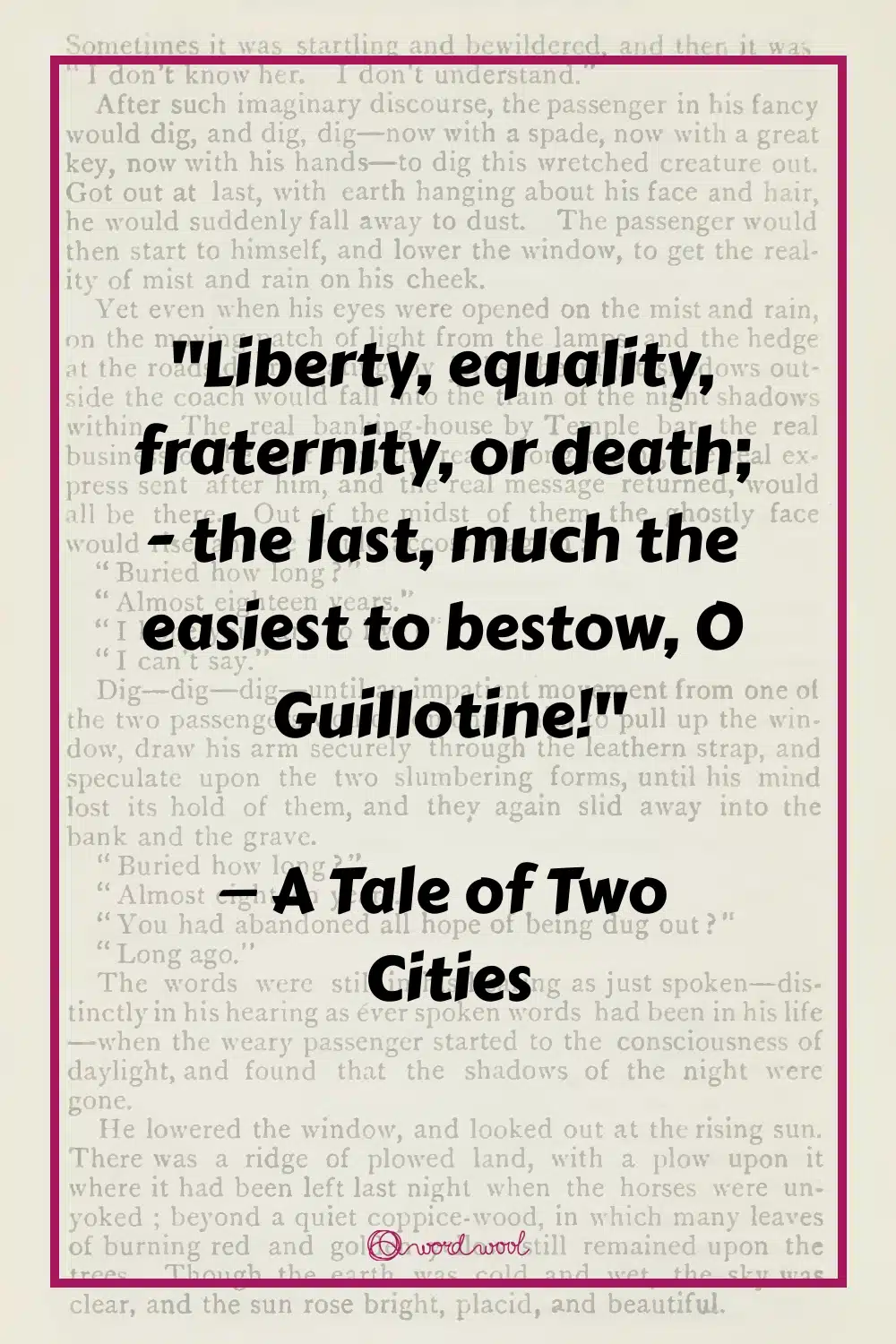
“Liberty, equality, fraternity, or death; – the last, much the easiest to bestow, O Guillotine!”
— A Tale of Two Cities
#54
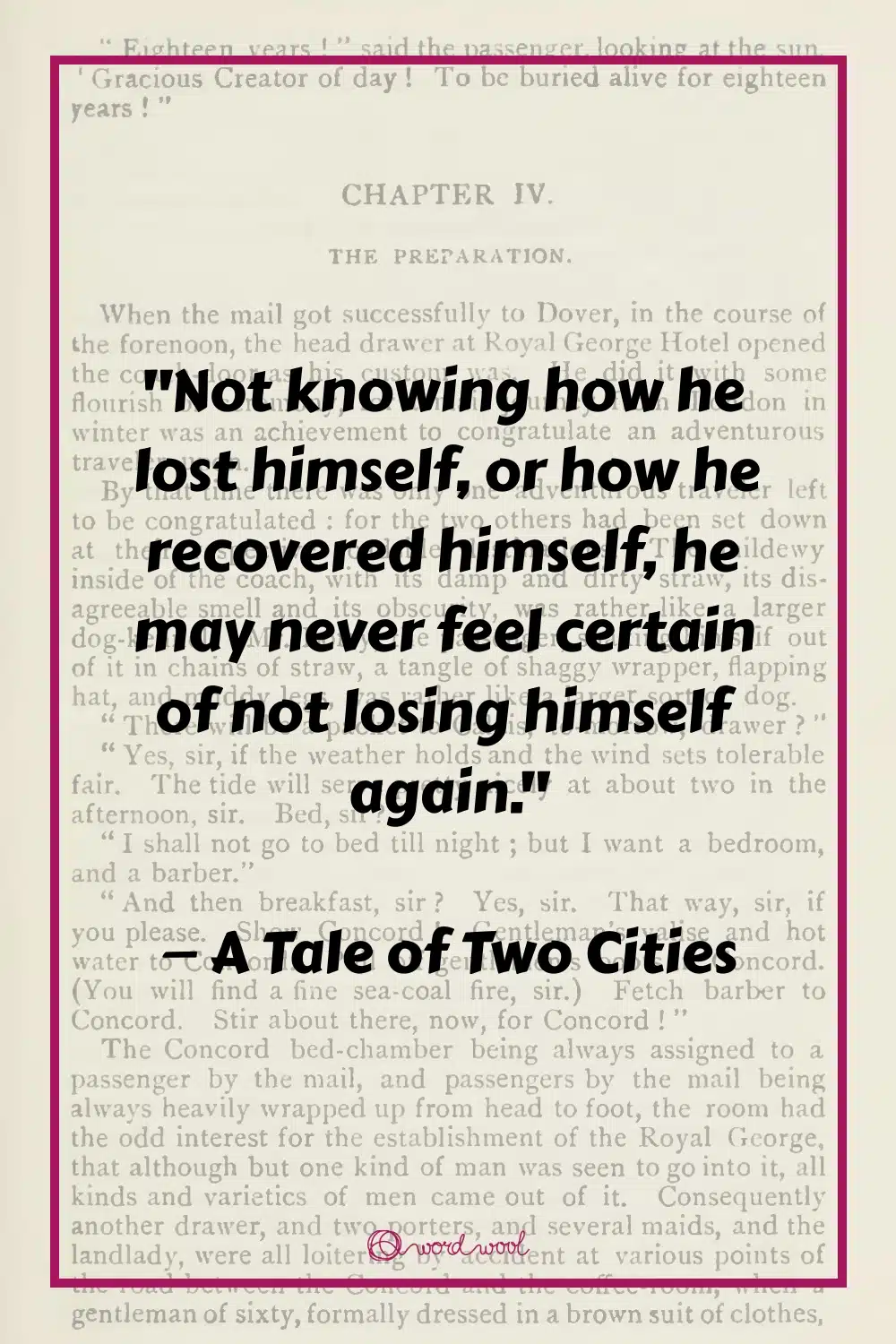
“Not knowing how he lost himself, or how he recovered himself, he may never feel certain of not losing himself again.”
— A Tale of Two Cities
#55
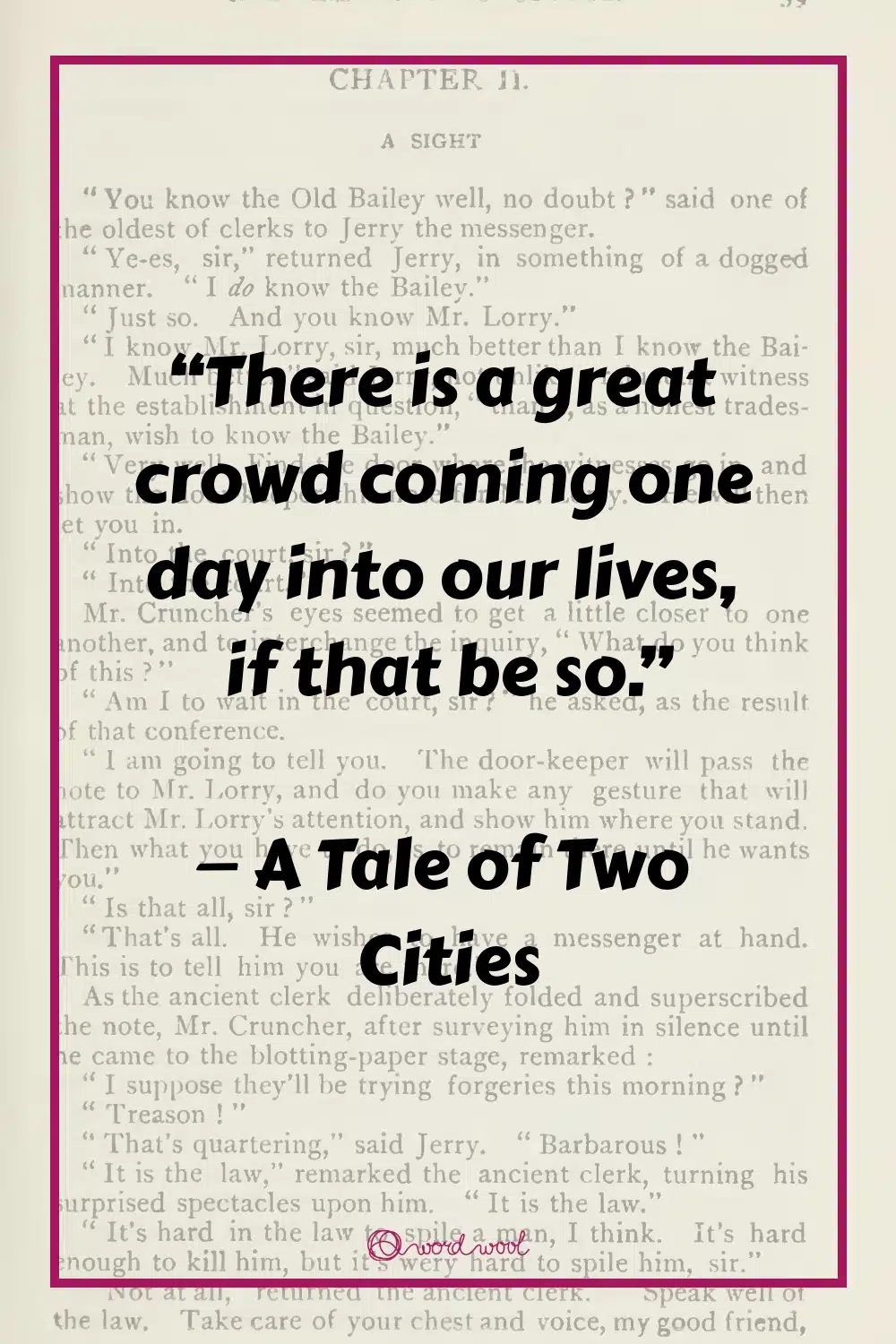
“There is a great crowd coming one day into our lives, if that be so.”
— A Tale of Two Cities
#56
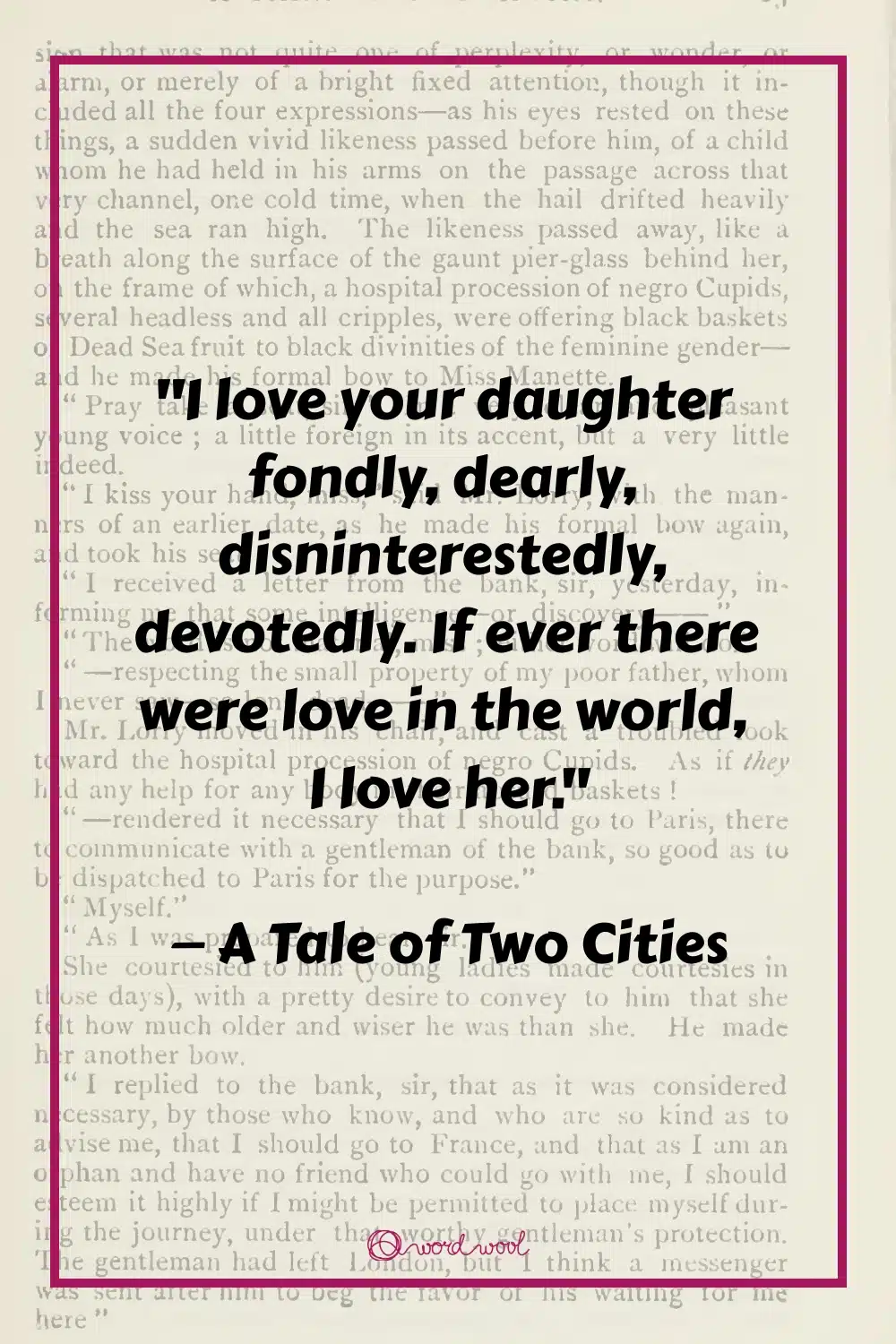
“I love your daughter fondly, dearly, disninterestedly, devotedly. If ever there were love in the world, I love her.”
— A Tale of Two Cities
#57
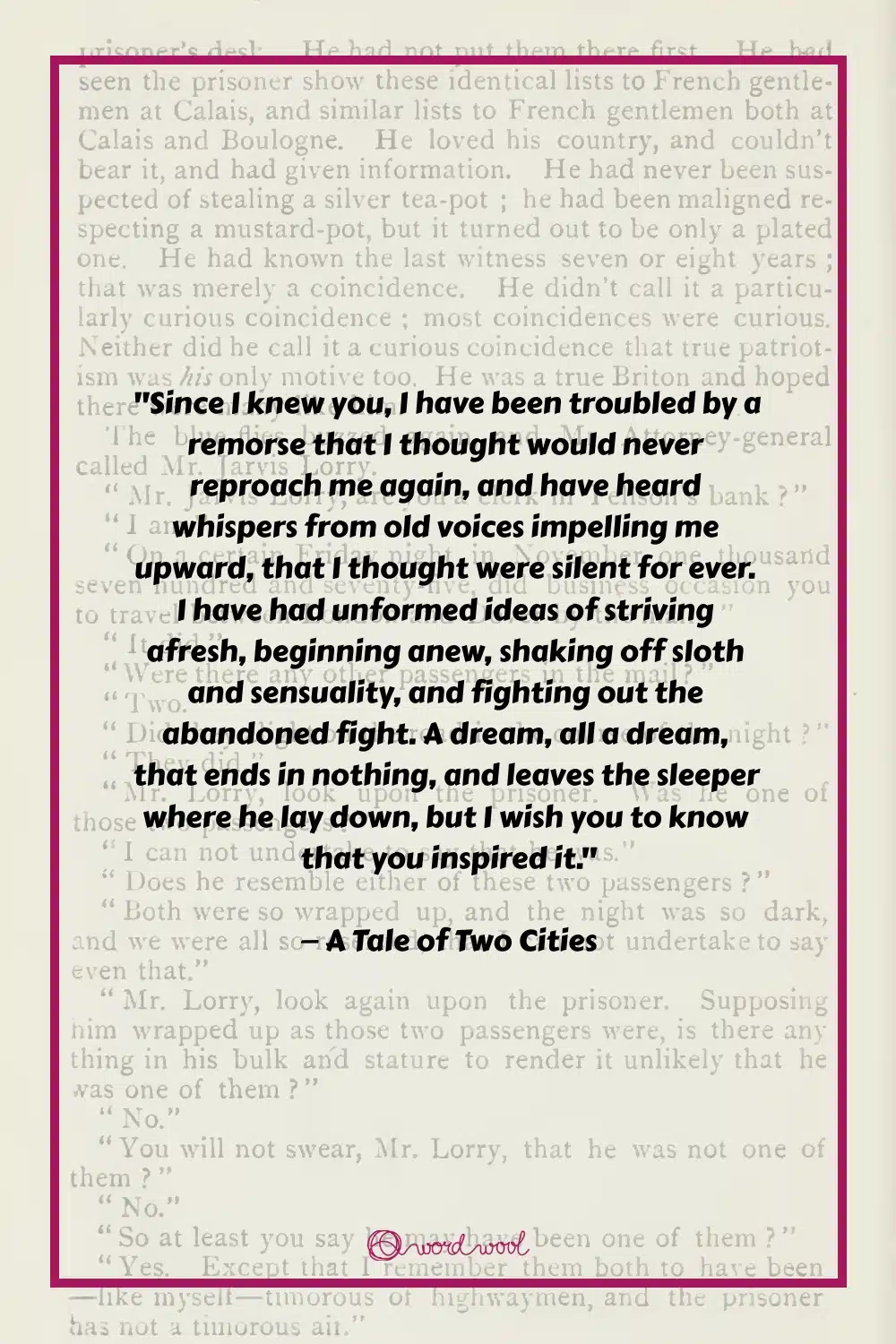
“Since I knew you, I have been troubled by a remorse that I thought would never reproach me again, and have heard whispers from old voices impelling me upward, that I thought were silent for ever. I have had unformed ideas of striving afresh, beginning anew, shaking off sloth and sensuality, and fighting out the abandoned fight. A dream, all a dream, that ends in nothing, and leaves the sleeper where he lay down, but I wish you to know that you inspired it.”
— A Tale of Two Cities
#58
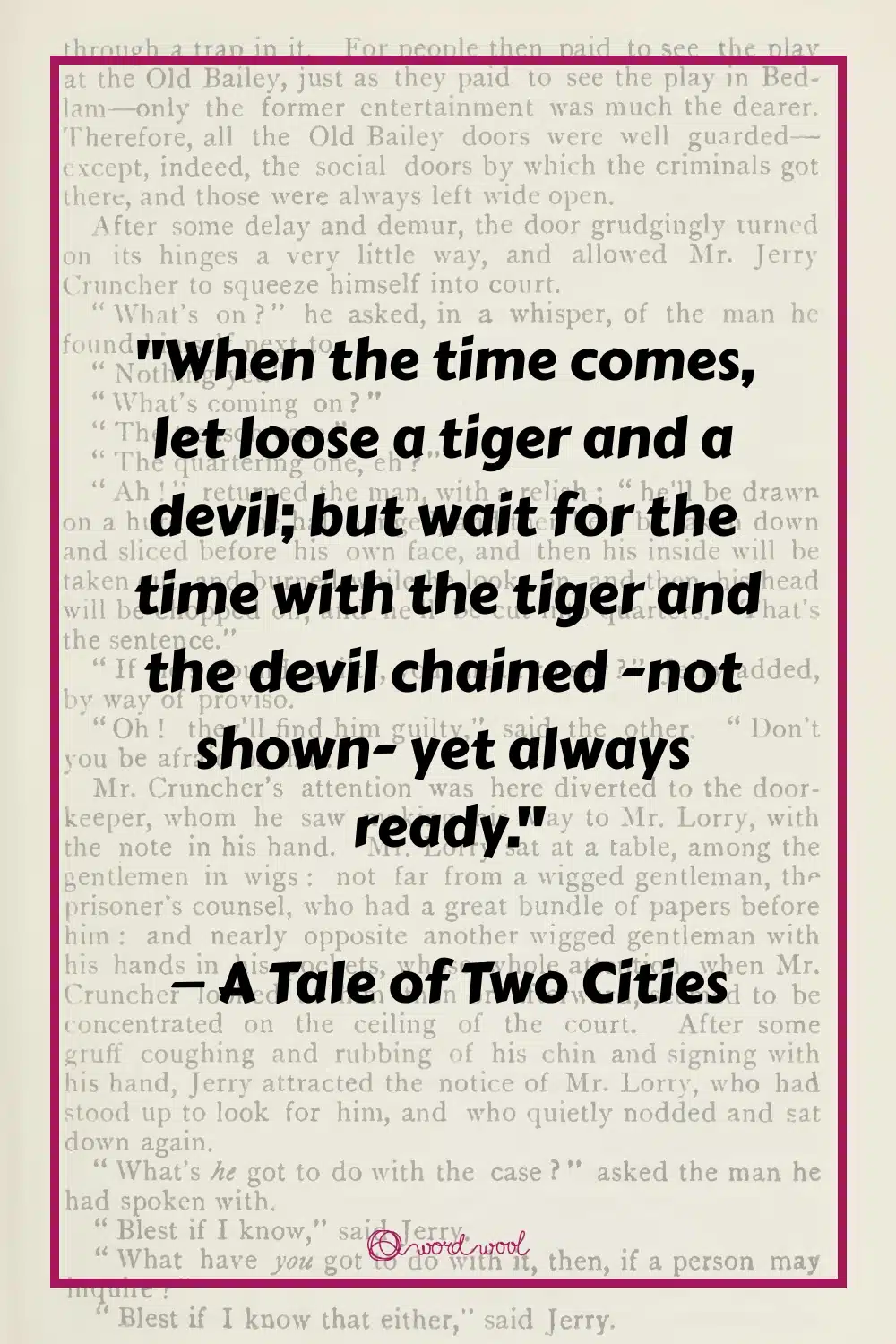
“When the time comes, let loose a tiger and a devil; but wait for the time with the tiger and the devil chained -not shown- yet always ready.”
— A Tale of Two Cities
#59
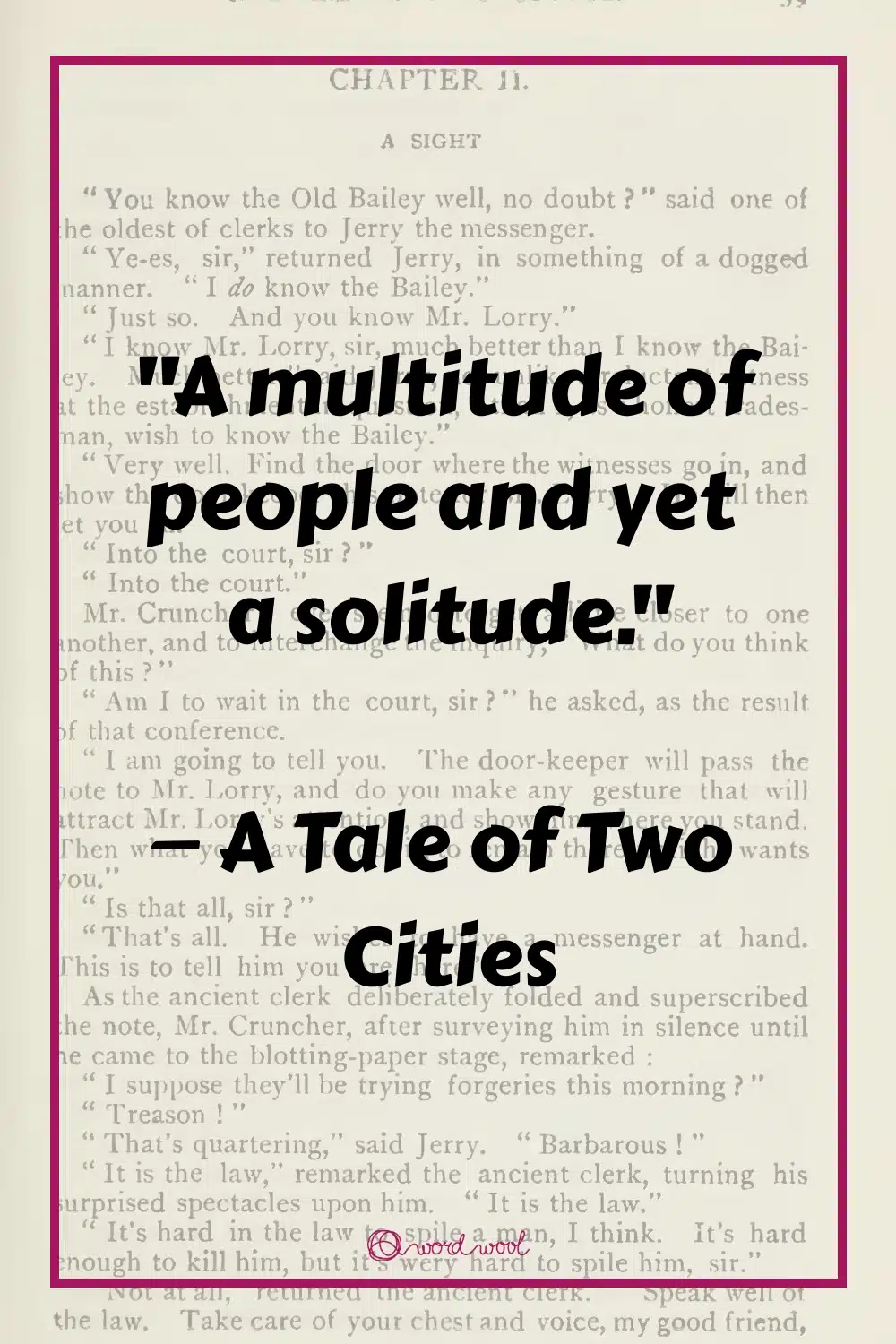
“A multitude of people and yet a solitude.”
— A Tale of Two Cities
#60
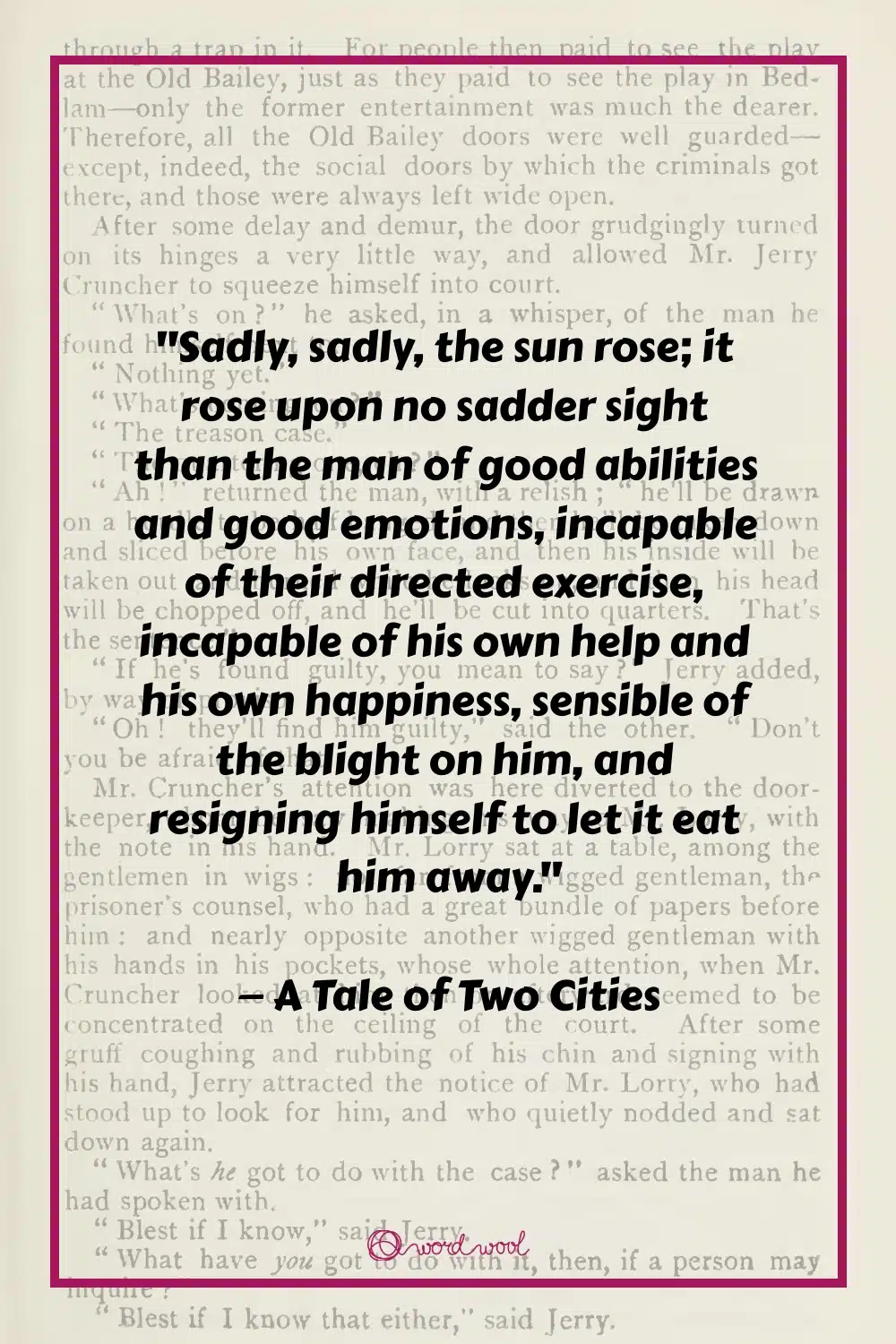
“Sadly, sadly, the sun rose; it rose upon no sadder sight than the man of good abilities and good emotions, incapable of their directed exercise, incapable of his own help and his own happiness, sensible of the blight on him, and resigning himself to let it eat him away.”
— A Tale of Two Cities
#61
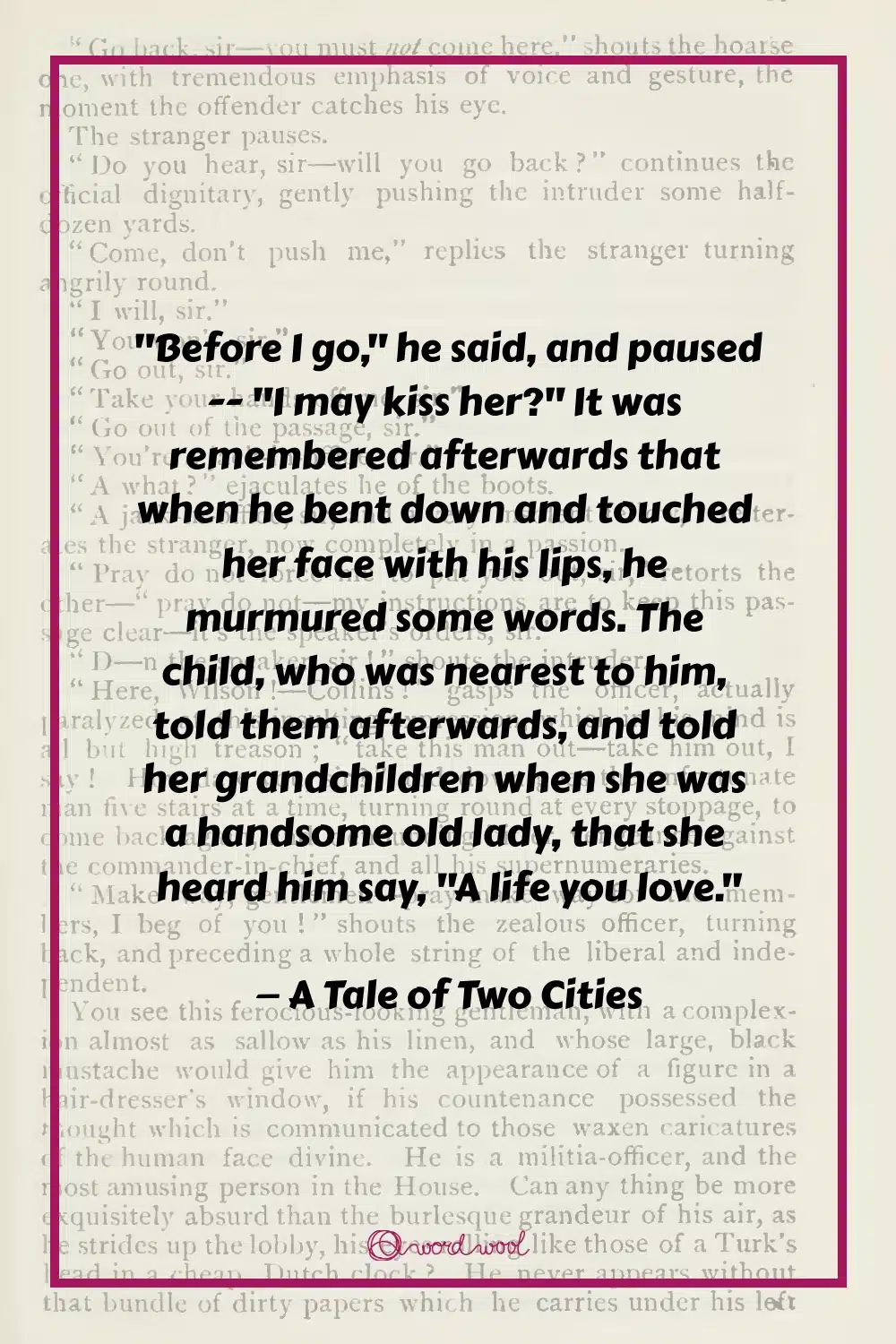
“Before I go,” he said, and paused — “I may kiss her?” It was remembered afterwards that when he bent down and touched her face with his lips, he murmured some words. The child, who was nearest to him, told them afterwards, and told her grandchildren when she was a handsome old lady, that she heard him say, “A life you love.”
— A Tale of Two Cities
#62
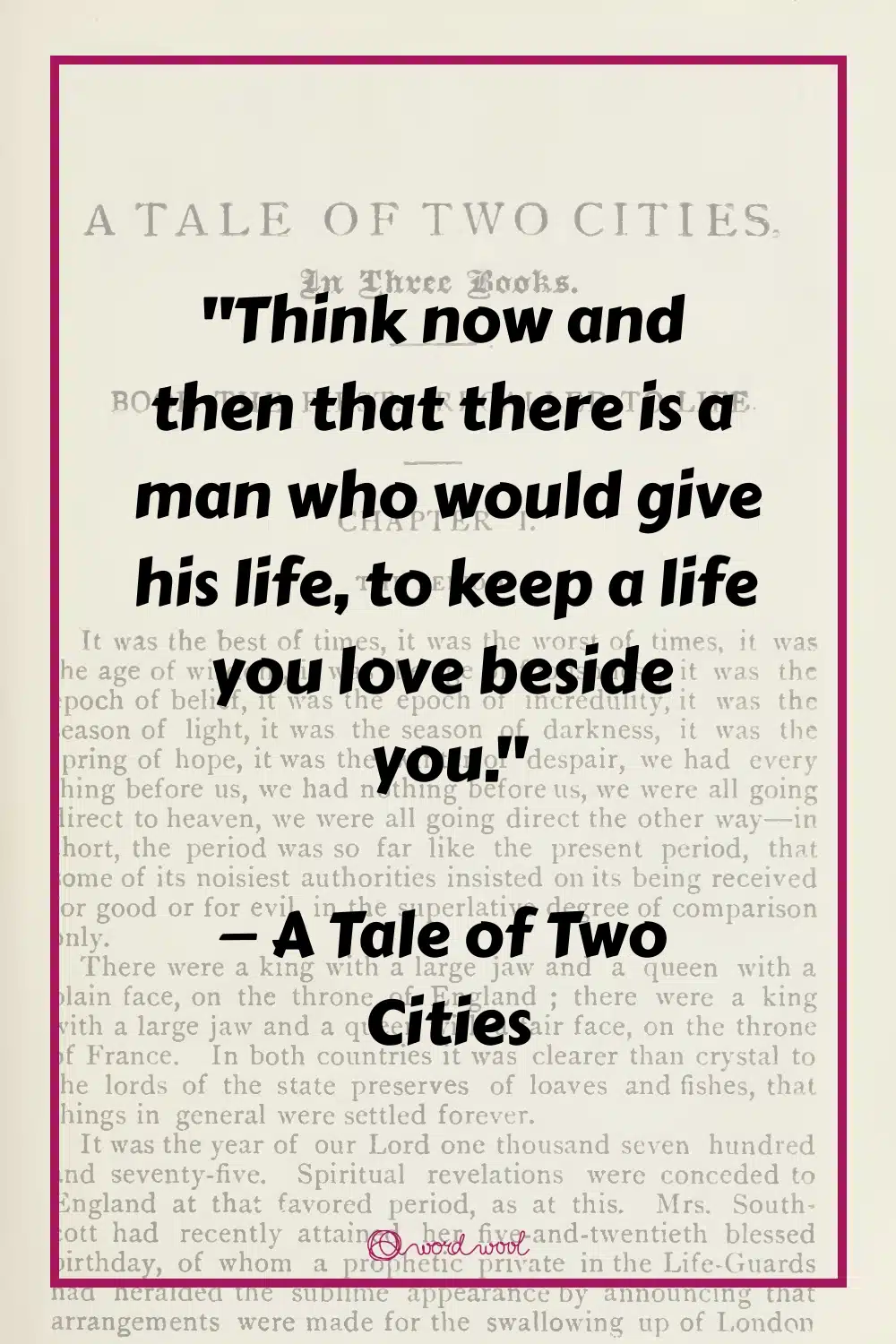
“Think now and then that there is a man who would give his life, to keep a life you love beside you.”
— A Tale of Two Cities
#63
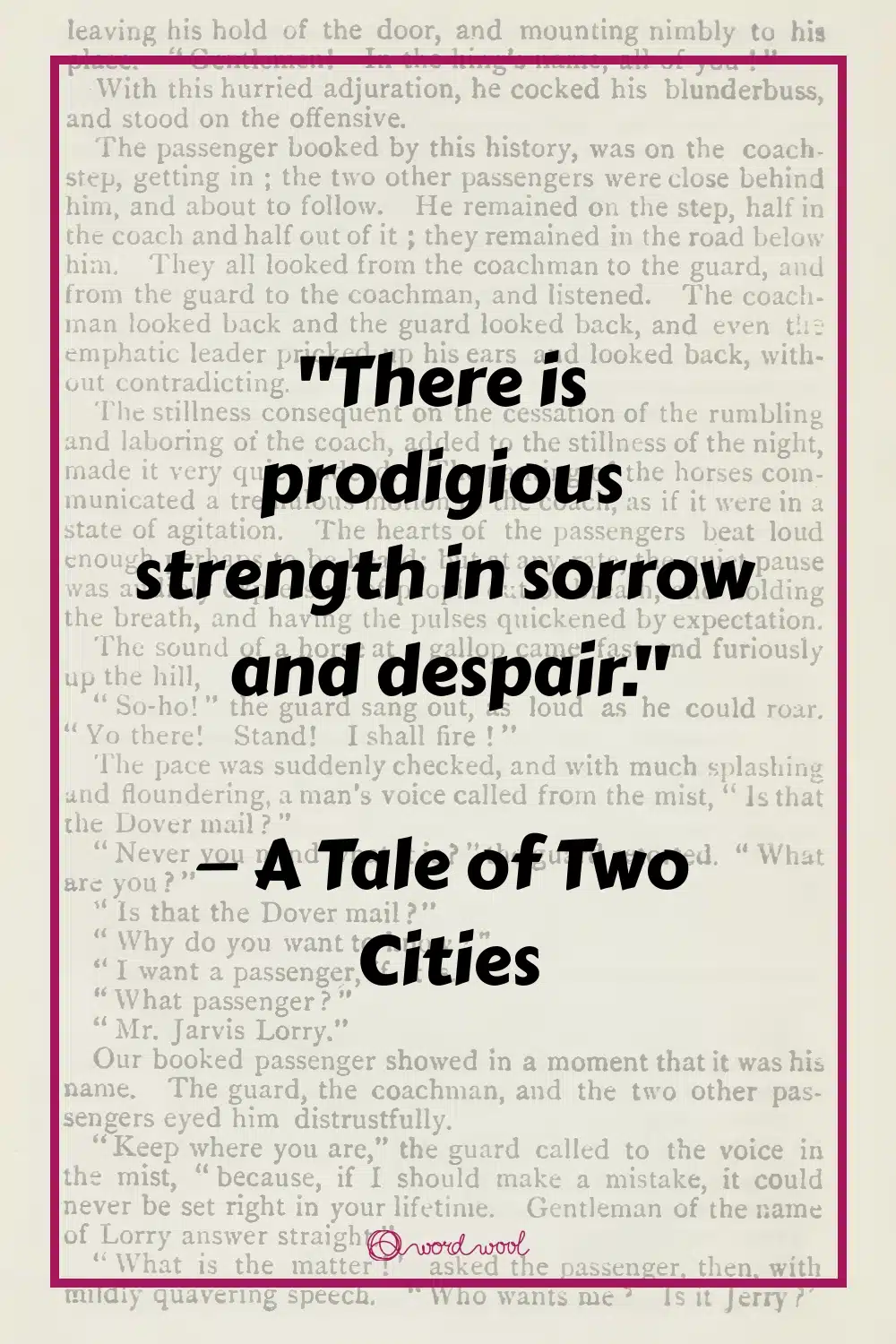
“There is prodigious strength in sorrow and despair.”
— A Tale of Two Cities
#64
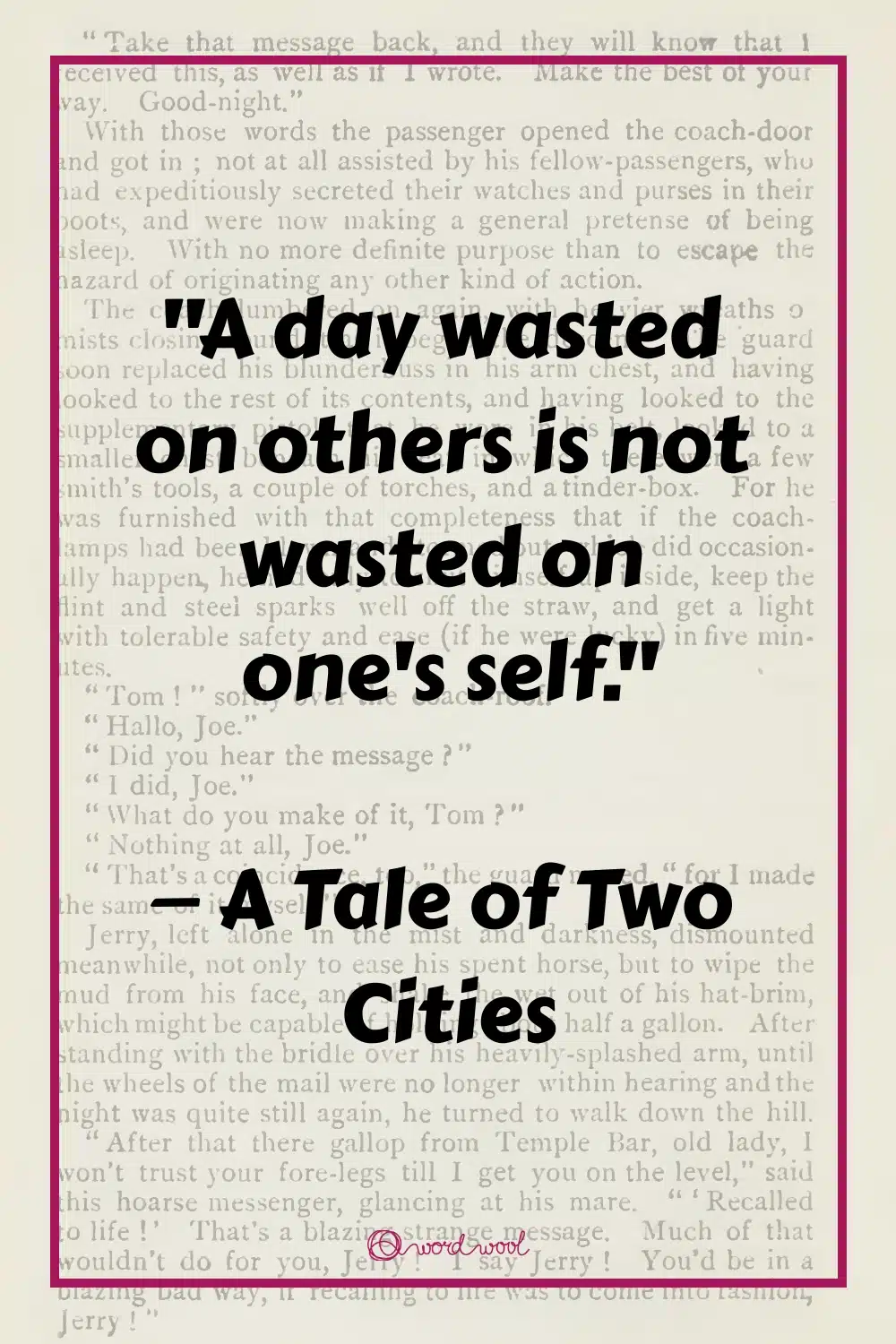
“A day wasted on others is not wasted on one’s self.”
— A Tale of Two Cities
#65
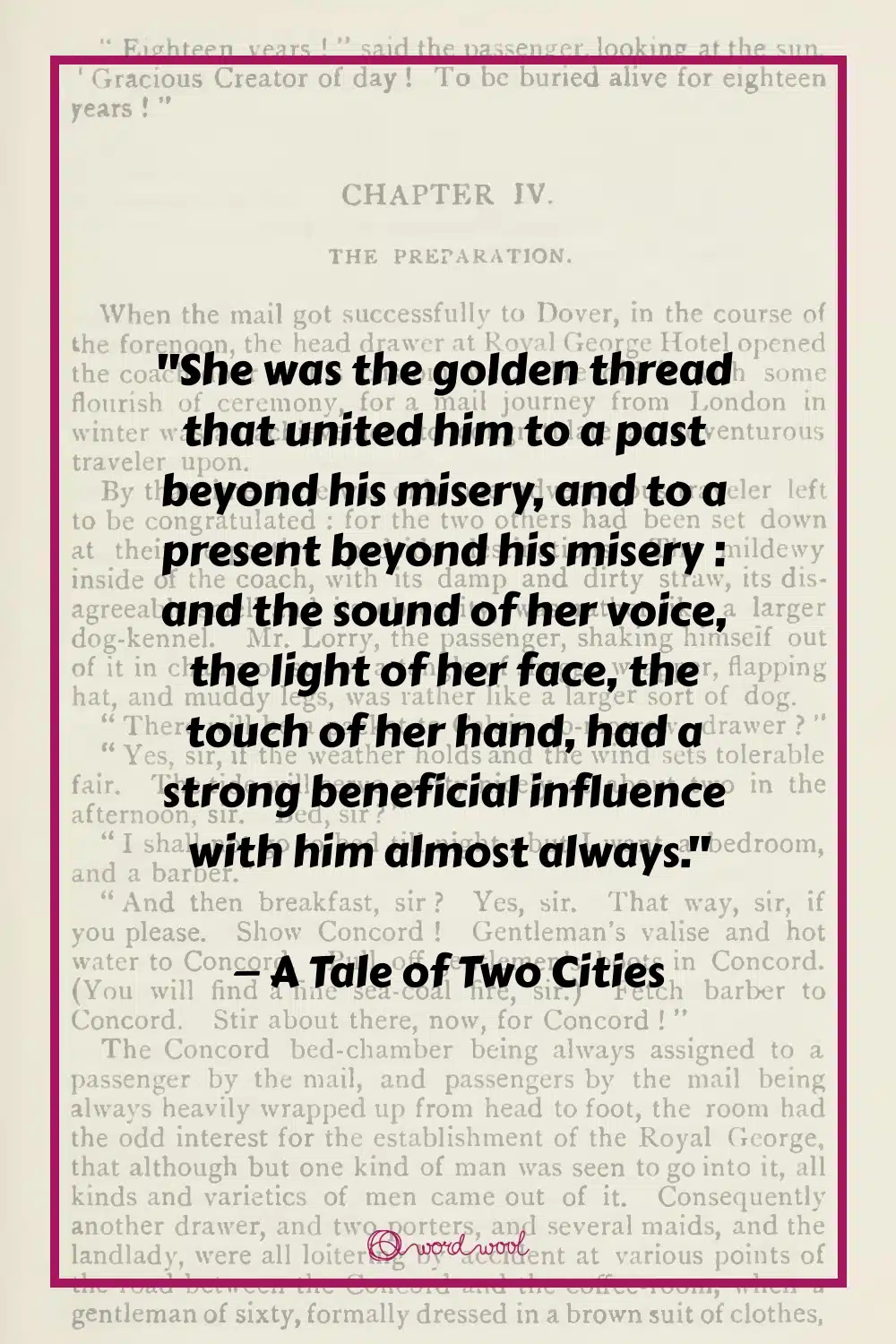
“She was the golden thread that united him to a past beyond his misery, and to a present beyond his misery : and the sound of her voice, the light of her face, the touch of her hand, had a strong beneficial influence with him almost always.”
— A Tale of Two Cities
#66
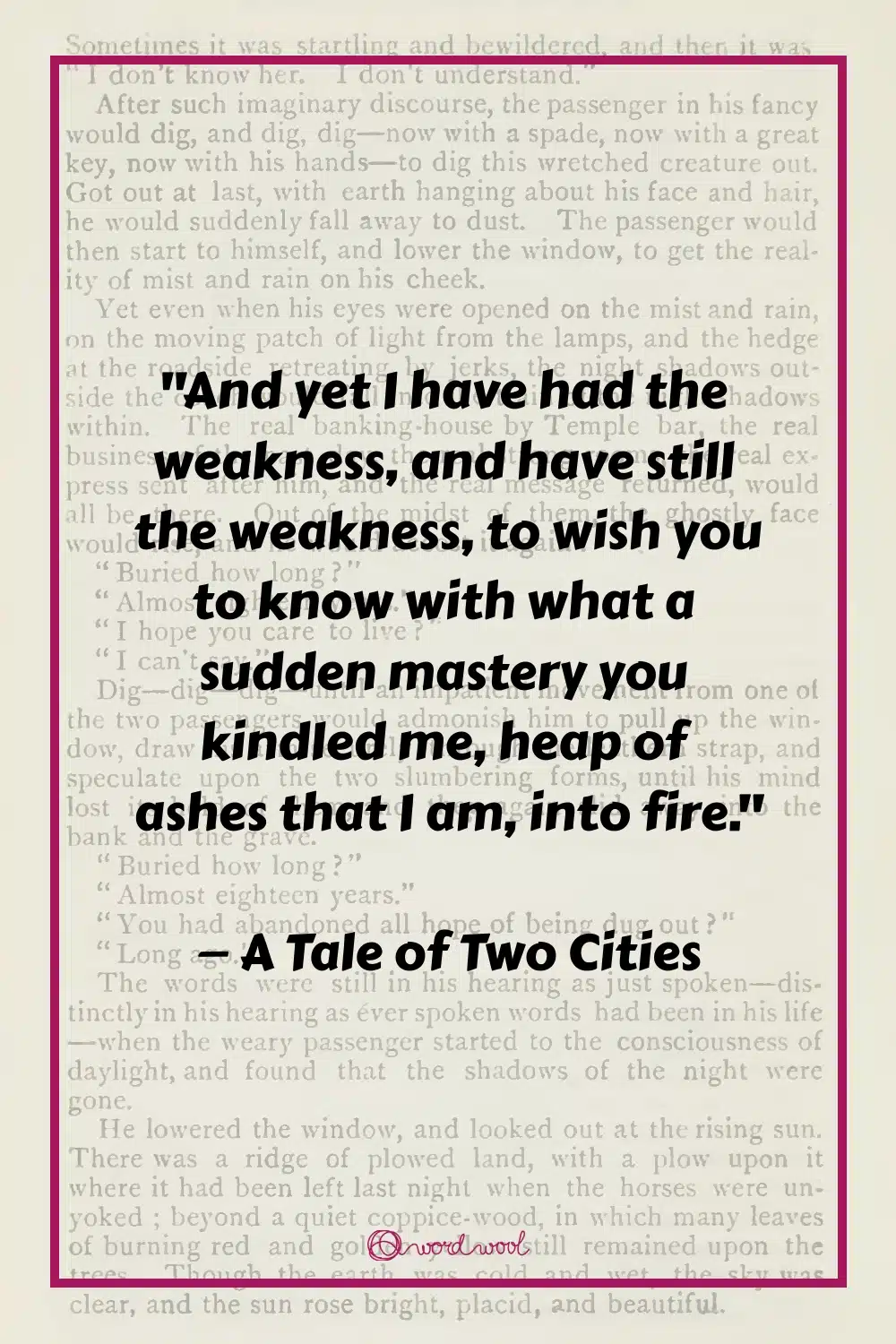
”And yet I have had the weakness, and have still the weakness, to wish you to know with what a sudden mastery you kindled me, heap of ashes that I am, into fire.”
— A Tale of Two Cities
#67
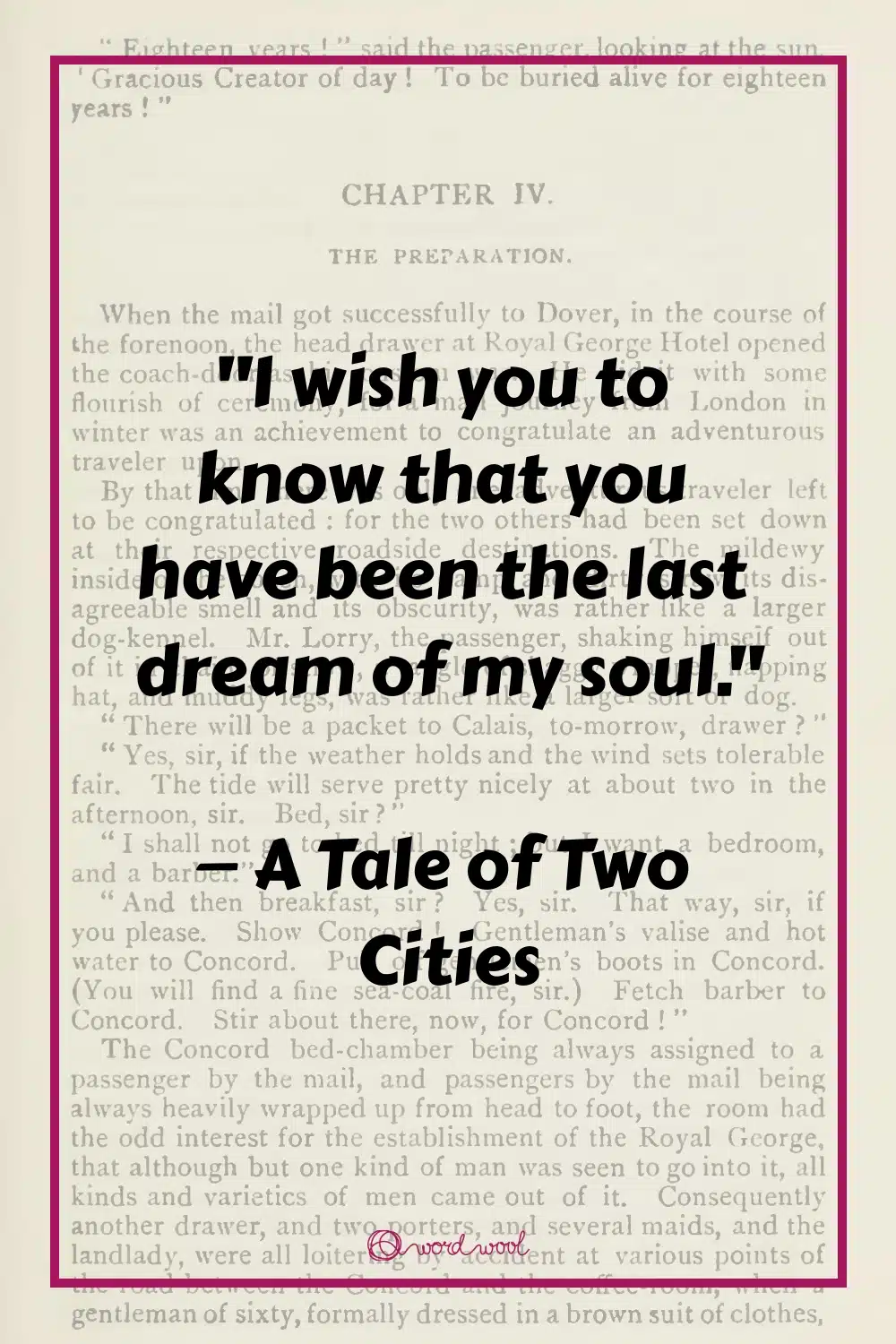
“I wish you to know that you have been the last dream of my soul.”
— A Tale of Two Cities
#68
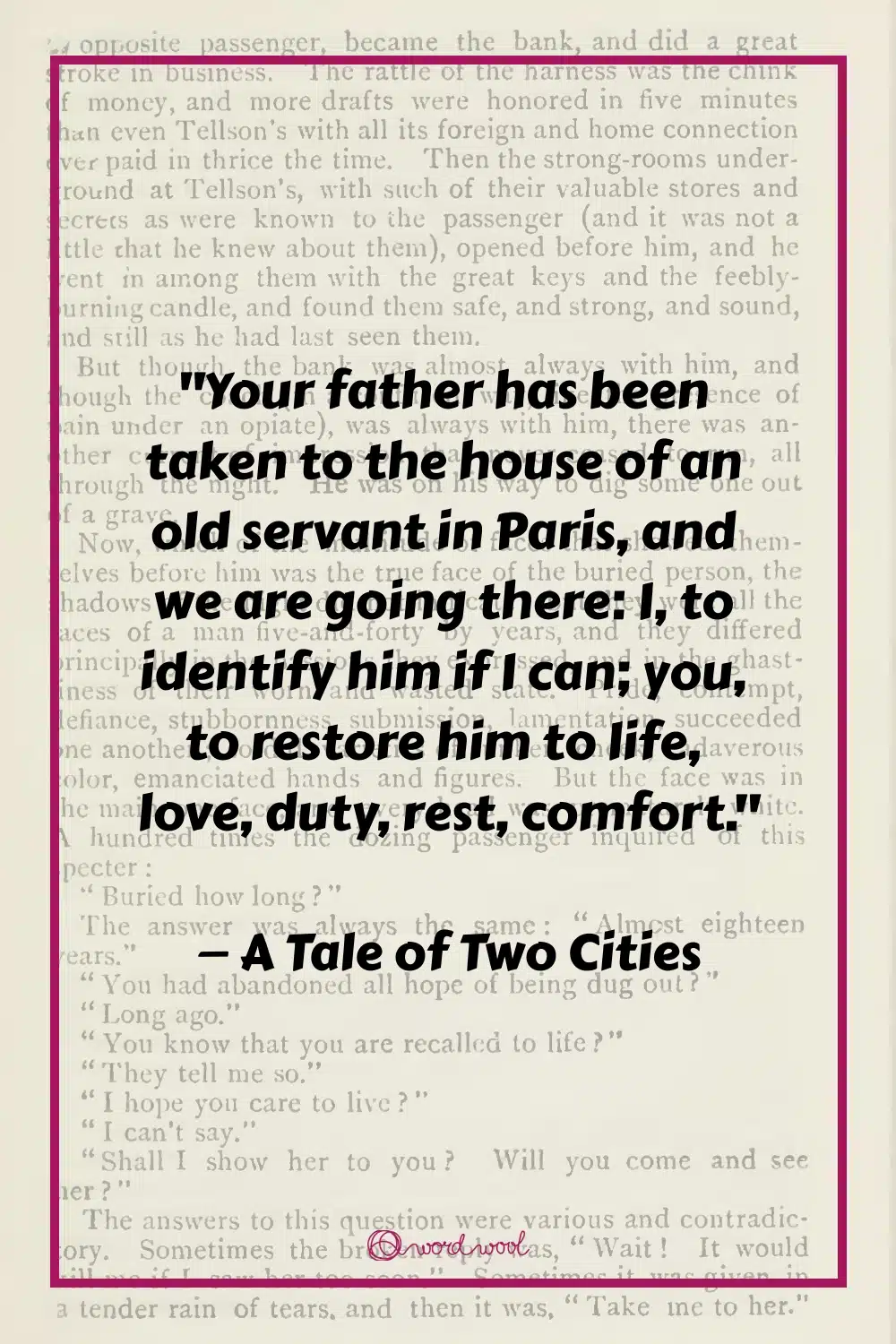
“Your father has been taken to the house of an old servant in Paris, and we are going there: I, to identify him if I can; you, to restore him to life, love, duty, rest, comfort.”
— A Tale of Two Cities
#69
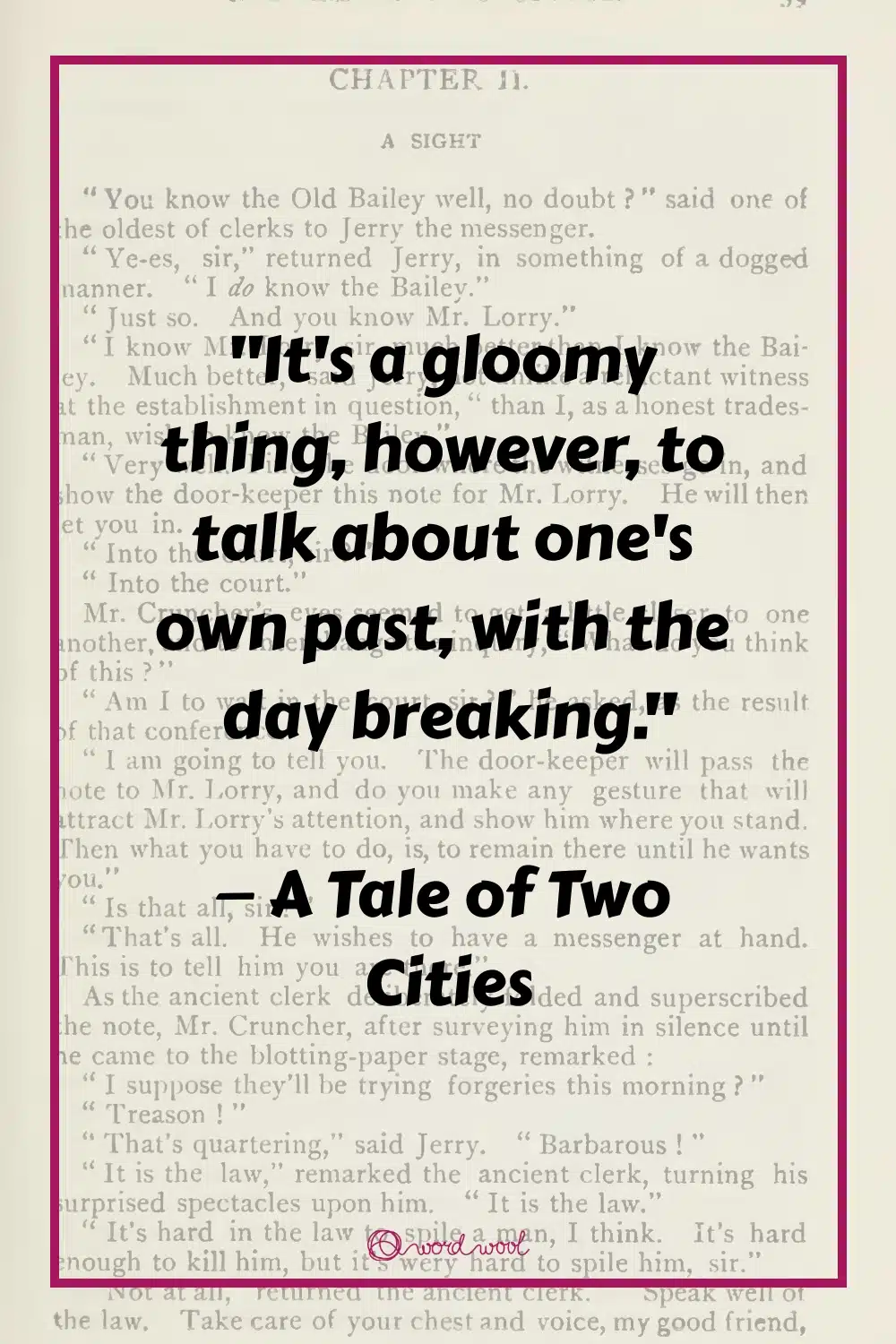
“It’s a gloomy thing, however, to talk about one’s own past, with the day breaking.”
— A Tale of Two Cities
#70
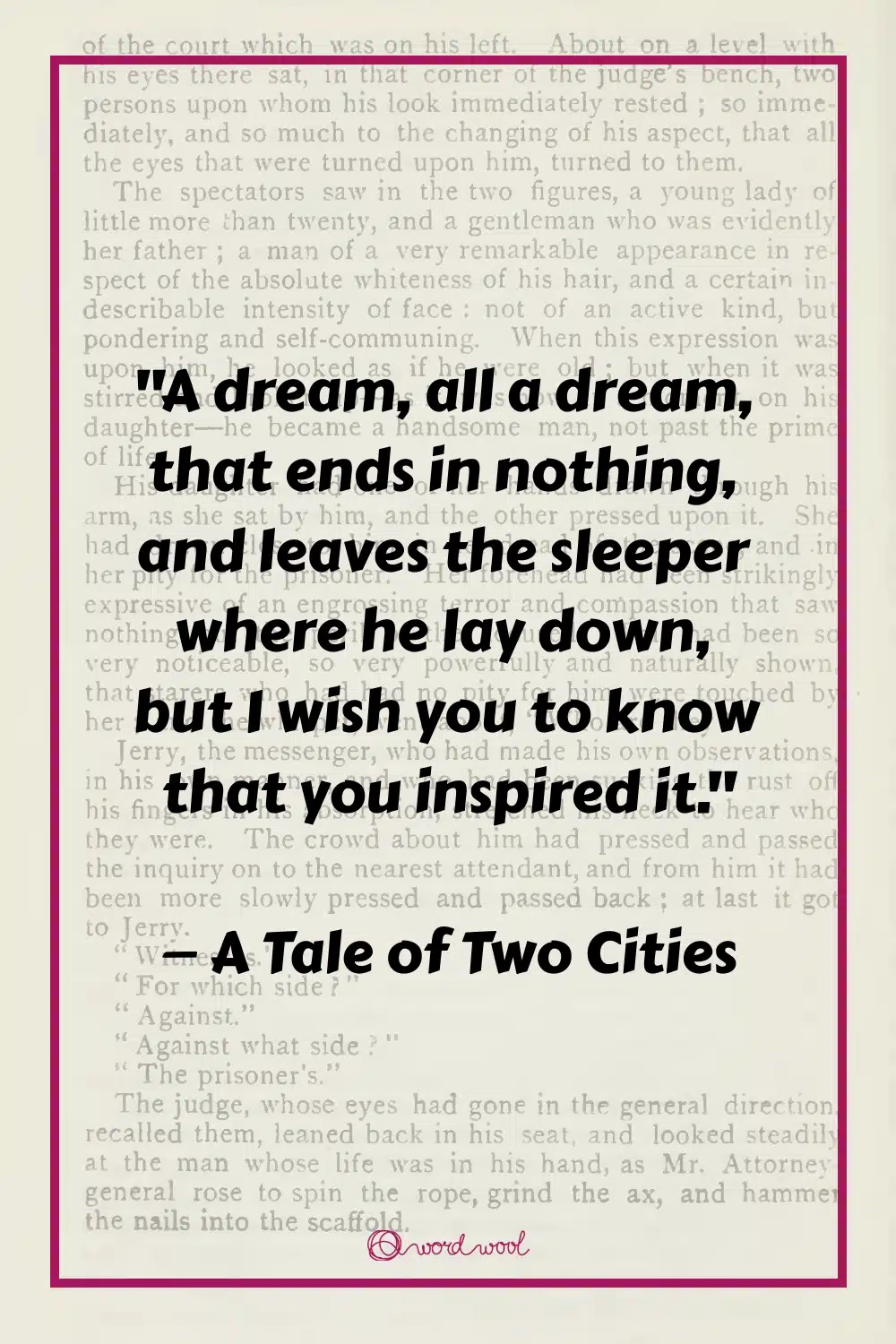
“A dream, all a dream, that ends in nothing, and leaves the sleeper where he lay down, but I wish you to know that you inspired it.”
— A Tale of Two Cities
#71
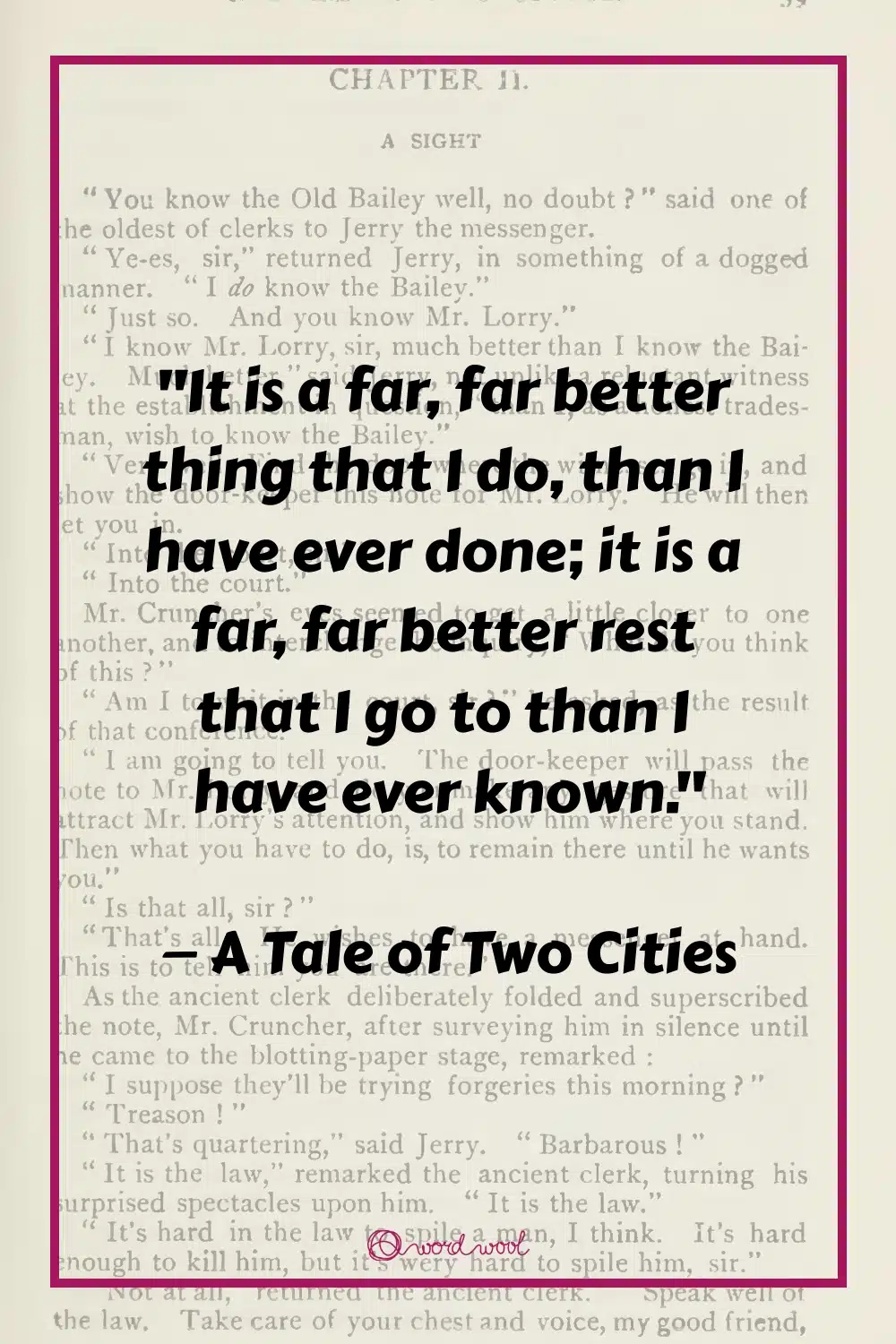
“It is a far, far better thing that I do, than I have ever done; it is a far, far better rest that I go to than I have ever known.”
— A Tale of Two Cities
#72
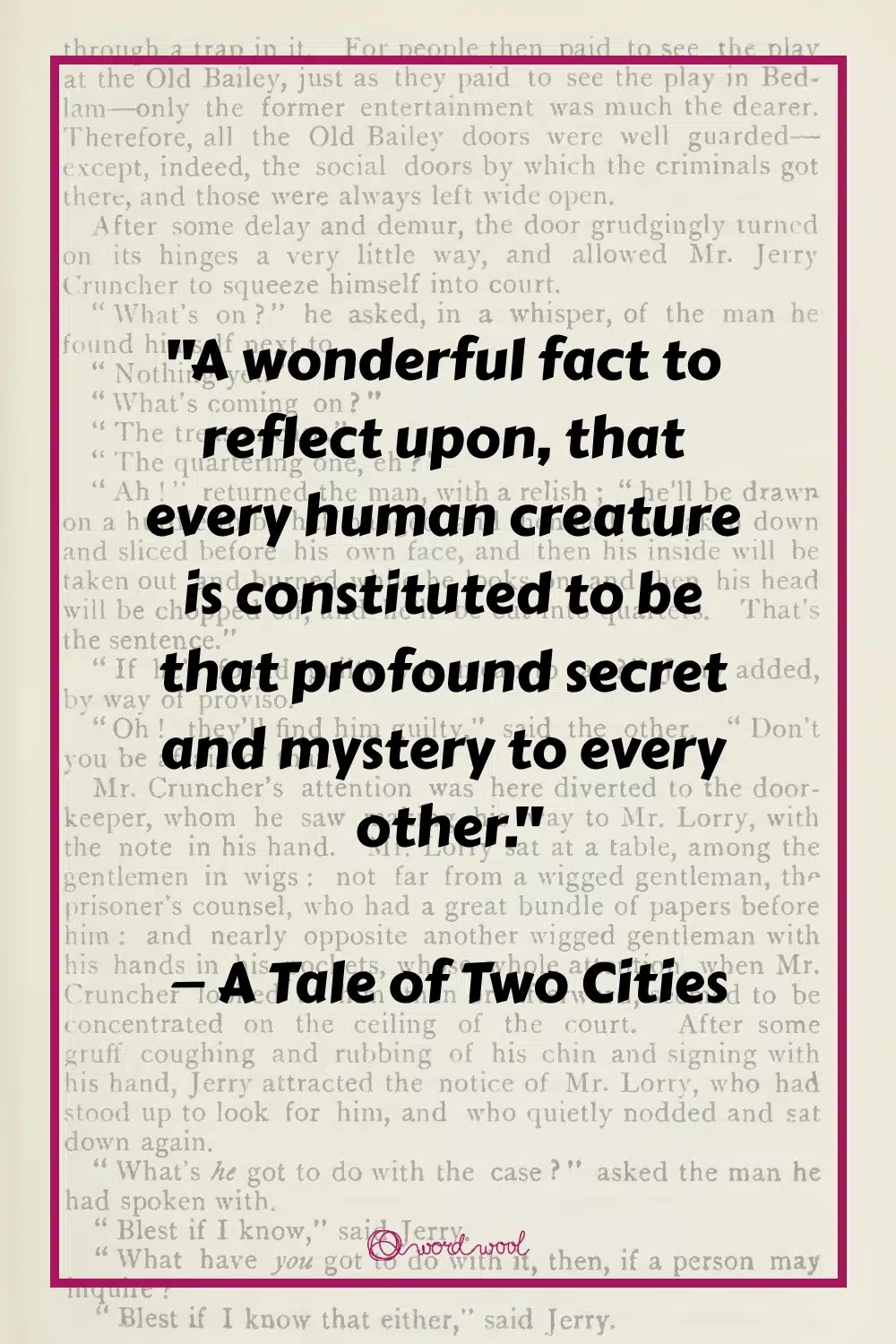
“A wonderful fact to reflect upon, that every human creature is constituted to be that profound secret and mystery to every other.”
— A Tale of Two Cities

